- Discovery Platform
- Innovation Scouting
- Startup Scouting
- Technology Scouting
- Tech Supplier Scouting
- Startup Program
- Trend Intelligence
- Business Intelligence
- All Industries
- Industry 4.0
- Manufacturing
- Case Studies
- Research & Development
- Corporate Strategy
- Corporate Innovation
- Open Innovation
- New Business Development
- Product Development
- Agriculture
- Construction
- Sustainability
- All Startups
- Circularity
- All Innovation
- Business Trends
- Emerging Tech
- Innovation Intelligence
- New Companies
- Scouting Trends
- Startup Programs
- Supplier Scouting
- Tech Scouting
- Top AI Tools
- Trend Tracking
- All Reports [PDF]
- Circular Economy
- Engineering
- Oil & Gas


Share this:
- Click to share on Facebook (Opens in new window)
- Click to share on Twitter (Opens in new window)
- Click to share on LinkedIn (Opens in new window)
Top 9 Travel Trends & Innovations in 2024
How are the latest trends in the travel industry reshaping trip planning and enhancing tourist experiences in 2024? Explore our in-depth industry research on the top 9 travel trends based on our analysis of 3500+ companies worldwide. These trends include AI, immersive tourism, IoT, contactless travel & more!
Technological advancements in the travel industry meet the growing demand for personalized experiences, safety, and sustainability. Post the COVID-19 pandemic, emerging travel trends mark a shift towards contactless travel through digital payments, self-check-ins, and more. Additionally, artificial intelligence (AI), the Internet of Things (IoT), and blockchain are automating various hospitality and travel-related operations.
For instance, smart hotels make use of internet-connected devices to remotely control rooms. Further, businesses offer virtual tours by adopting extended reality (XR) technologies like virtual reality (VR) and augmented reality (AR). Travel companies also leverage data analytics to personalize marketing. At the same time, traveler assisting solutions like chatbots and voice technology aid them in booking accommodation and optimizing journeys. These travel trends improve the overall profitability of the tourism industry and enable it to make operations more sustainable and safe.
This article was published in July 2022 and updated in February 2024.
Innovation Map outlines the Top 9 Travel Trends & 18 Promising Startups
For this in-depth research on the Top 9 Trends & Startups, we analyzed a sample of 18 global startups and scaleups. The result of this research is data-driven innovation intelligence that improves strategic decision-making by giving you an overview of emerging technologies & startups in the travel industry. These insights are derived by working with our Big Data & Artificial Intelligence-powered StartUs Insights Discovery Platform , covering 2 500 000+ startups & scaleups globally. As the world’s largest resource for data on emerging companies, the SaaS platform enables you to identify relevant startups, emerging technologies & future industry trends quickly & exhaustively.
In the Innovation Map below, you get an overview of the Top 9 Travel Trends & Innovations that impact travel & tourism companies worldwide. Moreover, the Travel Innovation Map reveals 3 500+ hand-picked startups, all working on emerging technologies that advance their field.
Top 9 Travel Trends
- Artificial Intelligence
- Immersive Tourism
- Internet of Things
- Contactless Travel
- Big Data & Analytics
- Post-Pandemic Tourism
- Tour Premiumization
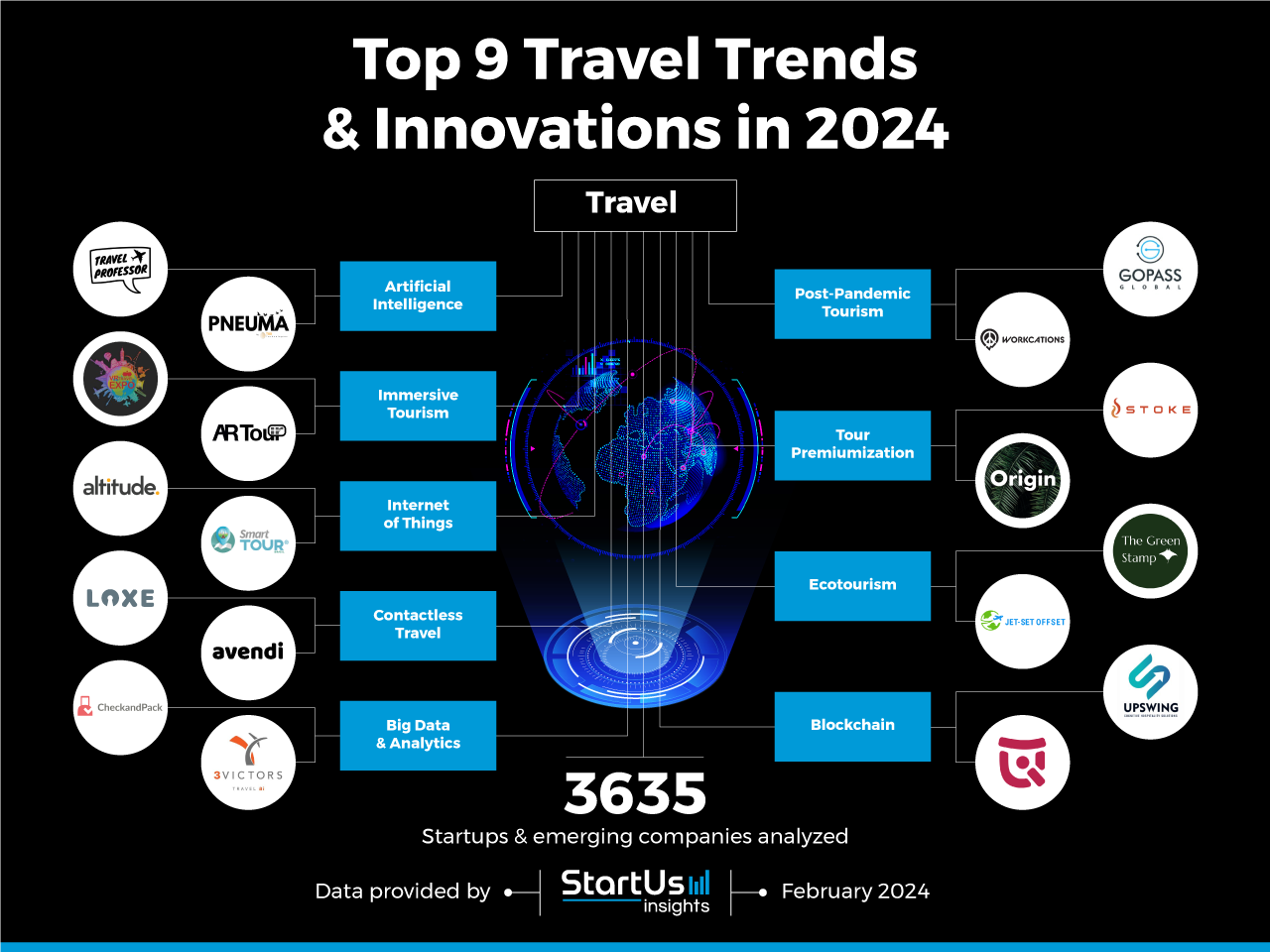
Click to download
Tree Map reveals the Impact of the Top 9 Travel Trends
Based on the Travel Innovation Map, the Tree Map below illustrates the impact of the Top 9 Travel Industry Trends in 2024. Startups and scaleups are enabling contactless travel using technologies like biometrics, radio-frequency identification (RFID), and near-field communication (NFC). This is due to increasing health and hygiene concerns post the pandemic. The use of AI in tourism ensures hassle-free trip planning while AR and VR allow tourists to virtually visit various locations and excursions. IoT increases visibility into tourism industry operations and allows passengers to track their luggage more efficiently. Further, the demand for personalized and luxurious travel is rising. Several startups enable recreational space travel as well as offer sustainable travel options to passengers.
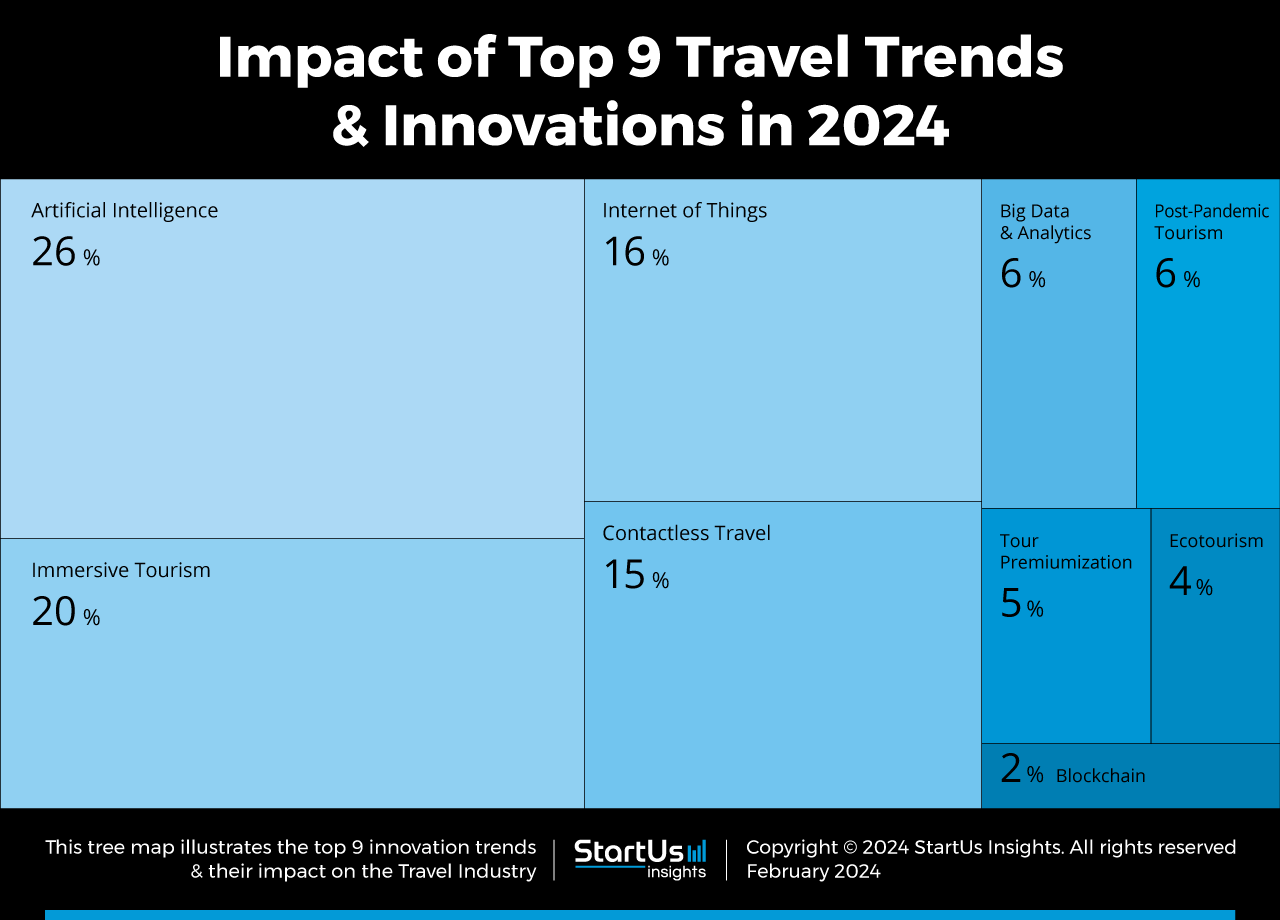
Global Startup Heat Map covers 3 635 Travel Startups & Scaleups
The Global Startup Heat Map below highlights the global distribution of the 3 635 exemplary startups & scaleups that we analyzed for this research. Created through the StartUs Insights Discovery Platform, the Heat Map reveals that the US, Europe, and India see the most activity.
Below, you get to meet 18 out of these 3 635 promising startups & scaleups as well as the solutions they develop. These 18 startups are hand-picked based on criteria such as founding year, location, funding raised, and more. Depending on your specific needs, your top picks might look entirely different.
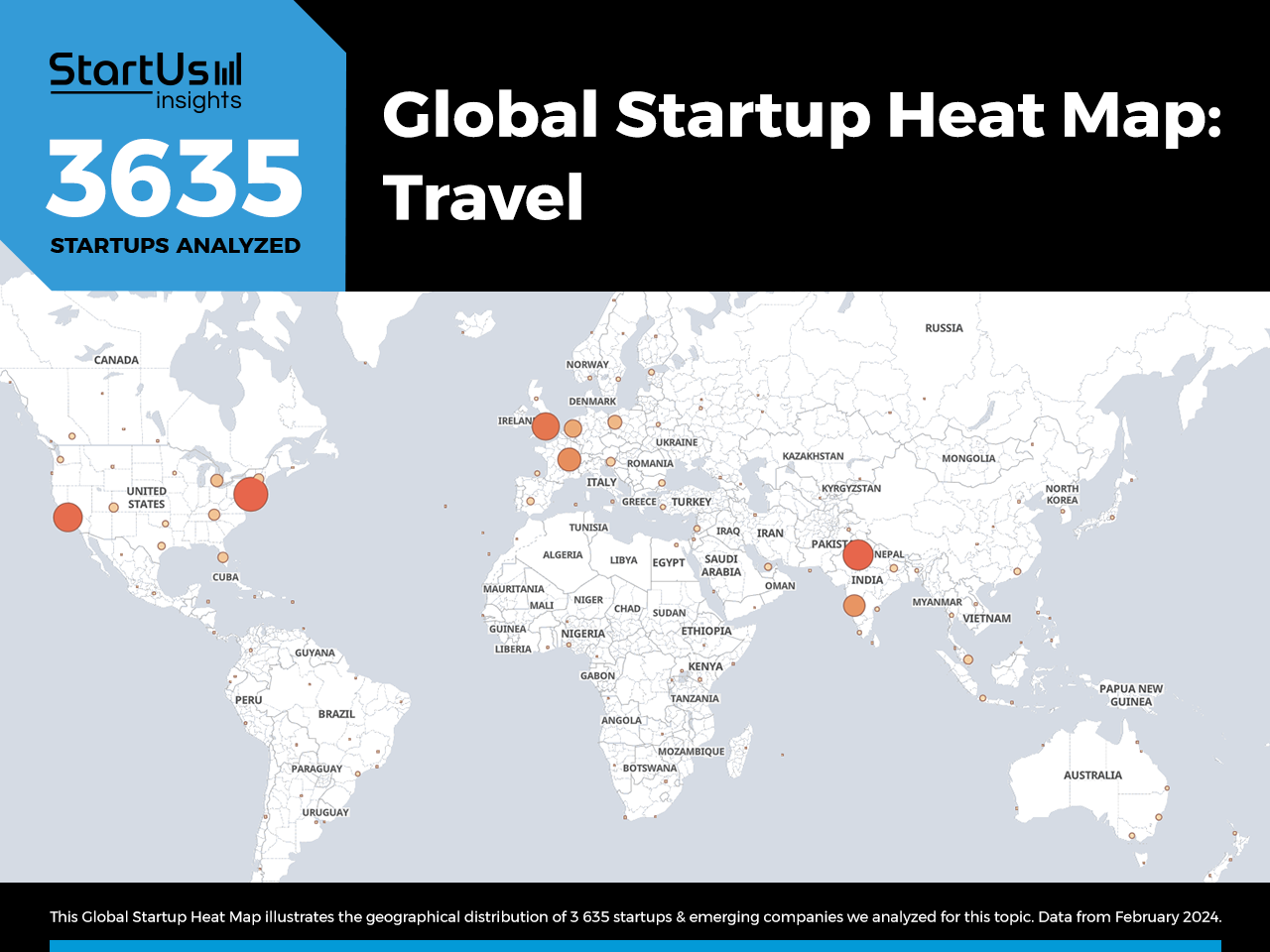
Interested in exploring all 3500+ travel startups & scaleups?
Top 9 Travel Trends in 2024
1. artificial intelligence.
Hotels employ intelligent chatbots, powered by AI, to provide quick and personalized responses to traveler inquiries. These chatbots simplify the booking process and gather customer reviews, aiding potential travelers in making informed decisions. Moreover, AI-based robots enhance the customer experience by automating hotel disinfection and delivering room service.
At airports, these robots guide travelers and assist with luggage handling. Facial recognition technology, driven by AI, expedites identity verification at airports, enhancing security and offering a swift alternative to traditional methods. Startups are developing AI-powered trip planning solutions, optimizing journeys, and personalizing travel experiences.
Travel Professor develops a Travel Chatbot
UK-based startup Travel Professor offers an AI-enabled chatbot for travelers. The startup’s chat widget software monitors multiple flight deals and notifies users when their preferences match. It also provides travel destination recommendations and flight price alerts. This allows travelers to book economical flights and have a budget-friendly tourism experience.
Pneuma Travel facilitates Travel Planning
US startup Pneuma Travel develops a voice-assisted digital agent, Sarah , to streamline the process of travel planning. This assistant, powered by AI, excels in arranging flight and accommodation bookings and assists travelers in discovering a variety of activities. Sarah , available round the clock, provides continuous support for all travel-related inquiries.
Moreover, Sarah customizes travel options according to individual preferences and budgetary constraints. The agent further enhances the travel experience by providing insights into local attractions in unfamiliar cities. Importantly, Sarah enables real-time modifications to travel plans, in compliance with specific airline policies, thereby minimizing waiting times for users.
2. Immersive Tourism
Immersive tourism caters to the growing demand for meaningful experiences among travelers, leveraging AR, VR, and mixed reality (MR). VR simulates original locations through a computer-generated environment, allowing tourists to virtually explore destinations. It provides travelers with a comprehensive 360-degree tour of points of interest.
AR enhances the travel experience with interactive elements such as navigation maps and ads. Travel companies employ AR and VR-based gamification to heighten tourist attractions. Moreover, these technologies enable hotels and resorts to present amenities and rooms in an engaging, interactive manner.
VR Travel Expo offers VR-based Travel Plans
US startup VR Travel Expo develops a VR travel application to transform the way people research and book travel. The application enables users to plan their vacations more efficiently. It provides an engaging platform for users to explore and expand their knowledge of the world. Moreover, it employs 3D geospatial technology that creates real-time digital twins of the world. This further enhances the travel planning experience.
AR Tour makes AR Glasses
Italian startup AR Tour offers AR-powered tours. The startup’s AR glasses superimpose reconstructed images of archaeological ruins to show how the site originally was. Its tour informs the tourists about the site’s history and significance via an audio-visual package. Moreover, the startup designs lightweight AR glasses to prevent motion sickness among tourists, improving convenience.
3. Internet of Things
IoT generates ample data that tourism companies leverage to personalize services in their subsequent visits. Hotels use IoT sensors to enable smart rooms that automate room lighting, temperature, and ambiance control, enhancing guest comfort. These sensors adjust appliances in vacant rooms, conserving energy and reducing the building’s carbon footprint.
Startups harness IoT to deliver location-specific information to customers, including real-time luggage tracking via IoT tags, minimizing lost items. Airlines also incorporate IoT-based solutions into seats, monitoring passenger temperature and heart rate for proactive health management.
Altitude enables Smart Hotels
New Zealand-based startup Altitude creates an IoT-based hotel software and hardware to develop smart hotels. The startup makes self-service kiosks to automate reservations, room up-gradation, payments, as well as check-in and check-out. Its hotel management platform further enables contactless engagement with guests. Additionally, Altitude’s mobile keys allow guests to open doors using mobile phones, providing convenience and saving time for travelers.
Smart Tour provides Smart Itineraries
Brazilian startup Smart Tour offers smart itineraries using IoT and quick response (QR) codes. The startup recommends travel routes and destinations based on the user’s preference in real-time. This facilitates a seamless experience for travelers. Besides, the user-generated data enables tourism managers to better understand consumer behavior and indulge in proximity marketing. The startup also offers a contact tracing solution to monitor COVID-19 infected travelers and ensure public safety.
4. Contactless Travel
Travelers benefit from contactless recognition technologies like retina scanning, which replace traditional travel documents, speeding up passenger identification and reducing airport queues. QR codes offered by travel companies allow tourists to access relevant information on their mobile devices, enhancing engagement.
Hotels have introduced contactless self-check-ins, enabling visitors to arrange services before arrival. Additionally, contactless payment modes are available in hotels and restaurants for swift and secure transactions. Moreover, wearable devices are transforming the travel experience by providing real-time notifications and touch-free access to services and information.
Loxe designs Smart Hotel Keys
US-based startup Loxe makes smart mobile keys for hotels. The startup’s smartphone app replaces key cards with contactless mobile keys that allow users to unlock doors using smartphones. It also reduces operational costs incurred in the manufacturing of conventional keys or plastic cards. Moreover, the startup designs a Bluetooth retrofit module that converts normal door locks into mobile-ready door locks. This allows hotel owners to easily convert their existing locks into smart ones without additional expenses while improving guest safety and convenience.
Avendi provides Contactless Payment
Singaporean startup Avendi offers contactless and cashless payments for travelers. The startup allows tourists to accumulate expenses throughout their trip and pay at the end of the journey. Avendi’s app utilizes QR codes to add all the billed expenses and shown through its dashboard. The user settles the tab amount in the preferred currency, preventing the inconvenience of cash withdrawal or credit card payments.
5. Big Data & Analytics
Big data empowers travel companies with customer trends for strategic marketing. Analyzing traveler behavior, they offer tailored recommendations for hotel bookings, cab hires, flight reservations, and ticket purchases.
Predicting future demand is another advantage of big data and analytics, helping hotels and airlines identify peak periods to optimize revenue. Advanced analysis of transactional data aids in detecting cyber fraud, and safeguarding sensitive customer information such as credit card details and biometric data.
CheckandPack creates a Travel Platform
Dutch startup CheckandPack offers a big data travel platform. It runs marketing campaigns to gather traveler data and understand tourism trends. Based on these insights, the platform enables businesses to approach travelers with a customized appeal. It also provides travelers with holiday planning.
3Victors provides Travel Data Analytics
US-based startup 3Victors offers travel data analytics. The startup’s product, PriceEye Suite , proactively monitors the prices of numerous airlines to provide insights into competitor prices. It creates a dashboard to display travelers’ location of interest, allowing travel airlines to better manage their revenue and pricing strategy.

6. Post-Pandemic Tourism
Post-pandemic tourism focuses on safe, sustainable, and flexible travel options, responding to evolving traveler preferences and health guidelines. Enhanced health and safety protocols, including regular sanitization and contactless services, become standard in airlines and hotels, ensuring traveler confidence.
Destinations and operators emphasize outdoor and less crowded experiences, catering to a heightened demand for nature-based and wellness travel. Flexible booking policies and trip insurance gain prominence, offering peace of mind amid uncertainties. Sustainable travel gains traction, with tourists and businesses prioritizing environmental impact and community well-being.
GOPASS Global enables Pre-travel Risk Management
Singaporean startup GOPASS Global provides a travel risk analytics platform against COVID-19. It analyzes the biosecurity risk elements involved in a trip, such as border restrictions, quarantine requirements, airport type, and airline transit points or seating in real-time. This allows travelers to assess risk factors and plan their trips accordingly.
Moreover, the startup creates world maps displaying information regarding COVID-prone areas, testing areas, and vaccine coverage. This provides travelers with a preview of the current situation, allowing them to ensure safety during business and leisure travel.
Workcations enables Work from Anywhere
Indian startup Workcations provides properties at tourist destinations for remote-working individuals. It offers amenities like internet connectivity, food, and a quiet ambiance, allowing tourists to work in a peaceful environment without hindrance. This increases employee productivity, motivation, and retention.
7. Tour Premiumization
Hyper-personalization in travel experiences is on the rise, with tourists eager to immerse themselves in diverse cultures. Luxury travelers enjoy tailored experiences and intuitive services through tour premiumization. Health and wellness packages offered by travel startups help tourists unwind.
These retreats enhance health and offer detoxifying food options. Space tourism is another exciting development, offering leisure or research trips to space. Lastly, travel startups are fostering customer loyalty and building strong relationships through membership or subscription models.
STOKE provides Space Tour
US-based startup STOKE facilitates space travel using everyday-operable rockets. The startup’s rockets are reusable and deliver satellites to any desired orbit. This enables on-demand access to space, paving way for space tours for exploration, recreation, and research. The startup also emphasizes the economical and rapid development of its hardware for feasible spacecraft launches, advancing space tourism.
Origin offers Travel Personalization
Dutch startup Origin provides premium travel personalization to tourists. The startup utilizes machine learning and travel curators to plan creative vacations. It also arranges flights and accommodation for travelers. Further, the startup measures the carbon output of itineraries and offers sustainable tourism options.
8. Ecotourism
Traveling responsibly minimizes tourism’s environmental impact and supports local communities’ well-being. Ecotourists strive to reduce their carbon footprint during their journeys. Startups contribute by developing sustainable transport, ecolodges, and solar-powered resorts.
Airline passengers have the option to offset carbon emissions during flight bookings. Local tourism stimulates small businesses economically and creates job opportunities. It also emphasizes minimum littering, which lowers pollution and the time spent on cleanups.
Jet-Set Offset simplifies Flight Carbon Offset
US-based startup Jet-Set Offset creates a carbon-offsetting platform for air travel. The startup partners with non-profit organizations working against climate change and connects them with travelers. Each time travelers book flight tickets via the startup’s platform, Jet-Set Offset contributes a certain amount per mile for their journey to environmental organizations. This way, the passenger’s journey promotes mileage-based donations to offset carbon emissions.
The Green Stamp facilitates Ethical Wildlife Tour
Dutch startup The Green Stamp provides a platform to book ethical wildlife tours. It curates tours based on the tourists’ inclinations toward certain locations or wildlife. Exploration of these projects allows travelers to indirectly contribute to their cause as these wildlife projects donate to the welfare of local communities and the environment.
9. Blockchain
Blockchain provides the travel industry with operational transparency and security. Traceable payments, particularly for international travel, are a key application, that fosters trust among parties involved in transactions.
Automation and enforcement of agreements in travel insurance and supplier contracts are achieved through smart contracts. This strengthens reliability and cuts administrative costs. Travel firms establish customer loyalty programs where points are exchanged for cryptocurrency. Lastly, blockchain increases data storage security, reducing the risk of information leaks.
Upswing facilitates Guest Profiling
Indian startup Upswing creates AURA , a blockchain-powered platform for guest profiling. It provides a holistic view of guests, their preferences, and purchase patterns. The platform associates a score with each guest and suggests improvements in their service. This facilitates hotels to provide a personalized experience to their guests and, in turn, increase sales.
UIQ Travel develops a Solo Traveling App
US-based startup UIQ Travel develops a blockchain-based app to connect solo travelers. It discovers people with shared interests and suggests tours or attractions. Such hyper-personalized recommendations assist in experience discovery and also increase traveler engagement.
Discover all Travel Trends, Technologies & Startups
Tourism, although severely impacted by the pandemic, now continues to rapidly grow across the globe. Post-pandemic trends indicate an increasing emphasis on hygiene and safety during travel. The industry is witnessing the widespread adoption of disruptive technologies like AI, XR, IoT, and blockchain. The travel industry utilizes big data to understand traveler trends for targeted marketing. The transition to ecotourism is accelerating as businesses integrate zero-emission transit and carbon offset programs to reduce their carbon footprint.
The Travel Trends & Startups outlined in this report only scratch the surface of trends that we identified during our data-driven innovation and startup scouting process. Among others, personalization, decarbonization, and travel safety will transform the sector as we know it today. Identifying new opportunities and emerging technologies to implement into your business goes a long way in gaining a competitive advantage. Get in touch to easily and exhaustively scout startups, technologies & trends that matter to you!
Your Name Business Email Company
Get our free newsletter on technology and startups.
Protected by reCAPTCHA and the Google Privacy Policy and Terms of Service apply.
Discover our Free Travel Report 21 pages
Book a call today!

Travel 21 pages report
Mobility 22 pages report, railway 22 pages report, cleantech 19 pages report.
Leverage our unparalleled data advantage to quickly and easily find hidden gems among 4.7M+ startups, scaleups. Access the world's most comprehensive innovation intelligence and stay ahead with AI-powered precision.
Get in touch
Your Name Business Email Company How can we support you? (optional)
Business Email

Protected by reCAPTCHA and the Google Privacy Policy and Terms of Service apply.
The Biggest Travel Trends to Expect in 2024
By Condé Nast Traveller and Sarah Allard

All products featured on Condé Nast Traveler are independently selected by our editors. However, when you buy something through our retail links, we may earn an affiliate commission.
If 2022 travel trends were all about a return to travel, then 2023 was the year we went further than ever before . Travelers took to the skies, rails, roads, and seas to cross off goals on their bucket lists with Arctic adventures, luxury yacht cruises , and even the first tourist trip into space.
In 2024, travelers will be putting what’s important to them front and center of their plans, valuing deeper experiences that leave a positive impact, time spent with loved ones, and wellness moments that last well after checkout. We’ll be choosing destinations carefully, slowing it down to enjoy the silence and the stars, indulging in our love of food in new and interesting places, and immersing ourselves in wellness practices that help us live longer.
These are the 20 travel trends likely to guide how we see the world in 2024.
A version of this article originally appeared in Condé Nast Traveller UK .

1. Astro tourism
What’s the trend? Astronomy, of course, is a field of study that has been around since the dawn of civilization, and the act of gazing up at the stars has long been a source of soul-soothing wonder. Today, the more society falls deeper into an ever-expanding virtual world, the more we feel a need to broaden our horizons in the real universe. Astro tourism is the act of traveling with the aim of catching sight of astronomical phenomena—disappearing to lands devoid of any pollution, crowds, and traffic, where we can focus solely on the skies above and while away hours gazing at the stars, planets, and constellations overhead.
Why will it matter in 2024? Increasingly, wellness-centric hotels and spas are creating the space for guests to gaze upwards, watching for comets, spying constellations, and identifying patterns in the glittering expanse. In the UK, Port Lympne has opened the Lookout Bubble, a glass dome allowing guests to sprawl out on king-sized beds and study the stars. Further east on the Arabian Gulf, Zulal Wellness Resort is surrounded by the expanse of the Qatari desert—the ultimate destination for pollution-free astromancy, with dedicated workshops and stargazing sessions for families and children looking to learn more about the cosmos.
Safari company Desert & Delta organizes trips for travelers looking to soak up the stars across Botswana and Namibia, where guests can sleep in tents at remote locations such as the Makgadikgadi Pans, one of the world’s largest salt flats, and spend nights with uninterrupted star vistas. Similarly, Tswalu is a South African safari camp with star beds set on a sleep-out deck in the Korannaberg mountains. And 2024 happens to be a big year for the skies, from mind-boggling eclipses to spectacular meteor showers.
Plus, scientists are predicting the best displays of the Northern Lights in 20 years, according to the Guardian , as we approach the next solar maximum (the sun’s peak of its 11-year activity cycle). — Olivia Morelli
2. Eco diving
What’s the trend? A rise in divers choosing their travel destinations based on the sustainability of the scuba centers , and having a more positive and regenerative impact on the ocean once there.
Why will it matter in 2024? In 2022, UK marine ecology charity The Reef-World Foundation found that 95% of divers wanted to book with sustainable operators, but struggled to do so. In response to this, the Professional Association of Diving Instructors (a.k.a. Padi) launched its Eco Center accreditation on World Earth Day in 2023, with the United Nations Environment Program and Reef-World itself. The steps required to earn this green status are so rigorous, including sharing evidence of conservation activities and a real reduction in environmental footprint, that Padi advised operators to allow at least 12 months to hit the criteria—taking us to Earth Day 2024.
After an initial figure of just 11 worldwide, there are now 100 accredited operators, and Padi has set a goal to reach 660 by 2030—a tenth of its membership. “South East Asia currently has the highest density (more than 20), along with the Caribbean ,” says Julie Andersen of Padi. So what does this mean for divers and their trips? “The type of conservation work done and reported on depends on the Eco Center,” Andersen explains. “Those in the Caribbean offer coral replanting programs, key for regenerating coastlines. In Baja, Mexico , they’ve developed citizen science courses, collecting data for whale conservation.”
There are also a number of new Padi courses being launched for any diver to take anywhere, including the Global Shark and Ray Census in August 2024, as well as the relaunch of the Coral Reef Conservation Specialty course before December. — Becky Lucas
3. Home swapping
What’s the trend? Increasingly, discerning travelers are looking to stay away for longer stretches, while the rise of remote jobs means that working and living abroad has never been more appealing. The catch? Forking out on hefty accommodation fees while you’re at it. Enter home swapping: the perfect solution to guarantee yourself a (free) home abroad while you offer up your own in exchange for weeks or even months at a time.

Matt Ortile

Scott Laird

Siobhan Reid

Meaghan Kenny
Why will it matter in 2024? As the cost of traveling continues to climb, home swapping is an affordable alternative to splashing out on expensive hotels or Airbnbs. And while the concepts of couch surfing and house exchanges have existed for decades, several slick new platforms are redefining what home swapping looks like today.
Twin City , which operates in cities like as Lisbon and Los Angeles , has curated a community of over 1,100 carefully vetted users in just eight months. For an annual subscription fee of about $189, members can find Twins to connect with through the platform, and are encouraged to exchange local recommendations for their city as well as their homes, enabling members to feel as if they’re swapping with a trusted friend rather than a stranger.
Meanwhile, Kindred , a home-swapping platform where members rack up credits for each night that they exchange homes, raised $15 million in funding this year to expand operations across the US and Europe, and currently has more then 10,000 homes in over 50 cities. Members simply pay a cleaning and service fee for each stay, while the cost of the stay itself is free.
Travelers can skip out on membership fees entirely and head straight to TikTok, where Gen Z appears to be spearheading the home-swapping movement on social media. Inspired by the film The Holiday , trending tags #houseswap and #homeswap have garnered more than 23 and 20 million views respectively, with users utilizing the platform as a means to advertise their homes, discover like-minded peers to swap with, and document their adventures along the way. — Gina Jackson
4. Train stations are the new food destinations
What’s the trend? Train stations around the world are usually passed through as quickly as possible, having not been designed for commuters to stay and hang out. Nowadays, as travel delays increase and visitors want more local experiences, it pays for train stations to welcome travelers with shops, restaurants, and bars for them to explore. In an effort to create a more dynamic visitor experience, historic train stations are being revamped, with bespoke food and drink offerings as an integral part of the redesign.
Why will it matter in 2024? As train stations are renovated to accommodate more travelers and update old infrastructure, local restaurants and bars are being added to attract more customers. In 2023, the new Moynihan Train Hall in New York City became home to The Irish Exit, a bar from the team behind the acclaimed Dead Rabbit, and Yono Sushi by trendy BondST, plus outposts of beloved NYC restaurants Pastrami Queen and Jacob’s Pickles, with Mexican hotspot La Esquina coming soon. As part of its renovation, Toronto’s Union Station launched Union Market in May 2023 with favorite local food retailers Manotas Organics, Chocolatta Brigadeiro’s, Patties Express, and Kibo.
In the UK, Platform 1 , a new bar and restaurant, opened in November underneath Glasgow Central Station . The cave-like space, with its historic brick arches, serves street-food-style dishes and craft brews made in the on-site microbrewery, plus there’s an outdoor beer garden. Meanwhile, in Somerset, Castle Cary station is in the process of a revamp, with nearby hotel The Newt creating a creamery, cafe, and co-working space, which is set to open in 2024.
Also on tap for the next few years is the completed renovation of 30th Street Station in Philadelphia, with plans for a 20% increase in concession space that will focus on local purveyors. — Devorah Lev-Tov
5. Sports tourism
What’s the trend? Sports tourism has evolved in the past few years with a new generation of sports fan emerging, thanks to glossy TV documentaries ( Formula 1: Drive to Survive , we’re looking at you). Now, we’re taking our fandom out of the house and following a host of different sports in destinations across the world, planning trips that hinge around seeing games, races, and other activities in exotic locales, and extending trips on either side to see the sights too.
Why will it matter in 2024? A little event known as the Olympic and Paralympic Games anchors the 2024 sports calendar. It kicks off in Paris in late July and runs until early September , during which time more than a million tourists are expected to check in across the French capital. The games have inspired city-wide projects such as the €1.4-billion clean-up of the Seine, which, should all go well, will allow public swimming in the river for the first time in a century.
Elsewhere, the Tour de France starts in Italy for the first time, with competitors speeding off in Florence before heading to Rimini on the Adriatic coast and then north to the Apennines through Emilia-Romagna. New bike routes in the area have been released by tour operators such as Ride International Tours and Ride Holidays for cycling enthusiasts keen to join in the fun. — Sarah James
6. Coolcationing
What’s the trend? For the vast majority of folks, summer holidays used to be about following the sun, seeking the heat—watching the mercury climb and hitting the sands. With the intense, record-breaking temperatures of recent years, however, many are considering traveling in the opposite direction: booking "coolcations" in temperate destinations, which also benefit from being less crowded.
Why will it matter in 2024? It's official: 2023 is the hottest year on record . Little wonder that many travelers are thinking twice before booking literal hotspots like the South of France and Sicily, prone to heatwaves , in July or August. A survey for luxe travel network Virtuoso found that 82% of its clients are considering destinations with more moderate weather in 2024: destinations such as Iceland , Finland , and Scotland , according to Intrepid Travel , along with Latvia, which is surging in popularity. “We’re seeing an increase in those holidaying further north,” says Andrea Godfrey of Regent Holidays . “Scandinavia and the Baltics are both getting noticed more: They offer a more pared-back style of holiday but have some lovely beaches, forests, and lakes for both relaxation and adventure activities.”
Cooler temperatures are particularly well suited to family travel too. “We’re getting far more inquiries from families for destinations that offer summer sun, but also respite from the high temperatures being experienced in beach resorts across the Med,” says Liddy Pleasants, founder of family specialist Stubborn Mule Travel . “Kayaking in Norway, with its midnight sun, for instance, and cycling or hiking in Slovenia, which is also very good value.” — Rick Jordan

7. Gig tripping
What’s the trend? For years, athletes and wellness gurus were the big headliners at retreats. But rock stars are, well, the new rock stars of travel. Call it the Taylor Swift Effect. Destination concert business is up more than 50%, led mostly by Taylor Swift, says Janel Carnero, a travel advisor at Embark Beyond . In the US, tickets for Swift’s Eras Tour cost thousands and were still impossible to score. Music fans are realizing they can pay less and have a more memorable experience by seeing their favorite pop icons perform in say, Amsterdam or Milan . (Remember when everyone went to see Beyoncé early in Stockholm ?) Tours from performers such as Pearl Jam, U2, Doja Cat, and Madonna will anchor trip itineraries, while music festivals—Glastonbury sold out in less than an hour—will be major catalysts for travel.
Why will it matter in 2024? New music festivals, including Untold in Romania's Cluj-Napoca, are introducing travelers to less-popular destinations, says Alexandrea Padilha of Fischer Travel . And it’s no longer just about the music, says Carnero. “It’s the social aspect of sharing experiences with friends,” she adds.
Hotels and travel companies have taken note and are creating the equivalent of backstage VIP experiences for guests. Global adventure collective Eleven has recently introduced Music with Eleven. The program’s dedicated team of music-industry insiders (including Chris Funk, guitarist from the Decemberists) design custom itineraries that might include sitting in on a recording session at Flóki Studios, just outside the Arctic Circle at Deplar Farm in Iceland. And Rhythm & Sails hosts musicians on its catamarans. The company’s music director, Anders Beck of the jam band Greensky Bluegrass, curates the line-up of artists who perform sessions onboard and in ports as you island hop around the Caribbean . — Jen Murphy
8. Resorts will help you biohack your health span
What’s the trend? Longevity is the latest wellness buzzword thanks to best-selling books such as Outlive and the hit Netflix documentary Live to 100: Secrets of the Blue Zones . Between 2021 and 2022, venture-capital investment in longevity clinics more than doubled from $27 million to $57 million globally, according to analysis from longevity research and media company Longevity.Technology. Now, the science of extending life and optimizing health has become the focus at hotels. Blue Zones retreats are the new boot camps, and even sybaritic resorts are offering the latest biohacks. Poolside vitamin IV, anyone?
Why will it matter in 2024? Since the pandemic, feeling good trumps looking good. “People have become aware of the critical importance of developing a more proactive, preventive approach to health on all levels,” says Karina Stewart, co-founder of Kamalaya , a wellness retreat in Koh Samui, Thailand . This means a new willingness to go beyond diet and exercise and embrace sci-fi-sounding bio-regenerative treatments such as ozone therapy and hyperbaric oxygen chambers, both on offer at Kamalaya's new Longevity House.
Luxury hotel brands are embracing the trend too. Six Senses Ibiza recently teamed up with biotech company RoseBar to offer guests full diagnostic testing. Maybourne Hotel Group is collaborating with wellness tech pioneer Virtusan to help guests boost performance. And Four Seasons Resort Maui at Wailea administers treatments such as stem cells and NAD+ (a.k.a. the fountain of youth) through its partnership with Next Health . At 1 Hotel Hanalei Bay in Kauai, guests are welcomed with a B12 shot and the resort’s new wellness-specific rooms come with recovery-boosting mod cons including infrared light mats. If the trend continues, the secret to longevity may be as easy as taking more holidays. — Jen Murphy
9. Peak season gets the cold shoulder
What's the trend? There’s been a dramatic recent increase in shoulder season travel to Europe’s most popular destinations (particularly France , Spain , the UK , and Italy ), which is set to continue in 2024. Luxury travel specialists Original Travel has launched new shoulder season itineraries to locations traditionally in demand during the summer—including the crystalline seascapes of Sardinia and Corsica—after seeing 14% more bookings for September 2023 than for August 2023. Pegi Amarteifio of Small Luxury Hotels of the World shares similar insights: “Comparing phone reservations in 2023 against 2019, we’ve seen a 33% increase for March to May and a 58% increase for September to November, a pattern reflected across our other booking channels too.”
Why will it matter in 2024? A combination of social, economic, and environmental factors is driving this trend into 2024. The cost of living crisis means a heightened focus on value. For 62% of respondents to Booking.com’s 2024 travel trends survey, this is a limiting factor for 2024 travel planning, so much so that 47% of respondents are even willing to take children out of school for cheaper off-peak travel. Shoulder season travel is also becoming more attractive due to rising temperatures, and more feasible due to flexible working. Layered on top of these practical considerations is an emotional motivation too: Travelers are craving authenticity more than ever, seeking a tranquil and local feel when abroad, rather than beaches that resemble a Where's Waldo? scene. — Toyo Odetunde
10. Private group travel
What’s the trend? The post-pandemic desire to gather friends or family and embark on a shared holiday experience shows no sign of abating. In fact, it’s on the increase in luxury travel, as people appreciate the benefits and savor the moment, from three-generation family groups to 50-something empty-nesters keen to rekindle life-long friendships. Just don’t take Succession ’s family outing to Tuscany as a role model.
Why will it matter in 2024? “While some predicted group travel would peak post-pandemic, we’ve seen it have a lasting, positive impact with private group bookings continuing to be a dominant trend,” says Tom Marchant of Black Tomato , for whom group travel now accounts for 30% of bookings. The company has just launched its See You in the Moment series to cater for the demand. It uses a mood board of over 35 experiences themed around key flash points, from The Meal (a backcountry feast served on the North Rim of the Grand Canyon , for example) to The Challenge (rafting down the Apurímac in Peru , perhaps), all designed to create lasting memories. For Scott Williams , meanwhile, multi-generational travelers are thinking big: Why take one house when you can take a whole estate, such as Meli on Paxos in the Greek Islands, which sleeps 17?
Other groups are taking to the water, with Red Savannah reporting an increase in bookings for Turkish gulets, Egyptian dahabiyas, and Indonesian phinisis. Scott Dunn have seen an increase in bookings amongst groups of friends, with 30% of respondents in a recent survey saying they were planning trips for 2024 that included ski trips to France, adventure travel in South and Central America, and beach breaks on Antigua and Barbados.
Empty-nesters are also a growing force, with groups of couples in their 50s to 70s hiring villas in the shoulder season for cultural weeks away, and all-female groups—mainly aged between 50 and 65—who are proactive in wanting to renew long-term friendships. “We had one repeat group that included several cancer survivors,” says Sarah-Leigh Shenton at Red Savannah. “A hammam afternoon in Turkey was a deeply bonding experience and they’ve since traveled to Jordan and Sicily together.” — Rick Jordan
11. AI aims to be your sidekick
What's the trend? Early last year, after OpenAI’s ChatGPT broke the record as the fastest-ever growing consumer app, travelers started playing around with AI chatbots to get inspiration on where they could go. More recently, major travel booking platforms have started to integrate AI chatbots into the booking experience. But if 2023 was the year of AI chatbots wanting to plan your trips , 2024 will be all about how AI aspires to be your travel sidekick. A wave of new AI-powered features and products aims to support travelers on the ground, all while raising concerns around the potential negative impacts as AI becomes more widely integrated with our travels.
Why will it matter in 2024? AI will start to make more real-time interventions in our travels in 2024. One practical example is live translation , which Samsung plans to launch on its 2024 Galaxy devices. Imagine calling somewhere you want to visit to get information without worrying about whether staff speak the same language as you. Another example is greater AI personalization in popular apps you already use. Uber’s CEO Dara Khosrowshahi has recently touted the company's increasing use of personalized AI algorithms , which will learn about your habits and make suggestions based on what you’re doing.
For the true early adopters, real-time travel interventions could also mean ditching your screen entirely and clipping a screenless personal translator and travel assistant to your chest. This is the unusual idea behind the new talking and projecting AI Pin from Humane , a start-up backed by investors including OpenAI’s Sam Altman, that promises to function a bit like the universal translator from Star Trek . Will anyone want to actually wear the pin or will it go the way of previously hyped devices such as Google Glass? It certainly raises a host of ethical questions about privacy and data protection. Yet the more that AI products successfully help in addressing on-the-go problems, the more travelers will come to rely on them too. — JD Shadel
12. Skip-gen travel
What’s the trend? Skip-gen travel describes when grandparents holiday with grandchildren, in other words, “skipping” a generation. “In the past few months, I've had around twice as many enquiries as usual for grandchild/grandchild bookings,” says Clio Wood, founder of family retreat company &Breathe . “There’s been a rising trend of grandparents taking their grandchildren away,” agrees Ollie Summers, head of sales at luxury travel operator Scott Dunn . “Often to places that have a sentimental meaning to them.”
Why will it matter in 2024? Several travel agencies have created itineraries to cater specifically for this demand in 2024. “Skip-gen safaris are emerging as a micro-trend from the UK, reflecting a niche traveler group now well established in the US luxury market,” says Liane Goldring of Mahlatini Luxury Travel . “The grandparents are usually in their 70s and still active enough to fully embrace a fully guided safari adventure.” Original Travel, meanwhile, has relaunched its Bonding Holidays Collection , featuring trips focused on discovering something new together, such as its 14-day Family Ranching itinerary in the American West. Some of this growth can be attributed to big-ticket lockdown promises coming to fruition. Now, parents are also keen to make the most of the time and childcare support of their typically retired parents. Plus, the global ratio of living grandparents to grandchildren is higher than ever, thanks to a combined increase in life expectancy and drop in the number of children per person. We’re even said to be living in the “the age of the grandparent.” Don’t expect this trend—or your grandparents—to slow down anytime soon. — Becky Lucas

13. Train travel gets glam
What’s the trend? Rising climate consciousness has fueled a rail travel revival, and so the luxury train niche is reaching new heights of popularity, extravagance, and ambition. Travel booking platforms are reporting growing demand for luxury rail trips , where the journey is, yes, the destination. In fact, new design-forward train lines increasingly rival the finest hotels for the culinary experiences and bells and whistles on offer.
Why will it matter in 2024? A new wave of rail lines and itineraries launching in 2024 puts an emphasis on deeper immersion into the culture and landscapes of the destinations, which are more and more off the beaten track. Responding to growing demand for luxury train travel among its user base, specialist platform Railbookers plans to launch arguably the most geographically extensive and expensive luxury train itinerary around. With prices per person starting at $113,599, the 80-day Around the World by Luxury Train voyage will cross four continents and 13 countries. Beginning in August, the slow journey will string together existing luxury rail trips including Canada’s Rocky Mountaineer from Vancouver to Jasper, and India’s Maharajas Express from Delhi to Mumbai.
In Asia, the previously paused Eastern & Oriental Express is making a grand comeback starting in February, with carriages getting an upscale revamp and its legendary route being retraced through Malaysia's landscapes. Meanwhile, Japan is a hot destination for its scenic train journeys such as the exclusive Train Suite Shiki-shima, which quickly closed applications for its 2024 trips due to demand.
And in Europe, six new train lines will commence or terminate in Rome under Accor's La Dolce Vita umbrella, with suites designed by starchitects Dimorestudio, building on the cultural legacy of the famous Orient Express . — JD Shadel
14. Restaurateur-owned hotels
What’s the trend? Restaurants and hotels are the two keystones of the hospitality industry. And naturally, the two are often intertwined on one premises. Until recently, though, most hotels weren’t started or owned by restaurateurs. Yet as food-focused travel keeps increasing, with people hankering for the next hot reservation and planning entire trips around engaging with a culture through its food, it makes sense that restaurateurs are adding hotelier to their personal bios—and ensuring their new properties have impressive food offerings. We’d be remiss not to mention Nobu, which began as a restaurant in 1994 and in 2013 launched its global hotel brand , as a harbinger of the trend.
Why will it matter in 2024? Just as design brands (RH, West Elm) have opened hotels in recent years, now restaurateurs are getting in on the action. In the US, restaurateur and 12-time James Beard award nominee Sam Fox has just launched the Global Ambassador in Phoenix, Arizona, with five restaurants. Santa Barbara’s Good Lion Hospitality is relaunching Petit Soleil , a Californian wine country boutique hotel, with a new bar and restaurant slated for next spring. The Lafayette Hotel & Club was debuted last summer in San Diego by Arsalun Tafazoli, founder of a local hospitality group that operates 16 bars and restaurants. The hotel has five restaurants and bars, with two more opening by the end of the year. In Dallas, Harwood International, which owns a dozen or so restaurants in the area, opened Hôtel Swexan in June.
In the St. Gallen region of Switzerland, two hotels were recently added to beloved restaurants: the revamped Mammertsberg and Gasthaus Traube . In Slovenia, AS Hotel is a new place to stay launched by Sebastijan Raspopović, son of chef Svetozar Raspopović-Pope of renowned restaurant Gostilna AS in Lublijana. Aside from a restaurant by Raspopović-Pope, the hotel also has an eatery by Michelin-lauded chef Ana Roš. Finally, R48 , and its lauded Chef’s Table, was opened in Tel Aviv last spring by R2M Hospitality Group, which also runs restaurants CoffeeBar and Herzl 16. — Devorah Lev-Tov
15. Silent travel
What’s the trend? In an age of overstimulation, silence might be just what we need from our travels in 2024. Offering a chance to restore and reset, silent travel represents a more mindful kind of trip, one that doesn’t leave you needing a holiday to recover from your holiday. Silent meditation retreats are an increasingly popular wellness trend, but silent travel also encompasses secluded nature resorts, sleep retreats , quiet hotels , silent walking tours and even silent disco and concert experiences.
Why will it matter in 2024? Saturated with stress and screen time, many of us are looking for ways to disconnect. The silent walking trend that recently took TikTok by storm reflects a growing impulse to escape the noise of our tech-fueled lives and embrace the quiet, with promising implications for wellbeing. One 2015 study suggests silence may help to stimulate brain development, while another found that two minutes of silence during or after relaxing music increased the music's calming effects. With the Global Wellness Institute forecasting a 21% increase in wellness tourism in the next two years, what better counter to the chaos of our always-on lives than silence? Silent travel is also part of a move towards more sustainable tourism. Quiet Parks International , for example, offers unique nature experiences in dedicated quiet spaces, reducing noise pollution for the surrounding wildlife.
Silent travel opportunities abound in 2024. Kick off the year with a silent retreat in Portugal (with Innate ) or Italy (with Mandali ). More adventurous silent-seekers can trek the peaceful Japanese Kumano Kodo trail, or explore Finland’s Arctic landscape with a Silence & Nature Tour . For a tailor-made silent experience, Black Tomato’s Blink camp offers luxury accommodation in the world’s most remote settings, while its Get Lost program promises to help you find yourself by getting lost in a far-flung location. — Tasha Kleeman
16. Urban gardens
What’s the trend? Never mind the biophilic office and those pot plants you forget to water: Whole cities are going green as architects and planners create leafy microclimates amid the grey concrete to help keep us cooler, connect communities and even feed us.
Why will it matter in 2024? Having trees and gardens in our cities is a pretty good idea. King Nebuchadnezzar certainly thought so, which is why his Hanging Gardens of Babylon made it into travel’s first-ever bucket list—the Seven Wonders of the Ancient World—back in the 2nd century BC. Nowadays, planting trees creates much-needed shade, stores carbon, and increases biodiversity, but it also makes our cityscapes so much nicer.
While Valencia, an early adopter of urban greening with its 12km-long Turia Garden in 1986, is the 2024 European Green Capital, France is busy planting trees like there’s no tomorrow. Go to Paris for the 2024 Olympics and you’ll spot budding new forests growing in Place du Colonel-Fabien, Place de Catalogne, and in the Charonne district, while Bordeaux ’s Grandeur Nature project includes urban cooling islands, micro-forests, and rain gardens.
Meanwhile, on Cyprus—an island that experienced temperatures of 111°F in 2023—the new Salina Park opens in time for summer shade in the seaside city of Larnaca. In Brazil , Rio’s Hortas Cariocas is a groundbreaking achievement that will be completed by the end of 2024: the largest urban vegetable garden in the world, connecting 56 community gardens across favelas and schools.
And in London , the £1-billion Google building in King’s Cross will show just what can be done with one structure. Designed by Thomas Heatherwick, the “landscraper”—only 11 stories high but stretching out longer than the Shard is tall—is hoped to provide a blueprint for future urban projects: running along the rooftop is a multi-level garden, with wildflowers, lawns and decked seating areas, set with more than 55,000 plants and 250 trees. Can you dig it? — Rick Jordan
17. Back-of-house tours
What’s the trend? Greener hotels giving us a look behind the scenes to show us—not just tell us— they're sustainable. Not just a look-see at solar panels or composting, but experiential tours that help us appreciate why it matters to support socio-economic uplift through tourism. In South America, Blue Apple Beach invites visitors to get up close and personal with the community work it does in Colombia through its impact fund. Founder Portia Hart wanted more than token-gesture carbon offsetting, where locals themselves could decide how money was spent. In Africa, guests of the Bushcamp Company contribute to initiatives through the Luangwa Conservation and Community Fund. A popular excursion in Zambia is visiting the boreholes that are installed with outreach funds. Each pump provides fresh drinking water to hundreds of people a day, and visitors who spend time with those gathered get a very tangible insight into how such provisions funded by hospitality can literally change lives in regions most affected by a warming planet.
Why will it matter in 2024? Transparency is on the up as the European Union's Corporate Sustainability Reporting Directive comes into force and greenwashing is coming close to being officially outlawed. A year of droughts, floods, and heatwaves also reminds us we need to make better-informed choices in our travel planning—and all the better if we can also get a crash course on the science and sociology of positive impact. Experiences that go beyond explaining responsible practices, but demonstrate a deep respect for communities on the climate-change frontlines and help make their challenges relatable to visitors are especially helpful. — Juliet Kinsman
18. Wild feasting
What’s the trend? Have you ever noticed how food always tastes better outdoors? But in today’s modern world, many of us are more used to eating a sandwich while staring at a screen. Wild feasting describes the trend for beautifully curated culinary experiences in natural environments with the incorporation of hyper-local and foraged ingredients. In Sweden , for example, you can tap into a network of do-it-yourself outdoor restaurants where you book a table in a scenic location, search for nettles, birch leaves, lingonberries, and trumpet chanterelles, and then cook them on an open fire according to a recipe card provided by a Michelin-grade chef.
Why will it matter in 2024? A greater range of wild feasting opportunities will give urbanites a chance to properly connect over food. Leading the way is Noah Ellis, founder of the UK's Nomadic Dinners . “Since launching in 2018, we experienced compounded year-on-year growth for our feasting and foraging experiences,” he says. In 2024, he will be hosting a new series of fire feasts, including one set among the bluebells. Also tapping into the zeitgeist is TikTok star Alexis Nikole Nelson (a.k.a. the Black Forager) who will publish a book about wild food in 2024. And don’t forget, 2024 is the last year you will be able to eat at Copenhagen ’s legendary, foraging-focused restaurant Noma before it turns into a test kitchen and closes to the public.
Another innovator is Holmen Lofoten’s Kitchen On The Edge Of The World series in the Norwegian Arctic Circle, where guests can participate in four nights of wild feasts cooked by top chefs. In 2024, these will include Lennox Hastie, José Pizarro, and Heidi Bjerkan. Ingunn Rasmussen, owner of Holmen Lofoten, says, “Now, as when we were little kids, gathering around a bonfire in the wilderness, sharing stories, and feasting under the stars in these magical, remote surroundings is one of the absolute highlights, both for our guests and for us.” — Jenny Southan
19. Plan-free travel
What's the trend? Saying no to endless scrolling to plan every inch of a trip, and saying yes to spontaneity instead. The power of the algorithm-spawned era of FOMO travel is waning, with those once secret spots made Insta-famous becoming tired and cookie-cutter, and the drive to plan a trip around them losing momentum. The rising counter movement is travel with no plans at all.
Why will it matter in 2024? The plan-free appeal is going one step further in 2024. Booking.com recently reported that 50% of UK travelers want to book a surprise trip in 2024, where everything, even the destination, is unknown until arrival. And it’s possible to do it via travel companies such as Black Tomato, whose Get Lost service offers customers the ability to simply select a preferred environment—polar, jungle, desert, mountain, or coastal—and leave its team to decide everything else. “While we launched Get Lost several years ago, post-pandemic we’ve seen a notable and rising uptick in bookings and enquiries,” says Black Tomato co-founder Tom Marchant.
Journee offers a similar surprise element, with travelers only finding out where they’re going at the airport. The service, which includes a full itinerary and access to a team via Whatsapp, is particularly popular with solo female travelers, while overall demand has grown so much that the London-based brand recently launched trips in the US. — Lauren Burvill
20. Frontier tourism
What’s the trend? To go above and beyond. Or below and under. As crossings of the tumultuous Drake Passage to Antarctica rack up millions of TikTok views and traffic jams form on Everest, canny travelers are seeking more individual, less obvious experiences that combine thrill-seeking with more meaningful self-empowerment.
Why will it matter in 2024? One person’s frontier is another’s backyard, of course, so frontiers are entirely subjective here. For some, this could mean being the first to camp under the stars in a remote landscape, or hike an ancient pilgrimage trail that’s been off the map for centuries. It’s still possible to bag a rare place on a Kamba African Rainforest Experience in the Republic of the Congo, being one of just 12 people to explore a game park the size of Belgium.
Black Tomato, meanwhile, is designing an intrepid new expedition to the remote Mitre Peninsula in Argentina, along with a trip in Peru navigating the Sacred Valley of the Incas by raft. “This sort of adventure goes beyond bragging rights and is more akin to self-empowerment and the gratification of pushing our own horizons,” says Black Tomato co-founder Tom Marchant. The Ultimate Travel Company is also heading to Peru, a country repositioning itself for luxury travelers, with stays at Puqio, its first tented exploration camp, in the remote Colca Valley in the Southern Peruvian Andes.
Wilderness camping is also pegging out fresh terrain in Kyrgyzstan, with yurt stays on the steppes trending for 2024, according to Wild Frontiers, as is Mongolia; while Albania, Mongolia, Pakistan and the Empty Quarter of Oman are all on the radar for an increasing number of travelers. And while the space-age pods of White Desert have already sold out for New Year’s Eve 2024 and 2025, latter-day frontiersfolk can take the path less traveled and explore the frozen continent’s southern coast (99 per cent of visitors go from South America to the northwest) with The Ultimate Travel Company’s new Ross Sea cruises, seeing the Ross Ice Shelf and Transantarctic Mountains. Don’t forget to pack your penknife. — Rick Jordan
By signing up you agree to our User Agreement (including the class action waiver and arbitration provisions ), our Privacy Policy & Cookie Statement and to receive marketing and account-related emails from Traveller. You can unsubscribe at any time. This site is protected by reCAPTCHA and the Google Privacy Policy and Terms of Service apply.
- Tips & tricks
- Trends 2024
Travel Trends 2024: How the Digital Revolution Is Shaping the Future of Our Industry
Table of Content
Digital transformation in the travel industry, sales channels: balancing the old and the new, direct bookings vs resellers, marketing channels and strategies for 2024.
The world of travel is experiencing an unprecedented era of transformation: as we enter 2024, the industry continues to deal with the aftermath of the global pandemic and adapt to new consumer behaviors, technological advancements and evolving market dynamics. In 2023, we have witnessed a robust recovery, with international travel volumes approaching pre-Covid levels . However, this doesn’t mean a return to the old ways, as customer preferences have changed significantly in recent years.
There is a growing appetite for personalized, flexible and sustainable travel options, with digital nomadism redefining the concept of both leisure and business travel, blurring the lines between the two. In addition, the rise of experiential tourism is shifting the focus from sightseeing to immersive cultural adventures. Sustainability has also moved from a niche consideration to a mainstream demand , as most people are increasingly aware of their environmental footprint and seek out eco-friendly accommodations and responsible travel experiences. This is more than a fad: it is a broader societal movement that is forcing the tourism industry to rethink its practices and offerings.
For tour operators and activity providers, staying abreast of these changes is essential to survival and growth. To better understand the travel trends that will shape the future of the industry in 2024, we interviewed over 100 industry professionals from all across Europe. This article is designed to accompany our infographic detailing their responses . We hope it will provide valuable insight into the key drivers behind their business strategies and offer actionable takeaways to help you replicate their success. Without further ado, let’s dive right in!
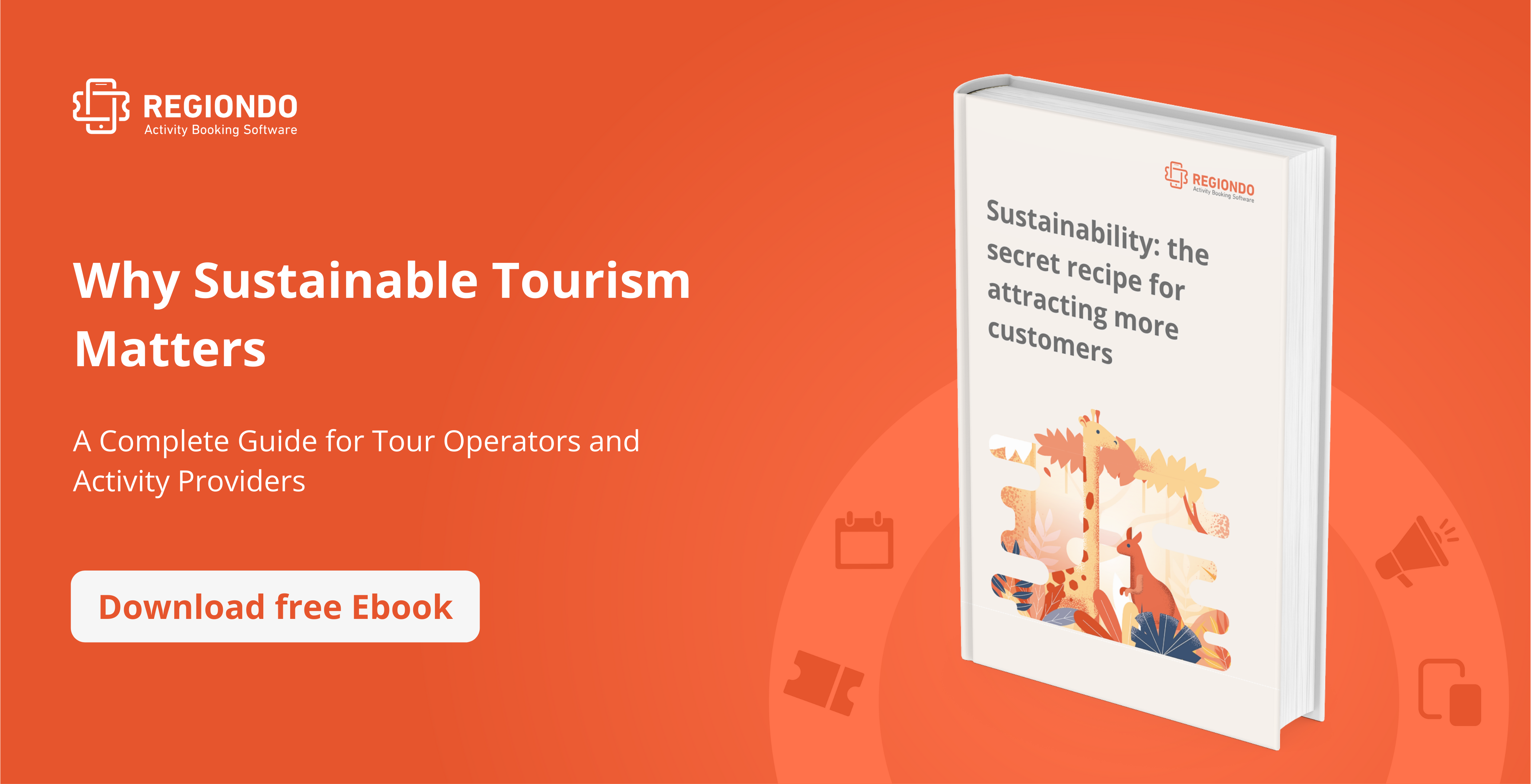
Tourism is undergoing a profound digital transformation, reshaping the way services are delivered and experienced. The emergence of smart technology in accommodations, such as IoT-enabled rooms, and the use of big data for personalized recommendations are examples of how technology is becoming an integral part of the travel experience itself. This integration presents an opportunity for providers to deliver unique value to their customers and stand out in a competitive marketplace.
The pivotal role of booking systems

Booking systems are at the heart of this digital revolution and have quickly become a critical interface between the supplier and the customer. Not surprisingly, 89% of respondents to our survey use them to easily manage bookings, sell tickets online and connect with leading OTAs. Let’s explore the top 5 features they find most beneficial in a booking system:
Key features of booking systems

- Online payments: Offering secure, versatile online payment options is essential. This includes accepting multiple payment methods such as credit cards, PayPal, and digital wallets to serve a global customer base.
- Dashboard calendar: An intuitive dashboard calendar facilitates the management of bookings, availability, and scheduling. This feature enables suppliers to stay organized and respond quickly to changes, minimizing overbooking and scheduling conflicts.
- Booking widget: A customizable booking widget on the supplier’s website allows the booking process to be seamlessly integrated into the user experience. This results in a smoother booking flow and encourages more direct bookings.
- Channel manager: With the proliferation of distribution channels, a channel manager becomes vital. It ensures real-time synchronization of availability across multiple platforms such as OTAs, the official website of the supplier and other portals, reducing the risk of overbooking and facilitating inventory management.
- Booking management: Efficient booking management includes features such as easy cancellations or changes, automated confirmation and reminder emails, and customer management tools. This improves the overall customer experience and operational efficiency.
As the leading booking system provider in Europe, Regiondo has been at the forefront of incorporating these essential features. The platform offers a comprehensive solution that not only addresses the basic needs of booking and payment processing, but also provides advanced tools such as resource management , marketing integrations and detailed analytics. This makes Regiondo a model for digital transformation in the travel industry, demonstrating how technology can facilitate business operations and enhance the customer journey. To learn more about how Regiondo can help your business thrive, book a demo with one of our consultants.

In 2024, the sales channels of the travel industry will continue to evolve: understanding how to balance them is key to maximizing reach and profitability.
Offline vs online dynamics
The travel industry has historically relied on a mix of offline and online distribution channels. While online channels have seen tremendous growth, especially in the wake of digital transformation, offline channels such as in-person travel agents and booking offices still play an important role, especially for certain markets and demographics.

Current balance: In our Trends 2024 survey, we asked participants to break down the share of sales they make online vs. offline. The weighted average shows that 56.67% of tickets are sold through digital channels, while the rest (43.33%) are sold through phone, in-person, and other offline channels. In summary, the current landscape is skewed towards online, driven by the convenience, accessibility and wide range of options it offers. However, offline continues to thrive by catering to customers who value personal interaction and customized service.
Future trends: The future points to a more integrated approach, with a growing emphasis on phygital experiences that blend physical and digital elements. For example, interactive digital displays in physical travel agencies could increase customer engagement.
Another issue we wanted our experts to weigh is their relationship with distribution partners. Specifically, we asked them to disclose the number of online bookings they receive through direct channels (website, official social media pages, emails) versus those received through resellers. The results paint a clear picture, with a weighted average of only 33% of tickets sold through intermediaries. But let’s take a closer look at the pros and cons of these two types of channels:
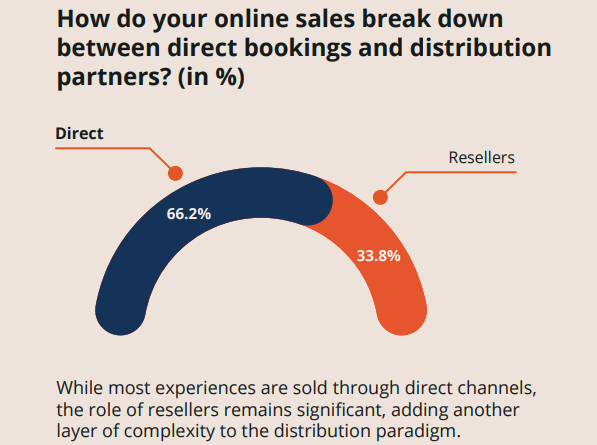
Direct Bookings
- Pros: Higher margins, direct relationship with customers, greater control over customer experience.
- Cons: In order to attract direct bookings, you need to invest in marketing, technology and a strong brand presence.
- Pros: Extended reach, especially in markets where your brand has less presence; reduced marketing costs.
- Cons: Lower margins due to commissions, less control over the customer experience.
Leveraging Both
In our humble opinion, the key is to find the right balance. Leverage resellers to reach new markets and demographics, while building a robust direct booking strategy to drive customer loyalty and brand identity.
The Role of OTAs (Online Travel Agencies)
Among the various resellers, OTAs have become a dominant force in the travel booking landscape. As you know, they offer exposure to a huge audience, but at the cost of commissions. Speaking of which, we asked our survey participants about the average percentage of commission they pay to OTAs on each order. The results are interesting: 1 in 3 respondents said they don’t work with OTAs at all to save on these costs. As for the rest, the vast majority pay fees ranging from 20% to 29% of the price of their tickets.
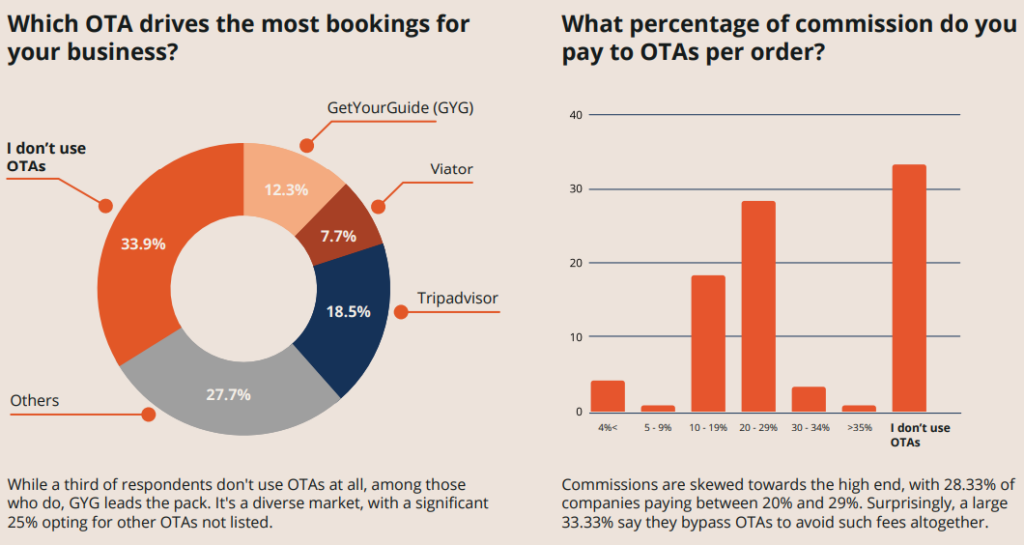
We also asked our industry experts to identify which OTAs drive the most bookings for them from a selection of the most popular. Their response highlights how fragmented the digital distribution landscape can be, as a quarter of respondents said the resellers they have the most lucrative relationships with are not on our list. Still, when it comes to the top dogs, this is the podium:
- GetYourGuide
- TripAdvisor
Love ’em or hate ’em, OTAs continue to be a mainstay of the leisure industry, which is why we want to draw your attention to three important key elements that will help you get the most out of the commissions you pay:
- Perform a cost/benefit analysis: As we have seen, commissions can vary widely, typically ranging from 15% to 30%. It’s important to understand the cost/benefit ratio and how it impacts overall profitability.
- Negotiate: Negotiate better rates as your business grows, bundle services to increase the value of each booking, and use OTAs for visibility while encouraging repeat bookings through your direct channels.
- Follow these best practices: Ensure your listings are up-to-date and engaging, take advantage of OTA marketing tools and analytics, and tap into OTA platforms for market insights and trend analysis.

As the travel landscape continues to evolve with ever-changing customer preferences, it can be difficult for tour and activity providers to understand the most effective marketing strategies to employ. So we asked our experts to list the marketing channels that drive more bookings for their businesses. Here are their top 5:
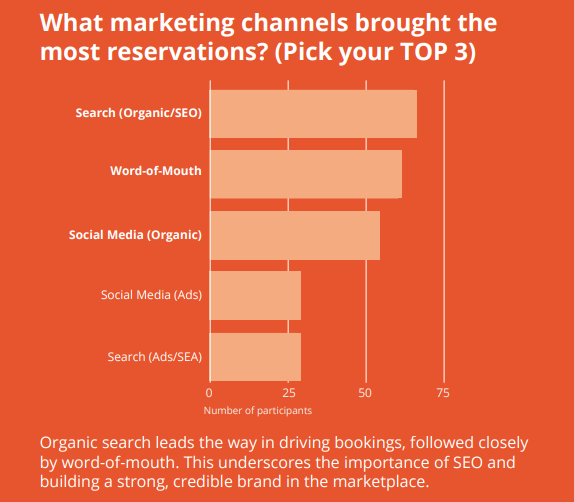
SEO (Search Engine Optimization)
SEO (66% of respondents) continues to be a cornerstone of digital marketing strategies. It’s critical for increasing visibility in search engine results, driving organic traffic and building online authority.
- Key areas of focus: Local SEO is especially important for travel businesses to ensure they appear in searches for local attractions and services. Optimizing for mobile and voice search is also essential as these trends continue to grow.
- Content marketing: Creating valuable, engaging content that answers potential travelers’ questions can significantly improve search rankings and drive organic traffic.
Word of mouth
Word of mouth (61% of respondents) is a powerful tool, especially in the digital age. It can happen organically or be encouraged through referral programs.
- Leverage social proof: Encourage happy customers to share their experiences online, whether through social media, blogs or video content.
- Referral programs: Implementing referral incentives can motivate past customers to spread the word to friends and family.
Social media (Organic)
Organic social media marketing (54% of respondents) is about building community and engaging authentically with your audience.
- Platform-specific strategies: Tailor content to the strengths and audience of each platform, whether it’s visually-driven Instagram, conversation-centric X (previously known as Twitter), or the increasingly popular TikTok.
- Engagement and community building: Posting regularly, interacting with followers, and creating shareable content are key strategies.
Social media and Search ads
Paid social media and search advertising (29% of respondents) is a critical component of a comprehensive marketing strategy.
- Targeted campaigns: Use the granular targeting options available on platforms like Facebook, Instagram, and Google to reach specific demographics, interests, and behaviors.
- Retargeting: Implement retargeting campaigns to capture prospects who have shown interest but haven’t yet booked.
Online reviews (25% of respondents) continue to have a significant impact on consumer decisions in the travel industry.
- Online reputation management: Actively manage your presence on review platforms such as TripAdvisor, Google Reviews and Yelp.
But how much should you spend on marketing? As a point of reference, the estimated average marketing budget for respondents to our survey is €972.82 per month. The key, however, is to take a balanced (no pun intended) approach. While it’s tempting to focus on the latest trends, it’s more important to allocate resources across channels based on their performance and your target audience. We recommend regularly reviewing and adjusting your marketing budget based on analytics and ROI. This may mean shifting funds from underperforming campaigns to those that are delivering better results, or investing in new platforms and technologies.

As we look ahead to 2024, the travel industry is at a pivotal crossroads, marked by rapid technological advances, changing consumer behavior and evolving market dynamics.
Key points:
- Digital transformation: The integration of technology into the travel experience, particularly through advanced booking systems such as Regiondo, is fundamental. The adoption of digital tools and features such as online payments, dashboard calendars, and AI-driven personalization can significantly improve efficiency and customer experience.
- Sales channels: A balanced approach between offline and online distribution channels, and between direct bookings and resellers (primarily OTAs), is critical for long-term success.
- Marketing strategies: The marketing landscape of 2024 will require a mix of advanced digital marketing, content marketing through storytelling, strategic influencer partnerships, local SEO optimization, and well-planned budget allocation across channels.
Looking ahead, the call to action for travel and activity providers is clear: adapt, innovate and thrive. Embrace digital transformation with open arms, understanding that technology is not just a tool, but a bridge to connect with and better serve your customers. Align your sales and marketing strategies to leverage multiple channels and respond to the changing needs and habits of travelers. Most importantly, stay attuned to your audience’s preferences and values to ensure your offerings resonate with their desire for unique, sustainable and culturally rich experiences.
The future of travel is bright and full of possibilities. Let’s embark on this journey together, innovating and evolving to create memorable experiences for tourists around the world.
Related Articles
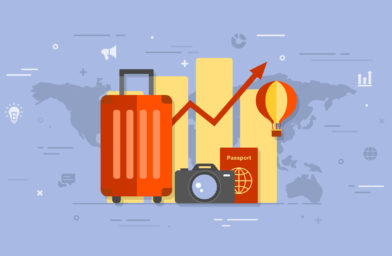
Stay updated with Regiondo by signing up for our Newsletter

Get a personalized demo or create your free account now
Take your business to the next level with Regiondo - it's free to get started and you don't need a credit card.
2024 travel trends: what the experts predict
A look at the travel trends and destinations set to drive the tourism industry
- Newsletter sign up Newsletter
The year of 'surprise travel'?
- Lonely Planet's Best in Travel
Set-jetting continues to take off
Music tourism 'accelerates', palate-led holidays and uk getaways, cultural exploration and quaint cities, journeys with 'a sense of purpose'.
- Michelin Guide 'keys'
Fodor's 2024 'No List'
Sign up to The Week's Travel newsletter for destination guides and the latest trends.

'More and more surprise trip companies have popped up'
"Surprise travel" may become the big trend of 2024, said David Farley on the BBC . A survey of 27,000 travellers in 33 countries by Booking.com found that 52% are "keen" to book a surprise trip where "everything down to the destination is unknown until arrival". In the last decade, "more and more surprise trip companies have popped up", Farley added, and the "element of mystery" is "tempting travellers to seek a new way to see the world".
Mongolia and Nairobi included in Lonely Planet's Best in Travel

Mongolia is tipped as one of the top countries to visit
In its "Best in Travel" report for 2024, Lonely Planet has predicted the world's top 50 countries, regions, cities, best value and most sustainable destinations. Looking at the top places to "unwind, connect, eat, learn and journey", there's "plenty to pack in" over the next year. Destinations highlighted in the report include Mongolia (country), Western Balkans' Trans Dinarica Cycling Route (region), Nairobi in Kenya (city), Spain (sustainable) and The Midwest, USA (best value).
Subscribe to The Week
Escape your echo chamber. Get the facts behind the news, plus analysis from multiple perspectives.

Sign up for The Week's Free Newsletters
From our morning news briefing to a weekly Good News Newsletter, get the best of The Week delivered directly to your inbox.

The new season of 'Emily in Paris' will inspire travel to the French capital
Travellers turning to their TV sets and movie screens for inspiration "shows no signs of stopping in 2024", said Expedia Group . In its "Unpack '24: The Trends in Travel" survey, more than half of travellers have researched or booked a trip to a destination "after seeing it on a TV show or movie", and one in four admit that TV shows and films "are even more influential on their travel plans than they were before". In fact, travellers say TV shows influence their travel decisions more than Instagram, TikTok and podcasts.
In its "set-jetting forecast", the group predicts the "entertainment-inspired destinations" tourists will be heading to in 2024. The top picks include Thailand, inspired by "The White Lotus" season three; Romania, inspired by "Wednesday" season two; Malta, inspired by the new "Gladiator 2" film; and Paris, inspired by "Emily in Paris" season four.

Taylor Swift performs at Lumen Field, Seattle, on the Eras Tour
Travel technology company Amadeus has released its fourth travel trends report. Using the latest data and industry-leading insight, travel in 2024 will be dominated by five trends: music tourism, business class fares unbundled, influencers becoming agents, artificial intelligence matures, and electric vertical take-off and landing (eVTOL) aircraft prepare for take-off.
Music tourism is a trend that's expected to "accelerate" in 2024, Amadeus said. After the social isolation of the pandemic, when bands and musical artists were "grounded for months", a "boom" in concerts and festivals in 2023 tapped into "a desire for connection". When Taylor Swift announced her Asia Pacific tour dates for 2024, Amadeus research suggested that Swift's concert dates in Australia, Singapore and Japan had a "significant impact on travel searches and booking volumes to the countries".

Lucknam Park Hotel & Spa in Wiltshire is part of the PoB Hotels collection
PoB Hotels ' "Cultivating Luxury" market trends report found that palate-led holidays and increased domestic getaways in the UK were among the key findings for 2024. Food and drink "undeniably take centre stage" in "capturing the attention" of domestic travellers, commanding an impressive 82% of their interests. A significant 54% of affluent high net worth individuals (HNWIs) plan to enjoy "three or more" leisure holidays within the UK in the upcoming year, reflecting a "notable increase on the previous 12 months". And a considerable 27% of affluent/HNW travellers anticipate taking UK trips "lasting three or more nights" in the coming year.

Bydgoszcz in Poland is one of the 'quaint cities' attracting interest
"Cultural exploration" will "more than ever" be a priority for travellers, Skyscanner said in its 2024 travel trends report. Expect "gig trippers" to jet off to see their favourite artists and "budget bougie foodies" to seek out the very best food experiences. When it comes to the destinations that are whetting would-be tourists' appetites, the metasearch engine and travel agency has seen an increase in searches for "quaint cities" such as Vigo in Spain (+1,235%) and Bydgoszcz in Poland (+313%). Meanwhile, the cost-of-living crisis remains "top of mind" with Skyscanner's "Everywhere" search tool being the "top search destination for travellers globally".

'Off-grid' Peru is on Black Tomato's 2024 destination hotlist
The founders of luxury travel company Black Tomato predict that travellers will be looking to journey with "a sense of purpose" in 2024. With ever increasing demands on time, and the desire to make travel truly count, travellers want to create "positive and lasting change" – not only in the destinations they visit, but in their own lives.
"What we've uncovered," said Black Tomato, is that the feeling a trip ultimately evokes "greatly informs the destination booked". For groups "craving togetherness", journeys which "strengthen bonds and connection" are "prioritised". Black Tomato has picked out "off-grid" Peru, Morocco's Tangiers, the Mitre Peninsula in remotest Argentine Patagonia, and New Zealand's waterways on its 2024 destination hotlist.
The new Michelin Guide 'keys'

Which hotels will get a Michelin key?
The Michelin Guide will award hotels with "keys" as part of a "new rating system" launching in 2024, said the Visit California PR Pulse Report. The system will be aimed at recognising hotels based on factors including "location, design, service, uniqueness and value". As it does for restaurants, the guide said it intends to independently recommend hotels that "constitute true destinations" and will propose a new selection of more than "5,000 remarkable hotels in 120 countries".

Venice is one of the destinations that has been impacted by overtourism
Most travel experts recommend places to go in their annual reports, but Fodor's has a "No List" of nine regions to "reconsider" in 2024. The travel guide company said it's not a "round-up of spots we revile", it's a "declaration of places we revere". However, the "frenzied admiration", and "incessant need to experience them", are "not sustainable".
The 2024 No List focuses on three main areas of tourist impact: overtourism, rubbish production, and water quality and sufficiency. For overtourism, Venice in Italy, Athens in Greece, and Mount Fuji in Japan are highlighted. Rubbish production no-gos include San Gabriel Mountains National Monument in California, Ha Long Bay in Vietnam, and the Atacama Desert in Chile. While water quality and sufficiency has impacted Lake Superior in North America, the Ganges River in India, and Koh Samui in Thailand.
Sign up for Today's Best Articles in your inbox
A free daily email with the biggest news stories of the day – and the best features from TheWeek.com

Speed Read Allegations by 16 women include claims the world-famous magician drugged them before having sex with them
By Arion McNicoll, The Week UK Published 16 May 24

The Explainer Austerity, Brexit, the Covid-19 pandemic and high inflation have led to one of Europe's worst rates of food insecurity
By Harriet Marsden, The Week UK Published 16 May 24

Today's Newspapers A roundup of the headlines from the US front pages
By The Week Staff Published 16 May 24

In the Spotlight Jerry Seinfeld has been in the news for his recent remarks, but political correctness has long been criticized for interfering with jokes
By Anya Jaremko-Greenwold, The Week US Published 16 May 24

The Week Recommends Your breath will leap right off the edge of those steep, steep cliffs
By Catherine Garcia, The Week US Published 16 May 24

feature American Customer Satisfaction Index's most recent ranking of our nation's fast food restaurants
By The Week Staff Published 13 May 24

The Week Recommends From Arches to Zion, you should wander them all
By Catherine Garcia, The Week US Published 10 May 24

Speed Read The organization is rebranding, citing inclusivity
By Peter Weber, The Week US Published 8 May 24

In the spotlight Beef between Californian rapper and Canadian hip-hop star goes 'nuclear' with diss tracks full of serious allegations
By Harriet Marsden, The Week UK Published 8 May 24

The Week Recommends Have beach time in the Dominican Republic or a spa day in Saint-Tropez
By Catherine Garcia, The Week US Published 2 May 24

The Week Recommends Go your own way
By Catherine Garcia, The Week US Published 30 April 24
- Contact Future's experts
- Terms and Conditions
- Privacy Policy
- Cookie Policy
- Advertise With Us
The Week is part of Future plc, an international media group and leading digital publisher. Visit our corporate site . © Future US, Inc. Full 7th Floor, 130 West 42nd Street, New York, NY 10036.
- SOFTWARE CATEGORIES
- FOR REMOTE WORK
- Research Center
10 Future Business Travel Trends & Predictions for 2024 and Beyond

Corporate travel remains a crucial aspect of a business. Despite advancements in technology, business travel trends indicate that there’s no substitute for face-to-face interactions. Travel can also support business initiatives for networking, skills development, and recruitment. However, the presence of COVID-19 has thrown a wedge at some of those travel plans, which prompts the importance of risk assessments and possible changes in future travels.
In this business travel forecast, you can read all about the direction the industry is moving in. We’ve also included some business travel statistics so you can make data-driven decisions in your company’s business practices.

Business Travel Trends Table of Contents
- Business is almost always mixed with pleasure
- Unconventional accommodations are in
- Self-booking is becoming the norm
- More flexible corporate travel policies
- Technology continues to revolutionize corporate travel
- The rise of AI, virtual reality, and intelligent assistants
- Blockchain: the future of business travel
- Business travel as a perk
- Slower years for corporate travel and business tourism
- New travel markets are emerging
The business travel industry experienced a decline of 52% during the early months of the COVID-19 pandemic, but with the recent rollout of vaccines, business travel spending is expected to rise to $842 billion in 2021, which accounts for a 21% increase (Reuters, 2021). The majority of businesses have even reported that they are considering resuming their corporate travel plans for 2021, although there are no definite plans yet (GBTA, 2021).
Source: GBTA
One of the major changes to anticipate is the rise of a new type of corporate traveler. Members of Generation Z are taking over the workplace, and predictions point to this age bracket making up around 40% of the workforce by 2021 (Connecteam, 2020). At the end of 2024, business travel spending is expected to reach $1.4 trillion and make a full recovery from the pandemic in the succeeding year (Reuters, 2021). By this time, millennials and Gen Z-ers will be doing much of the traveling given their respective shares in the labor force.
This shift in the demographics of corporate travelers has influenced the global business travel forecast in the coming years. Many business travel trends center around technology and its abilities to enable self-service and make travel seamless.
1. Business is almost always mixed with pleasure
The rise of bleisure travel proves to be one of the most significant outcomes of the demographic shift in corporate travel, and this trend is expected to continue in the midst of COVID-19 vaccinations. With the workforce becoming younger, more employees are looking to do more than work during their trips away from the office.
Although 92% of organizations suspended business travel during the early months of the pandemic, pre-pandemic figures suggest that 90% of millennial business travelers added components of leisure to their affairs (National Geographic, 2020). This could very well occur within 2021 as COVID-19 vaccines are now available.
Bleisure travelers go on these trips once every two to three months. More than half of international business travelers plan to extend business trips to accommodate leisure activities at their destination.
Companies in the tourism industry can capitalize on this trend by focusing their marketing campaigns on local tourist attractions and events. If you’re more concerned of your employees not doing enough business, though, time tracking software can help ensure sufficient productivity.
Key takeaways:
- More employees are taking bleisure trips.
- Bleisure travelers go on trips at least every quarter.
- Business travelers are also willing to extend business trips for leisure activities.
2. Unconventional accommodations are in
Another business travel trend influenced by the new generation of corporate travelers is the growing popularity of unconventional accommodations. Business travelers have become more open to considering staying somewhere other than traditional chain hotels. More are opting to stay in apartments and other accommodations that have a more homey feel.
Smaller boutique hotels and home-like accommodations, like those offered by Airbnb, enjoy increased popularity among business travelers today. For instance, over 70% of millennial corporate travelers had stayed in a vacation rental during business trips (American Express, 2019).
These non-traditional accommodations provide opportunities for exploring the destination in new ways. More travelers also stay further away from the city center, as comfort and proximity to leisure activities are prioritized.

- More business travelers opt to stay in home-like accommodations.
- Small boutique hotels and home rentals have the edge over traditional chain hotels.
- Additionally, more corporate travelers prioritize comfort and proximity to leisure activities.
3. Self-booking is becoming the norm
More corporate travelers opt to book travel options and accommodations on their own. According to recent surveys, 68% of employees book business travel through tools not approved by the company instead of seeking the services of a travel agent (Expedia Group, 2021). After all, there are numerous self-booking options that business professionals can leverage. This trend towards self-booking may also be another offshoot of the generational shift in corporate travelers. After all, millennials prefer self-booking when they travel so that they can find flights and accommodations that meet their preferences.
In some cases, corporations push for self-enablement and provide tools that help employees resolve issues. When these self-service tools fail, though, corporate travelers will continue to rely on customer service from an agent. This is particularly true when emergencies arise, like in cases of canceled flights. Corporate travelers also tend to want to rely on a human for support in more complex issues like visas.
- Business travelers, especially millennials, prefer the self-booking process.
- However, business travelers will continue to rely on human support for complex issues and travel emergencies.
Most Popular Online Booking Software
Here are some of the best online booking software that you can choose from:
- YouCanBook.me is an online booking software that connects customer bookings right into your Google or Microsoft calendars. It also allows you to personalize your booking page and display your availability for multiple locations.
- Acuity Scheduling provides a user-friendly online booking platform to help your clients self-book their appointments. It lets you create branded and customized confirmations, reminders, and follow-ups to drive more client bookings.
- Bookeo is an industry-leading online booking software perfect for service providers, schools, and tour companies. It provides you with advanced marketing tools to help you maximize profit.
- SimplyBook.me lets you build your own personalized and mobile-optimized booking website. It allows you to integrate the system with your existing site or with your Facebook and Instagram pages.
- Checkfront easily handles customer bookings in a unified toolset. With its advanced rule system, it lets you enforce and set your own booking rules.
4. More flexible corporate travel policies
When was the last time you looked at your company’s corporate travel policy? There’s a good chance that some of these policies need tweaking. Recent business travel trends indicate that more corporate travelers are “going rogue (RateGain, 2019).” This means travelers are now more likely to go outside employer-approved channels when booking properties and transportation for their trips.
Corporate travelers need a booking process that provides better availability and allows them to choose from more property and rate options. Combined with emerging preferences for unconventional accommodations, the need for more varied booking options pushes corporate travel policies to become more flexible.
The good news is that companies that offer a plethora of travel options enjoy higher adoption rates for their corporate travel programs (TripActions, 2019). Allowing employees to make choices that align with their needs and preferences encourages a culture of transparency and reinforces trust between employers and employees.
Worried about reining in travel spending while empowering business travelers to make their own choices? Technology now allows companies to adopt a dynamic travel policy. A dynamic business travel policy adjusts according to available options at the time of booking. This way, business travelers will still be able to make their own choices while complying with company policies.
As far as flexibility is concerned, video meetings and teleconferencing have also become alternatives during the pandemic, with 31% of employees stating that remote setups are just as effective as business travel (Forbes, 2020).
Why did you book accommodations outside of approved channels?
Source: Expedia, 2018
- More corporate travelers are going rogue, i.e., not using employer-approved channels, during the booking process.
- Corporate travel policies are becoming more flexible.
- Dynamic travel policies also have a higher adoption rate.
5. Technology continues to revolutionize corporate travel
Technology plays a central role in the global business travel forecast. Mobile technology currently accounts for 39% of hotel bookings and 22% of airfare bookings (FCM Travel Solutions, 2019). These numbers will probably grow with the upcoming upgrade to 5G wireless internet. Also, once the COVID-19 travel restrictions ease up, this technological trend will likely continue.
International business travelers can expect to spend less time waiting in airport lines, thanks to facial recognition technology that speeds up immigration protocols and border control procedures. Other biometric technologies seeing increasing use at airports include fingerprint and retinal scanning.
Trip disruption technology (CWT, 2019) is also evolving to minimize the hassle caused by delayed flights and trains. Travel technology providers can now deliver real-time trip updates to travelers’ mobile devices. This way, business travelers can adjust their plans accordingly and minimize downtime.
Faster in-flight internet access is also in the works. Travel suppliers and mobile network operators are working together to bring high-speed internet into the cabin. With this technology, employees can stay productive even during long-haul flights .
Technology has also moved beyond airports and train stations to make business travel easier. Business travelers can now enjoy automated check-in and check-out processes. These technologies allow travelers to pick up their room key upon arriving at the hotel and head straight to their room. Centralized billing can save travelers from the hassle of having to compute expense costs separately.
- Upcoming upgrades to 5G wireless internet may result in more mobile bookings in the future.
- Facial recognition and biometric technologies will also reduce waiting time for international travelers.
- Trip disruption technology helps corporate travelers adjust to delays in the journey.
6. The rise of AI, virtual reality, and intelligent assistants
More advanced technologies like artificial intelligence (AI) and virtual reality are poised to bring more changes to the business travel industry. Travel suppliers can use these technologies to discover business travelers’ preferences and take advantage of upselling opportunities. Virtual reality is also predicted to enable personalization, allowing guests to adjust rooms based on their taste (FCM Travel Solutions, 2019).
The coming years also pose many possibilities for intelligent assistants like Siri, Cortana, and Google Now. These assistants are able to handle more complex tasks (Wishup, 2019), like provide updates to itineraries during disruptions and recommend services. All these technologies will greatly benefit business travelers looking to maximize their time during the journey.
Want to learn more about artificial intelligence? Here are some artificial intelligence statistics you may find interesting.
- Artificial intelligence and virtual reality can be used to discover travelers’ preferences.
- Siri and Cortana will soon be able to provide itinerary updates.
7. Blockchain: the future of business travel
Blockchain is also expected to improve security for corporate travelers by 2021. Blockchain’s built-in security protocols make it the perfect technology for making travel as convenient and seamless as possible (Revfine, 2020).
The technology makes data storage and access easier. The constant availability of information is crucial since the travel industry relies on the information exchange between companies. For instance, travel agents pass customer information to hotels and airlines.
Blockchain makes it possible to collect every bit of information involved in the travel process (Amadeus, 2019) – from traveler preferences to flight prices and hotel rates – into a file that’s duplicated across multiple computers. And since the technology decentralizes data and arranges it into permanent blocks, blockchain offers more security. Travel information is always available and safe from user errors or cybersecurity attacks.
Businesses in the tourism and hospitality industry can also take advantage of blockchain technology for luggage tracking, identification services, and customer loyalty schemes.
Outside the realm of travel, blockchain can even be leveraged for other complex tasks like COVID-19 vaccine distribution (Mobi Health News, 2020). Technology this flexible will probably have niftier applications for business travel in the near future.
Cryptocurrencies such as Bitcoin may also soon be accepted as payments by travel companies. If you’d like to learn more about cryptocurrencies, you can check out our guide and FAQs on Bitcoin .
- Blockchain can greatly improve the security of travel information
- Blockchain can also ensure that every bit of travel information is always accessible.
- Likewise, this technology can ease luggage tracking and support customer loyalty plans.
8. Business travel is a perk
Another important aspect of the business travel forecast is the fact that most employees now see corporate travel as a perk (TripActions, 2019). According to surveys, international business travelers consider travel as valuable to professional and personal growth.
Making up the largest segment of the workforce, millennials are also more willing to travel, as they consider it an enriching experience. Similarly, employees who travel often feel more empowered and engaged. Travel can even help improve confidence and interpersonal relationship skills.
More companies are acknowledging these effects and seeing the link between business travel. A robust, dynamic corporate travel program can be used as a tool to encourage employee engagement , improve employee retention, and drive organizational growth.

- Most employees consider corporate travel a perk.
- Millennials consider business travel an enriching experience.
- Frequent business travelers also feel more empowered and engaged.
9. Slower years for corporate travel and business tourism
Business travel growth can finally begin after a serious downturn in 2020 due to the pandemic (Reuters, 2021). And the industry is even expected to make a full recovery. However, certain practices in the age of COVID-19, such as video conferencing and other remote alternatives, will likely stick since 31% of organizations find them just as effective as actual trips (Forbes, 2020) with much lower costs.
In fact, 43% of business travelers already expect that they will travel less post-pandemic (Forbes, 2020). Besides financial reasons, the pandemic has ravaged economies and not all countries have shown an adequate response to the continuing spread of the coronavirus. Furthermore, the rollout of vaccines is concentrated in developed nations (BMJ, 2020), thus development projects in developing nations would likely be canceled or at least met with stiff travel restrictions.
As such, 61% of employees would rather leverage video conferencing platforms than physically venture out to other lands (Forbes, 2020).
- Global business travel spending is growing, but not as much as during previous years.
- Political tensions and trade issues have also contributed to this slower growth.
- Improvements in political issues will support weakening travel prices.
10. New travel markets are emerging
New countries are taking bigger shares of the market in business travel spending. More corporate travelers are flying to India and Indonesia, with these countries showing 11.3% and 8.7% in market growth, respectively. Surpassing South Korea in business travel spending in 2017, India is expected to break into the top 5 business travel markets by 2022 (GBTA, 2018). A report suggests that Asia has become the world’s largest business travel market (Hospitalitynet, 2019), even though the United States outpaces everyone in spending by a wide margin (WTTC, 2021).
Sweden and Norway, with respective market growth rates of 6.8% and 6.6 %, are quickly becoming popular business travel destinations as well (GBTA, 2018). China, however, will continue to dominate the business travel market, with a projected annual business travel spend of $129 billion by 2022.
Source: WTTC 2021
- India and Indonesia are becoming popular business travel destinations.
- Moreover, India will most likely be in the top 5 business travel markets by 2022
- Despite new markets, China will continue to be the top business travel market in the next couple of years.
Take advantage of these business travel trends
Travel remains an important business aspect for many companies today. If your employees are frequent travelers, it will be helpful to stay ahead of these business travel trends. This way, you can prepare for these changes and adjust your corporate travel policy accordingly, especially with COVID-19 still looming.
Information in these trends is also useful to travel management companies and businesses in the hospitality and tourism industry. Hotel owners or rental car companies can use these travel trends to gain insights into their customer base. These trends also present an excellent opportunity to adopt new business practices.
Many of these travel trends center around technology. It definitely won’t hurt to look into new software and applications that will give you that technological edge.
Want to get cracking on modifying your current business processes? Check out our article on the benefits of using business process management software .
References:
- Amadeus (2019). The Future of Business Travel . Retrieved from Amadeus
- American Express (2019). Trends on Business Travel’s Biggest Generation: Millennials . Retrieved from American Express
- BMJ (2020). Covid-19: Many poor countries will see almost no vaccine next year, aid groups warn . Retrieved from BMJ
- Expedia Group (2021). Business Travel Trends: How TMCs are keeping up with the corporate traveler . Retrieved from Expedia Group
- FCM Travel Solutions (2019). Business Travel 2020: The Trends & Tech that will Shape the Future of our Industry . Retrieved from FCM Travel Solutions
- GBTA (2018). GBTA Forecasts Seven Percent Growth in Global Business Travel Spend, Potentially Signifying End to Era of Uncertainty . Retrieved from GBTA
- Mobi Health News (2020). Blockchain could be the key to vaccine distribution, says IBM . Retrieved from Mobi Health News
- Pundora, D. (2019). 30 Benefits of Hiring a Virtual Travel Assistant . Retrieved from Wishup
- RateGain (2019). Delivering Duty of Care in the Age of Corporate Rogue Travel . Retrieved from RateGain
- Regan, R. (2020). Everything You Need To Know About Generation Z In The Workplace in 2021 . Retrieved from Connecteam
- Reuters (2021). Global business travel to grow 21% in 2021, trade group forecasts . Retrieved from Reuters
- Revfine (2020). Blockchain Technology within the Travel Industry . Retrieved from Revfine
- Statista (2021). Business tourism spending of G20 countries in 2019 . Retrieved from Statista
- TripActions (2019). 7 Business Travel Trends to Watch in 2020 . Retrieved from TripActions
- Wallin, B. (2020). How the death of business travel will change your next vacation . Retrieved from National Geographic
- Wyman, O. (2020). How Videoconferencing And Covid-19 May Permanently Shrink The Business Travel Market . Retrieved from Forbes

By Jenny Chang
Jenny Chang is a senior writer specializing in SaaS and B2B software solutions. Her decision to focus on these two industries was spurred by their explosive growth in the last decade, much of it she attributes to the emergence of disruptive technologies and the quick adoption by businesses that were quick to recognize their values to their organizations. She has covered all the major developments in SaaS and B2B software solutions, from the introduction of massive ERPs to small business platforms to help startups on their way to success.
Related posts

The Future of B2B Business: Trends and Predictions

15 Key CRM Software Trends & Predictions for 2024 and Beyond

11 Ecommerce Software Trends for 2024: Future Forecasts & Predictions

10 VoIP Software Trends for 2024: Latest Predictions To Watch Out For

8 Business Intelligence Software Trends for 2024: Predictions You Should Be Thinking About

20 Current Augmented Reality Trends & Predictions for 2024 and Beyond

Best Social Media Management Tools in 2024

15 Best Document Management Systems of 2024

Pros & Cons of Genesys PureCloud: Analysis of a Top Call Center Software in 2024

Best Salesforce Products: Reviews of the Most Popular Services in 2024

15 Best Video Conferencing Software Examples for 2024

Top 10 Alternatives to Facebook Pages Manager: Leading Social Media Management Solutions in 2024

20 Best Payroll Software for Construction Business in 2024

What Is Survey Software in 2024? A Comprehensive Guide to Benefits, Features, Types, Pricing and More

Is Confluence The Best Tool For Teamwork Workspace On The Market?

20 Best Version Control Systems of 2024

Pros & Cons of EngageBay: Analysis of a Leading CRM Software

Top 10 Alternatives to AirWatch: Analysis of Leading IT Security Software Solutions

5 Most Affordable Accounting Software For Small & Medium Companies

Pros & Cons of PandaDoc: Analysis of Document Management Software
Leave a comment!
Add your comment below.
Be nice. Keep it clean. Stay on topic. No spam.
Why is FinancesOnline free?
FinancesOnline is available for free for all business professionals interested in an efficient way to find top-notch SaaS solutions. We are able to keep our service free of charge thanks to cooperation with some of the vendors, who are willing to pay us for traffic and sales opportunities provided by our website. Please note, that FinancesOnline lists all vendors, we’re not limited only to the ones that pay us, and all software providers have an equal opportunity to get featured in our rankings and comparisons, win awards, gather user reviews, all in our effort to give you reliable advice that will enable you to make well-informed purchase decisions.
EU Office: Grojecka 70/13 Warsaw, 02-359 Poland
US Office: 120 St James Ave Floor 6, Boston, MA 02116
- Add Your Product
- Research Team
- Terms of Use
- Privacy Policy
- Cookies Policy
- Scoring Methodology
- Do not sell my personal information
- Write For Us
- For Small Business
- Top Software
- Software reviews
- Software comparisons
- Software alternatives
Copyright © 2024 FinancesOnline. All B2B Directory Rights Reserved.

Business Travel Trends in 2024
The landscape of corporate travel in 2024 showcases a diverse dynamic, where the blend of leisure and work, the pursuit of sustainability and well-being , and generational impact are redefining the traditional concept of business travel. In this FCM Travel article, we unveil the key trends in corporate travel for 2024 .
Keep reading!
46% of workers aged 18 to 75 plan business travel
With nearly half of the workforce considering business travel, there is a significant engagement in the business realm. However, a generational gap is surprising: only 38% of Generation X workers, born between 1965 and 1980, have travel plans , marking a notable difference in the willingness to undertake business trips.
According to FCM Consulting's latest Quarterly Trend Report , major corporate airlines are projected to have seats offered in the first half of 2024 3% higher than the same period in 2019. Furthermore, 50% of these airlines are scheduled to surpass the number of seats offered in 2019. There has been an average increase of 9 percentage points compared to 2023 seats across all airlines, with North American flight companies showing aggressive growth for 2024.
A third of millennials and Gen Z add leisure days to business trips
Young professionals are leading a trend in corporate travel by integrating leisure into their work trips . Over 30% of millennials and Gen Z plan to extend their business trips to include leisure components, signaling a shift in the traditional perception of purely work-related travel. This trend is connected to the "bleisure" travel trend, as discussed below.
Additionally, 29% of Gen X and 27% of millennials plan to bring a friend along on their business trip , creating a perfect blend of professional and personal life even when away from home.
To gauge hotel occupancy levels, FCM Consulting's Quarterly Trend Report indicates an average of 68% per month in 2023. Corporate daily average rates have stabilized over the last six months. However, hotels are imposing rate increases of 3 to 8% for 2024.
Business meetings move away from major urban centers
The shift of corporate meetings and events to smaller, emerging locations implies a significant change in location preferences, representing an innovation in business travel. This change can be attributed, in part, to the high costs associated with business activities, such as meetings and conferences, in large cities. This drives companies to explore more cost-effective and accessible alternatives, including numerous emerging destinations.
In addition to the economic factor, these emerging destinations present fresh and novel opportunities for hosting events, with a diverse offering ranging from innovative spaces to unique cultural experiences . This not only allows companies to optimize their budgets but also provides the opportunity to explore new contexts and establish connections in less traditional but equally productive environments.
"Bleisure" travel is on the rise: combining work and leisure
The trend of integrating leisure into business trips, known as "bleisure", continues to gain traction. Travelers, especially younger ones, seek to maximize their time outside of work by combining work-related activities with enriching leisure experiences , extending their stays to enjoy attractive and fulfilling destinations.
Furthermore, this trend is enhanced when travelers decide to bring along a friend or family member. This companionship during leisure time complements the experience, allowing them to share moments of relaxation and discovery in fascinating destinations.
The practice of "bleisure" not only offers a more balanced perspective between work and leisure but also c ontributes to productivity and job satisfaction . By allowing employees to immerse themselves in different and enriching environments, a deeper connection with their work and surroundings is fostered, potentially leading to increased motivation and job commitment.
Sustainability is a growing focus
Certainly, another trend in corporate travel is related to sustainability. Environmental awareness is increasingly influencing travel decisions. Business travelers are opting for more sustainable options, from carbon-offset flights to environmentally-friendly accommodations , reflecting a greater concern for reducing their ecological footprint during travels. According to GBTA , 32% of business travellers across Europe chose to travel by train against 18% globally which is a very positive sign.
Sustainability is no longer merely associated with leisure tourism; it's now a priority in business travel,” says Justine Salvi, Country Leader, FCM Switzerland. “Many of our clients are aware of the environmental impact of their activities, and are looking to promote more sustainable practices among their employees during business travels. This includes choosing more sustainable modes of transportation and selecting hotels that implement policies and actions focused on environmental conservation.
This trend toward sustainability in corporate travel is not only a response to the growing concern for the environment but also a demonstration of corporate social responsibility .
Increased use of technology
Technology in business travel remains a fundamental driver in the evolution of corporate travel. “ From event planning to corporate travel management, there is an increased integration of technological solutions to simplify processes and enhance the traveler's experience, offering greater efficiency and connectivity,” says Justine Salvi. ”
For example, venue search platforms will help organizers efficiently find and compare event spaces based on their needs, eliminating the need for in-person visits for each option. Additionally, virtual and augmented reality are expected to be more widely used in business travel in 2024 for virtual site visits and training programs.
Lastly, artificial intelligence and machine learning will drive new business travel solutions, analyzing data to recommend hotels and predict flight delays.
Emerging markets are growing
Another trend in corporate travel is that emerging markets, particularly in Asia and Africa , are becoming increasingly attractive business destinations for companies and business travelers. This growth is particularly notable due to economic upturns and business development in these regions.
Companies from various industries are turning their attention to these rising markets, recognizing the growth potential and business opportunities they offer. Additionally, business travelers are showing a growing interest in exploring and understanding these emerging markets, as they provide unique cultural experiences and fruitful business collaboration opportunities.
Business travelers increasingly seek well-being
Lastly, the latest trend in corporate travel is that business travelers are increasingly seeking well-being, a trend accelerated by the impact of the pandemic. The global health crisis has emphasized the need to care for health, both physically and mentally , during business travels, leading travelers to prioritize options that promote their well-being.
Now more than ever, corporate travelers are seeking not only amenities in their accommodations but also services that promote health and balance. From hotels with gyms and spas to wellness programs, exercise facilities, and healthy eating options, a shift is occurring in how these trips are perceived.
In conclusion, these are the corporate travel trends for 2024. As you've seen, well-being, technology, and sustainability take center stage, and it's not hard to deduce that they will continue to shape business travels for many years to come.
Are you ready to elevate your corporate travel management? Talk to our team.
Traveling deliberately: Sabre analysis reveals three key trends in the new corporate travel landscape

- Agencies & OTAs
- Around the Industry
Corporate Travel
- Data & Analytics
- Developers & Startups
- General Blog
- Retailing & Merchandising
- Sabre Direct Pay
- Sustainability
- Travel Providers
Travel Trends
- Traveler Experience
- Modern Retailing
- Sabre Travel AI
- Google Partnership
- Sabre Labs & Research
- News & Views
- Customer Success
- Share on Facebook
- Share on Twitter
- Share on LinkedIn
Sabre has examined how new ways of working are impacting the world of business travel. Our data reveals that companies and travelers are taking a more deliberate approach to business travel than ever before.
A pivotal moment for business travel
A new era in corporate travel is emerging post-pandemic to adapt to new ways of working around the world. Globally, more than 40% of employees work from home or in a hybrid model. i And, companies are increasingly laser-focused on how travel can deliver maximum business value in this new ecosystem.
So now, more than ever, it’s essential to fully understand how the corporate travel environment is changing and what we, as an industry, must continue to focus on.
At this pivotal moment for business travel, Sabre has taken a dive into our own corporate travel data to identify some of the trends we are seeing in the business travel sphere; finding that corporate travelers are:
- Taking longer business trips to maximize the value of each journey
- Planning further ahead for business travel
- Taking more opportunities to upgrade to a higher cabin class
The shape of corporate travel recovery
What is clear is that business travel is coming back. But it’s coming back differently. We’re not where we were pre-pandemic in terms of the quantity of corporate travel, but the signs are positive. Industry surveys indicate that corporate demand is expected to be healthy in the coming quarters.
According to data analytics from ForwardKeys ii , for example, business travel recovery is set to overtake leisure bookings recovery this year. Meanwhile Deloitte research in the US and Europe suggests corporate travel may make a full recovery in 2024 iii . In addition, Delta Air Lines said its own recent corporate survey showed 93% of businesses expect to increase travel in the second half of 2023, with several of the so-far least-recovered sectors conveying optimism for increased travel. iv
More long-stay trips
Corporate travelers appear to be staying longer when they make a business trip.
The data indicates that they want to ensure they can make the most of their trip whenever they decide the time is right to make one. As a result, they appear to want to pack in as much as possible during their stay.
It seems corporate travelers are also thinking carefully about what is just right in terms of length of stay. They appear to want to take the optimal length of trip to fit in everything they can, without overstaying.
The sweet spot for most corporate travelers, according to our Sabre analysis, is a stay of two to three days, although there have also been slight increases in the four-to-seven-day stay ranges.
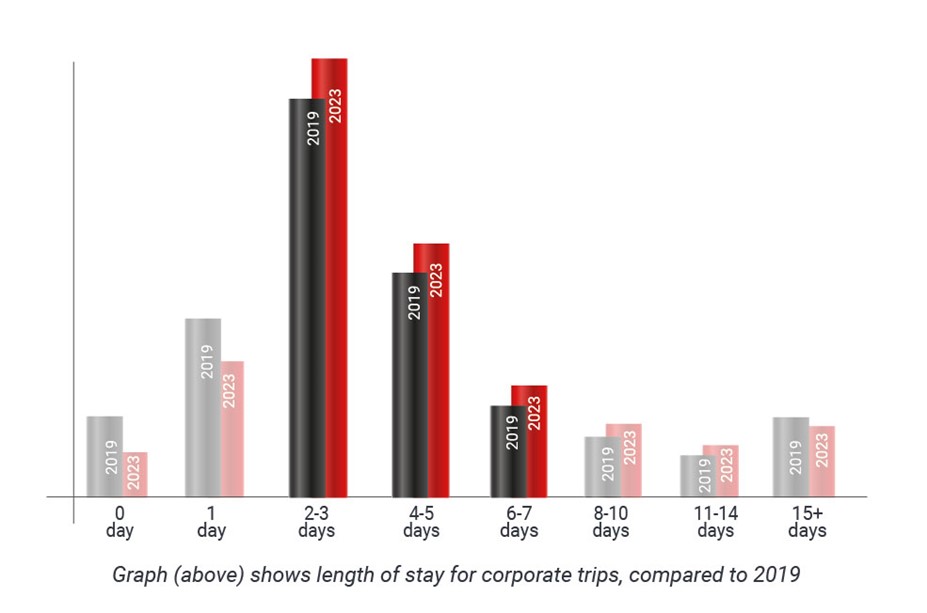
Planning ahead
During the pandemic, it was close to impossible to make travel plans, whether leisure or corporate.
However, our analysis indicates that corporations and their travelers are now making longer-term plans. They’re booking further out for business trips than they did pre-pandemic. That means they can book and put together their schedules much further in advance, really taking the time to consider what they want to get out of their trip, and giving themselves time to carefully plan.
Our analysis indicates that the majority of business trips are booked within the 15-to-30 -days-out timeframe, and there’s also been an increase in bookings made more than 31 days out.
Corporate travelers are feeling more confident about making plans further ahead of time, and are taking that lead-in time to make plans and set up meetings. Longer booking windows may also be down to regularity of trips to the office for remote workers, and to help corporations to get the best prices, and budget accordingly.
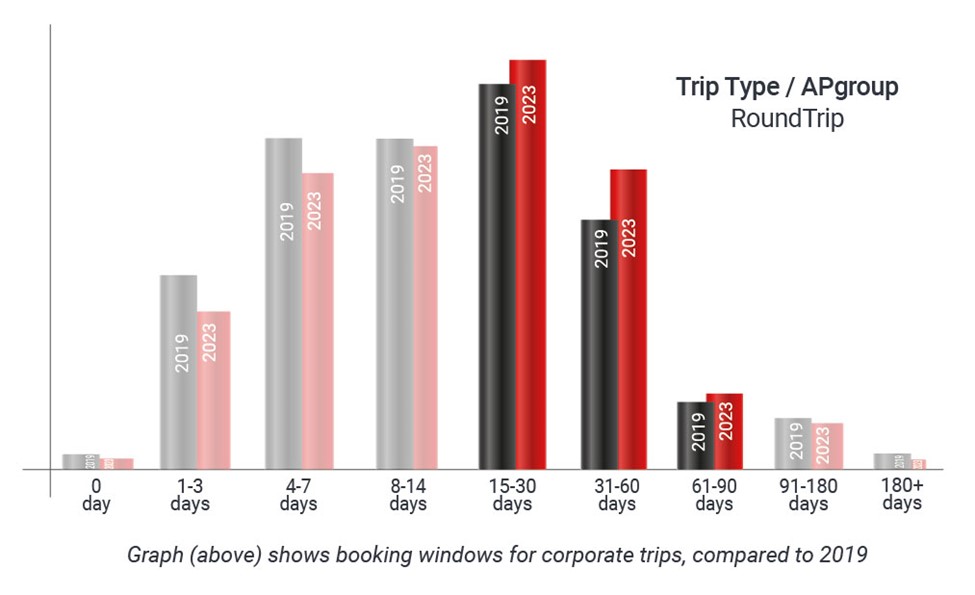
A higher class of travel
While the picture has remained pretty stable for domestic travel, when it comes to international trips, Travel Management Companies (TMCs) are noting a slightly higher share of premium fares.
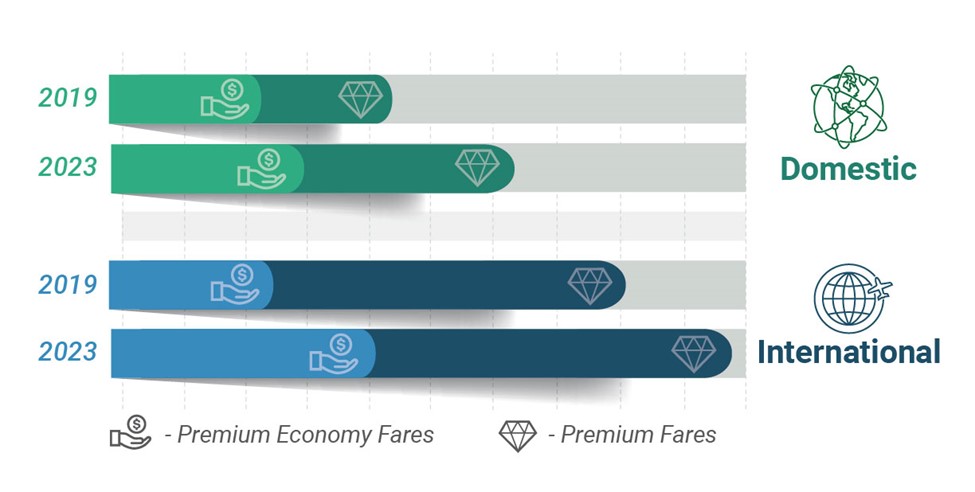
A shift in top corporate destinations
Top domestic corporate routes remain largely the same when comparing pre-pandemic with 2023. There’s still a strong focus on Australia, India, the US, and South Africa, with routes from Paris and mining routes in Australia gaining traffic. For international routes, the top route of London to Paris remains unchanged, with destinations from and to Singapore also doing well. Middle Eastern routes have gained strength while Nordic routes have also increased traffic. Unsurprisingly, given ongoing conflict, journeys to and from Russia are seeing a dip in corporate traffic, as are Chinese routes, where travel restrictions were slow to ease.
Considerations for the travel industry
The corporate travel industry is more dynamic and complex than ever. To stay relevant and flourish, corporate travel sellers and Travel Management Companies need to think differently, embrace change, and innovate with new solutions and strategies. They need the right technology to manage companies’ approaches to travel.
While business travelers are seeking a carefully considered corporate travel experience, the travel ecosystem has to make certain its own offerings are just as thoughtful and impactful if we are to help ensure that the corporate travel sector continues to recover, grow, and evolve in a way that maximizes revenue for the industry while creating true personalization and value for companies and their travelers.
Want to take this offline? Download the PDF version to read anytime.
[i] Forbes – Remote World Statistics and Trends in 2023
[ii TTR Weekly – Business Travel Recovery Speeds Up
[iii] HCA Mag – Corporate Travel to Make Full Recovery in 2024 Survey
[iv] https://www.businesstravelnews.com/Procurement/Delta-Seeing-Steady-Corp-Improvement
Related Post
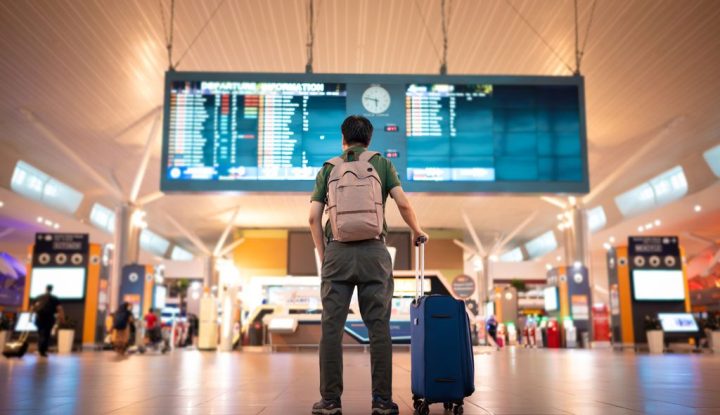
January 17, 2024
Sabre’s global team member survey reveals what really matters to travel industry insiders when making 2024 travel plans
Spending more, booking earlier, lost luggage fears and delayed revenge travel are some of the insights provided by Sabre’s global workforce in a recent survey about 2024 travel planning Ever wondered what travel industry experts consider...

March 24, 2023
Video: Driving value through automation | Episode 2
Welcome to the second episode of Explore The Future of Corporate Travel, a video series that dives into the main challenges business travel consultants are facing today and how TMC technology can address them. While there is...
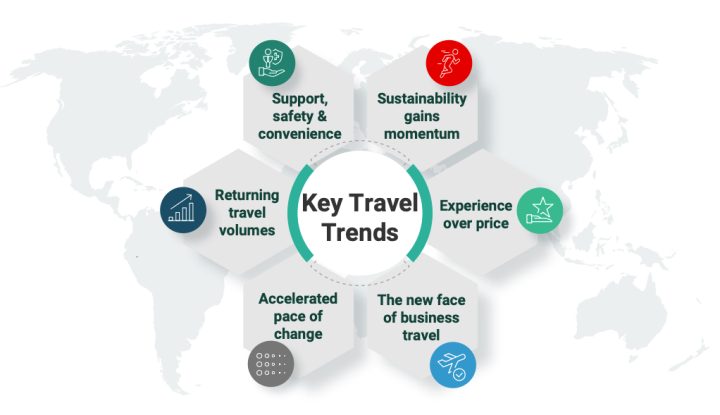
May 5, 2022
Mapping travels new normal: Sabre survey reveals summer 2022 travel trends
Vacation season is just around the corner. To glean insight into the travel industry recovery landscape as the busiest travel season of the year approaches, Sabre recently conducted both quantitative and qualitative surveys with airlines and...

March 16, 2022
Panel: The Future of Business and Corporate Travel and Technology’s Impact
Sabre SVP Global Agency Sales and Corporate Solutions Andy Finkelstein recently joined other travel industry leaders as part of an ITB Berlin Convention 2022 panel to discuss corporate travel and the role of technology. The full...

November 1, 2021
Flight Economics
by Lydia Webb & Peter Plutecki Not only do airlines need to fulfil the demand for personalization coming from their consumers, but they need to do it faster and better than their competition, in a more...
Unsupported browser detected, for a better experience please upate to a newer version of Internet Explorer.
The future of travel management strategy – trends that will impact travel and meetings thinking
"The future of our sector has never been more challenging, nor more fascinating. The potential to shine is palpable but knowing where to focus and what to do is the key. Not getting it right has consequences, more than ever before," explains Paul Tilstone and Caroline Strachan, the managing partners of Festive Road in a recently published insight into the macro changes affecting travel management in 2022 and beyond.
The specialist business travel consultancy has produced a broad, macroscopic view of the sector in The Macroscope Report , detailing key considerations for the future of travel management strategy, policy and service need. The report builds on its previous work on the Permissible Travel Framework and the Purposeful Travel Model with insights from travel managers and road warriors to offer a framework for the structure of future travel management visions.
The report identifies eight key factors that will continue to impact travel and meetings management thinking, regardless of other external impacts such as high inflation, talent shortages due to changing employee priorities and the dynamic changes in the fuel market. That is not to mention the challenges of shifting pandemic mindsets and the extended dangers of the Russia-Ukraine conflict.
"Never has there been a better time to take a step back, consider the 'why' of the travel and meeting programme itself and the value travel and meeting managers deliver to their businesses," highlights the report. "A blank piece of paper and a fresh perspective are probably two of the most important tools for successful travel management in the 2020s," Festive Road acknowledges.
MACRO #1 - Future of work: dispersed but not forgotten
Call this moment in time "The Great Resignation" or see it as an opportunity to drive "The Great Attraction", the workplace and employee attitudes have been disrupted, says the report. The way we work has changed and so has the way we meet and travel and for travel managers "these are unique times to reinforce the values of their programme in this new emerging world where a dispersed workforce is the new norm, or at least part of it," says Festive Road.
MACRO #2 - ESG at the purposeful core
Sustainability is most often defined as "meeting the needs of the present without compromising the ability of future generations to meet theirs, but the scientific data is telling us that we're overshooting our planetary means and tipping Mother Earth out of kilter, notes the report. "This critical decade represents a moment in time when organisations can take a proactive stance and balance people and plane alongside profit," says Festive Road.
MACRO #3 - it was always about the meeting
The full integration of travel and meetings has been a high ideal for years, yet few companies have reached a truly co-ordinated approach to the two sister categories, says the report. Travel and meetings "are intricately linked" acknowledges Festive Road, and the pandemic has triggered 'the meeting' to be achieved in a different way while traditional options were paused. New methods are not "just about saving money or reducing emissions," notes the consultancy, but "the most effective way to achieve meeting objectives". As such, the knock-on effect "is huge," it says and marks a new dawn: "the decade for a true strategic meetings and travel management programme has arrived."
MACRO #4 - the whole trip experience (at last)
When travel managers reinvent their travel programme with the traveller at the very core, extraordinary things can happen. Duty of care is met and travellers adhere to policy and preferred suppliers because they are the right fit, says the report. Travellers expectations have changed and new working habits have been formed. "It is truly time to connect all the critical elements that make up a business trip and put servicing the traveller as a programme priority," says Festive Road.
MACRO #5 - Dynamic content the true king
While content has been ascending the throne for many years, deep and rich content aggregation from multiple sources is now table stakes with he coronation moment close, says the report. "Dynamic content is the next evolution that will usher in personalisation, agile policy engines and a much better shopping and on-trip experience," says Festive Road.
MACRO #6 - API explosion brings buyer empowerment
The corporate travel ecosystem has never been so vast and diverse as it is today, and increasingly the marketplace is getting more complex as the three letters - API - become mainstream lexicon for travel managers, says the report. The Application Programming Interface is the route to broader and deeper content in the sector and there are already signs that "it's about to explode," recognises Festive Road.
MACRO #7 - Hail to the storytellers
Data is everywhere in travel. Every click of the traveller's mouse, keyboard tap, or swipe, generates data that can and should shape travel programme decisions, says the report, but our challenge to date has remained how to consolidate the huge amount of available. From identifying new travel patterns and opportunities to leverage tailored products, to re-defining the KPIs of travel management, "data underpins it all," says Festive Road. "We've entered the era of the analyst as the lockpicker, the storyteller through numbers. The data cruncher is cool," it adds.
MACRO #8 - take the lead or be directed
In the last two years the spotlight shone brightly on travel managers and they rose to the challenges that were set at a significant time of crisis for their companies and sector, but if the pandemic has taught us anything, it is that travel functions cannot operate as in island, says the report. "In a world that being an 'operational doer' may no longer be enough, travel managers have the opportunity to take a step back, be discerning in the projects taken on and turn strategic goals into critical reference questions," says Festive Road.
- south pacific
- business travel
- corporate travel
- travel management
- festive road
- the americas
- travel managers
- Commerce Media Platform The connected commerce media environment for the open internet
- Commerce Growth For marketers & agencies looking for automated acquisition & retention
- Commerce Max For brands & agencies looking for retail media on the open internet
- Commerce Grid For media owners, agencies, and retailers looking to connect media and commerce with programmatic
- Commerce Yield For retailers, marketplaces & commerce companies looking to control, scale, and maximize digital and physical asset monetization
- Addressability Learn about our multi-pronged addressability strategy for the ecosystem
- AI Engine Removes the guesswork to save time and reach your KPIs
- Predictive Bidding Bids based on the predicted value of each user to save you money
- Product Recommendations Intent-based recommendations that drive more sales
- Shopper Graph Connects shopper IDs & commerce data to scale and optimize your campaigns

- Customer Acquisition Reach new people who are likely interested in you but don't know you yet
- Customer Retention Increase customer lifetime value from people who already know you
- Dynamic Retargeting Increase conversions from people who know you with personalized product ads
- Audiences Find and keep your next top customer with the largest commerce dataset
- Video Advertising Drive discovery and engagement with CTV, OTT and online video
- Contextual Advertising Level up your targeting by combining commerce data and contextual data
- Retail Media Reach and convert shoppers with relevant ads near the digital point of sale

- Resource Center Reports, guides, webinars, and more to inform your ad strategy
- Blog Fresh insights on commerce media and digital advertising
- Success Stories How others have realized their goals by partnering with Criteo
- Consumer Trends The latest consumer data for 20 countries and 600+ product categories
- Glossary Definitions of the most common digital advertising terminology
- Support Center FAQs, guides, and more to help you maximize your Criteo campaigns
- Events See where Criteo will be next
- Digital Ad Formats Explore our ad formats for video, adaptive, rich media, and more
- Ad Gallery Real-world examples for a variety of formats, verticals, and regions
- Dynamic Creative Optimization+ Real-time creative decisioning that scales to make sure your ads are seen
- Ad Trust and Safety Maintain the highest level of quality and performance

- Company Get to know Criteo
- Investors Information for investors
- In the News Press releases and mentions
- Diversity, Equity and Inclusion Our DEI pillars, goals, and more
- Sustainability Our approach for a sustainable future
- Product Ethics How we ensure ethical advertising
- Careers Explore open opportunities

Global travel industry trends 2024: Travelers become master planners

So far in 2024, the global travel industry is seeing a significant resurgence, accompanied by a noticeable trend: People are becoming more skilled at planning their trips and are mastering the art of travel.
Equipped with a wealth of online tools, these travelers are tailoring their itineraries to ensure enriching experiences at maximum value. Resources like AI assistants to one-stop-shop booking platforms empower travelers to curate highly personalized getaways.
To understand the state of global travel in 2024, we analyzed Criteo’s dataset from hundreds of travel players and results from a survey of 10,000+ travelers globally. These are the trends that will help advertisers adapt to this year’s evolving landscape.
1. People are surfing the travel surge.
Across all major regions, bookings for air travel soared by double digits year-over-year during the first quarter of 2024, signaling a robust boost in travel for the upcoming months. Air bookings rose +14% in EMEA, +13% in APAC, and +10% in the Americas YoY.
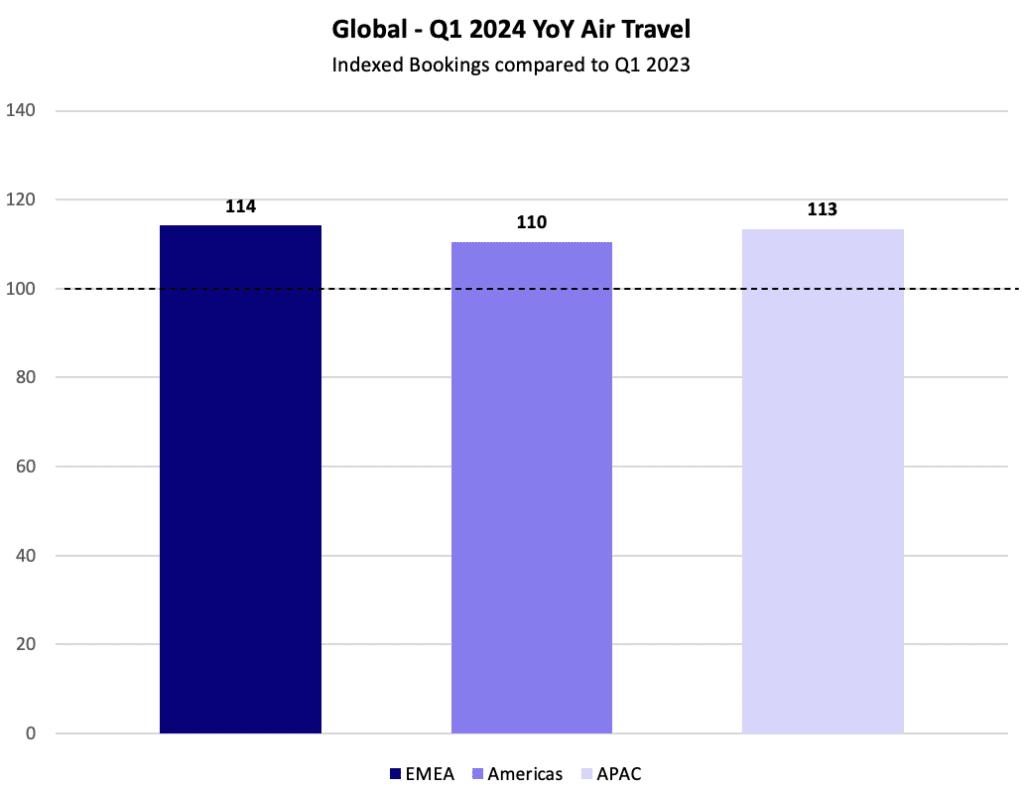
Anticipate a surge in personal getaways this spring and early summer. According to Criteo’s survey, more people around the world plan to travel for leisure or visit friends/family in the next 1-3 months.
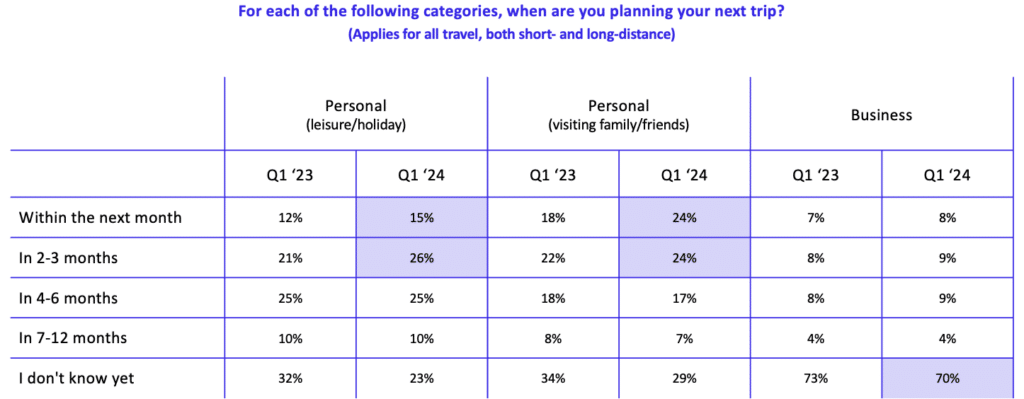
2. AI and booking sites offer algorithmic adventures.
In the past 6 months, more travelers are finding AI tools useful for recommendations—especially for dining experiences, accommodations, and activities. This shift is the strongest among travelers in South Korea, with a 6-point growth when comparing Q3 2023 and Q1 2024.
The adoption of AI tools by travelers is also gaining momentum in Europe. More travelers in Germany (+4 points), France (+4 points), and the UK (+3 points) said they found AI tools useful over the same period.
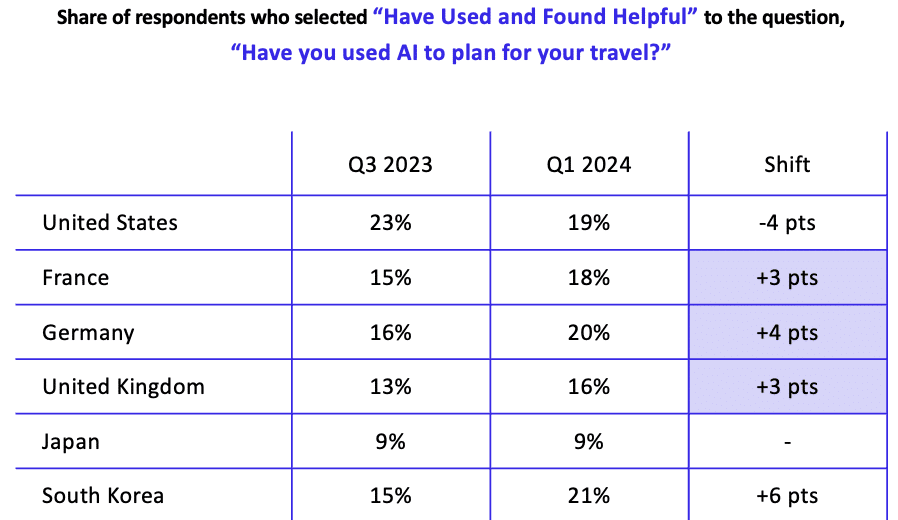
Throughout the online booking journey, travelers are also open to suggestions from travel providers. Half of travelers around the world (48%) get inspiration from travel booking sites.
3. People value personal travel advice.
While assistance from AI and travel booking websites influence the planning journey, travelers still prefer word-of-mouth suggestions. A full 61% of travelers globally said that recommendations from family and friends is a strong decision-making factor. Over one-third of people globally also find inspiration from personal travel content sites like blogs.
Positive reviews are another highly influential factor and are gaining traction. When choosing a travel provider, two-thirds of travelers globally consider positive reviews. This was up 8 points in Q1 2024 compared to in Q3 2023.
4. Travelers are finding ways to adapt to rising costs.
In Q1 2024, 25% of travelers around the world said they spent more on travel within the last six months compared to the same period a year prior.
Rising costs were felt most by travelers in France (+13 points), Japan (+11 points), and South Korea (+8 points).
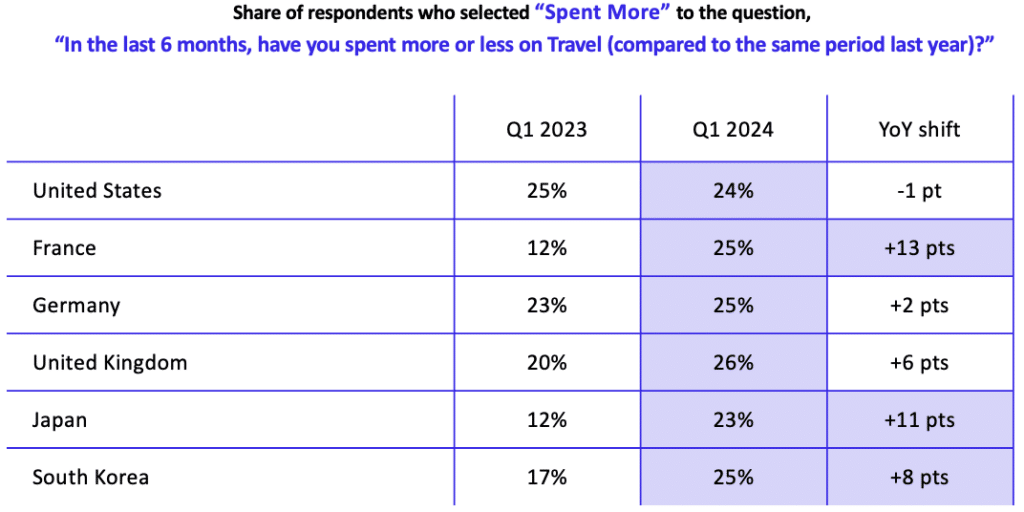
To secure better travel deals, 38% of people globally said they have or would consider changing the timing of their trips. This trend is even more pronounced among travelers in Japan, where 52% are open to adopting this strategy.
One in four travelers worldwide also plan to save money by engaging in fewer activities and opting for more affordable dining experiences. A third of US travelers will also leverage rewards from loyalty programs.
While many travelers aim to cut costs, a growing portion are embracing higher expenditures . A striking 75% of those who spent more on travel in the last six months also splurged on non-essential costs like luxury goods, dining out, health and beauty products, and apparel and accessories.
5. Booking everything from one source offers convenience.
Half of travelers compare multiple (3+) travel providers in search of the best deals.
However, many people prefer to book all travel services from a single source for added convenience and ease of coordination. Three in five travelers globally booked all aspects of their most recent trip—such as flights, hotels, rental cars, and activities—through a single platform, website, app, or provider.
6. Mobile helps travelers embrace their spontaneity.
Travelers enjoy having the freedom to make spur of the moment decisions. Nearly 1in 5 opt to leave some bookings for mid-trip. US travelers lead in flexibility, with 77% stating they booked most aspects of their trip right before departure.
Booking while on-the-go is also popular. In the Americas and EMEA, the share of air travel bookings completed on mobile devices increased by 8 points in March 2023 compared to March 2024. Similarly, there was a 6-point increase in APAC.
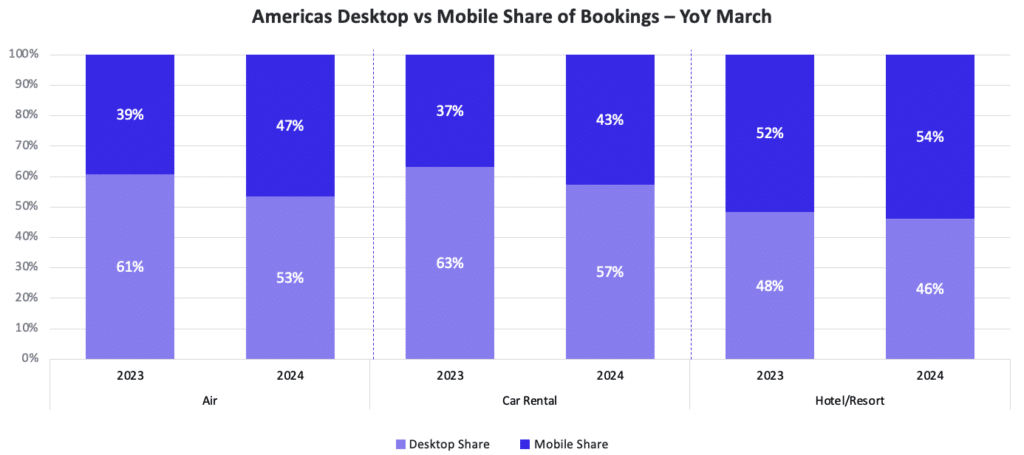
Source: Organic Criteo Data. Americas Travel Partners. Comparing March Bookings in 2023 vs 2024. Desktop and Mobile included, App and Tablet included in Mobile, sample permitting.
Embark on your advertising odyssey
Capturing the attention of travelers demands a highly personalized approach. By crafting ads that directly address their needs and interests—like discounts, loyalty rewards, destination ideas, and activity recommendations—advertisers can boost engagement and bookings.
Given that travelers explore multiple options before making a purchase, a retargeting strategy also helps keeps users engaged until they decide where to go and what they want to experience on their next trip. Meanwhile, retention campaigns can encourage stronger lifetime value as existing travel customers tend to have higher spend compared to first-time buyers.
For more global travel trends, read our full report, Travel Insights: Unpacking the Landscape of the Escape Industry and register for immediate access to our on-demand webinar.
Discover why 19,000+ global clients trust Criteo as their preferred advertising partner.

Elizabeth Kim is a Global Content Strategist captivated by technology, culture, and consumer behavior. Before joining the world of adtech, Elizabeth crafted brand and content strategies at agencies for clients spanning startups to household name giants. Outside of work, Elizabeth finds creative ...
Recommended reading:

How Will Retailers and Brands Utilize Omnichannel?
Retail media, the smart marketer’s guide to customer loyalty, criteo trend tracker.
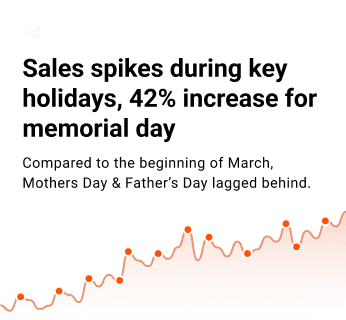
Data & Insights to Know and Share
Latest Resources
The roas trap: 11 data-backed ways to measure retail media success beyond roas, ultimate guide to audience targeting for advertising, the great defrag, subscribe to our newsletter.
Fresh sales trends and consumer insights to help you plan and win.
Related content
Stay in the know on all things digital marketing

Criteo expands its TAG certifications, ensuring safer digital advertising

10 commerce media truths: The principles behind digital advertising’s hottest opportunity

The state of retail media today: How does your maturity level compare?

Alternative IDs: The future of cookieless advertising?

2024 will be a year of change. Here’s how publishers are gearing up for it.

The Bottom Line of Privacy Sandbox Testing: What You Need to Know
Top Travel Industry Trends (2024-2027)

You may also like:
- Key Transportation Industry Trends
- Startups Revitalizing Travel
- Important Restaurant Industry Trends
The travel and tourism industry is growing at an annual rate of 4.41% .
By 2026, the projected market value will be just under $1 billion.
Here are seven trends driving the future of the travel space.
1. Travelers go it alone
One website reports that 25% of all American millennials plan to travel by themselves each year.
Statistics show that the number of people traveling solo increased by 42% even before the pandemic.
According to Travel Market Report , Intrepid Travel is a small-group travel company that plans trips for 75,000 people per year.
Data shows that more than 50% of the travelers booking with them are going alone.
Overseas Adventure Travel, another small-group travel company, has seen such a boom in solo travel that they’ve upped the number of single spaces they have available in 2021, a 76% increase over 2019.
Solo travelers are big on social media too.
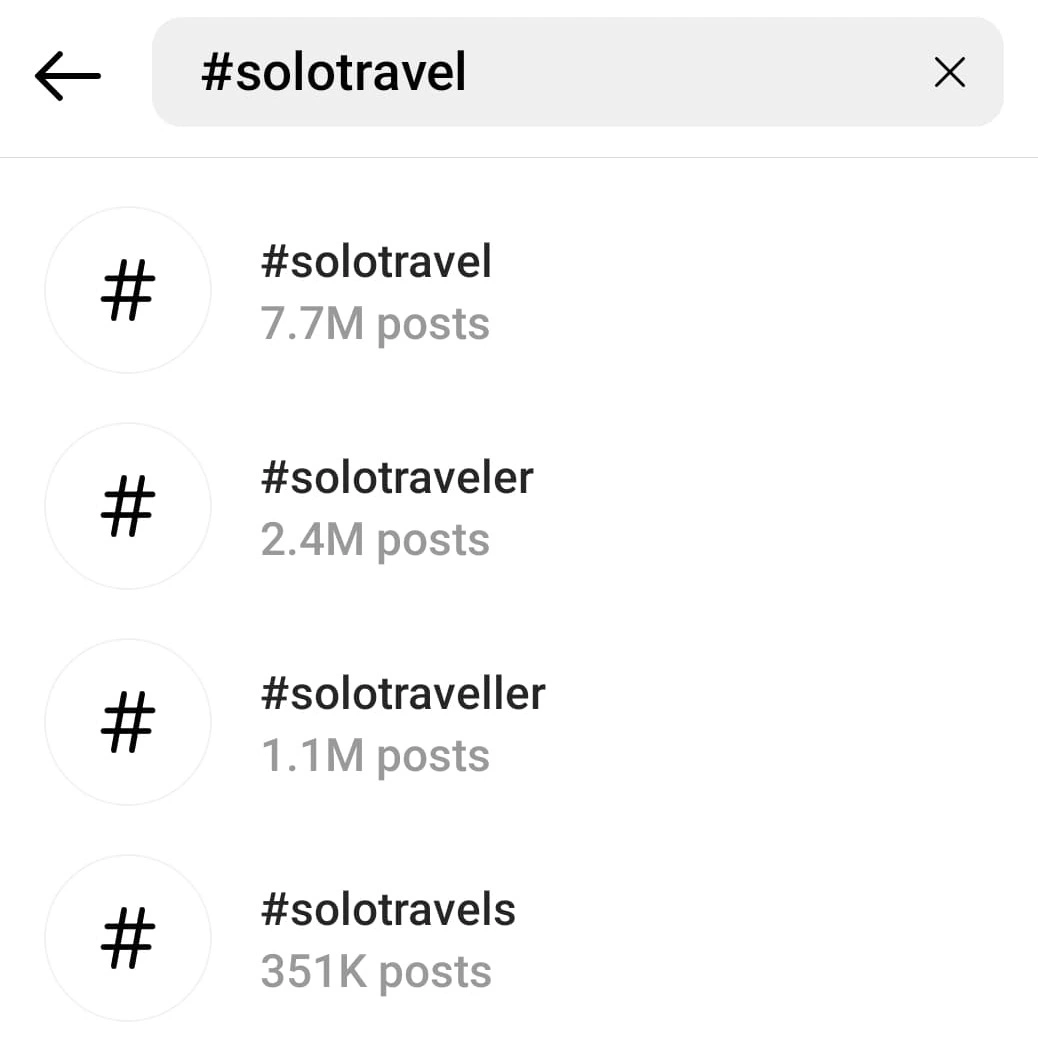
2. Travelers crave local experiences
The "experience economy" is huge in the travel industry.
But fewer and fewer people may be settling for commonplace vacation activities in the coming years.
Instead, “consumers [will] pursue authentic experiences , distancing themselves from mainstream tourism providers and venturing into pastimes that feel more meaningful”.
Data insights company AirSage marks this as an emerging trend because “people no longer want boring and conventional travel experiences as much as they used to. Instead, they would rather pay for vacations that are once-in-a-lifetime opportunities”.
Airbnb is betting on this trend.
Their website has offered the opportunity for consumers to book “experiences” since 2016.
But they also added online experiences in 2020 for people who are seeking to connect with locals without leaving their homes.
Other companies are banking their entire business model on this trend.
Withlocals offers “personalized traveling” — the opportunity for travelers to book private tours and activities with locals around the world.

Camping (and glamping) trips have also become a popular way for people to travel while experiencing the local culture and staying safe amidst the pandemic.
Outdoorsy has been called the “Airbnb of RV rentals”.
And their sales exploded to $1 billion in 2020. That’s 400% growth since 2019.
Under Canvas runs seven glamping camps in wilderness locations across the United States aimed at exploring the local landscape and inspiring human connections.
The company reported a “surge" in demand in 2020 and had "strong" advanced bookings during 2021.

3. Travel tech adoption accelerates
As with nearly all businesses, technology is presenting the travel industry with seemingly endless opportunities.
The pandemic has only increased the speed of tech adoption in the travel industry.
A McKinsey survey showed that, because of COVID-19, “companies have accelerated the digitization of their customer and supply-chain interactions and of their internal operations by three to four years".
One example: room service robots.
Two Chinese hotel giants invested in ExcelLand, a manufacturer that already had 3,000 robots in operation.

BTG Homeinnes is looking at these robots as a way to control costs and safeguard guests.
Hotels, airlines, booking sites, and others are using chatbots like never before.
Travelers can chat with providers during every stage of their journey.
And, they won’t (always) feel like they’re talking to a robot. Advances in AI have made this type of communication hassle-free.

United Airlines has launched an “ Agent on Demand ” service that allows travelers at the airport to video chat with a customer service representative simply by scanning a QR code.
More and more airlines and airports are deploying facial recognition technology.
Corporations and government entities tout this technology as a boon for travel safety.
But many privacy advocates have put a halt to this emerging trend. They warn that this type of surveillance could easily turn dystopian.
With all of this new tech, companies are also continuing to capitalize on an older piece of technology — the smartphone.
Stats show that travelers who book tours and activities on their phone spend 50% more than those who book elsewhere.
4. Consumers blend business and leisure travel
The latest statistics say there are nearly 5 million digital nomads in America.
The concept of being location-independent, traveling and working remotely, has become even more popular since the start of the pandemic.
The hospitality industry is starting to cater specifically to digital nomads.
Aruba is opening its beaches up to travelers who’d like to work remotely, calling the marketing campaign “ One Happy Workation ”.

Visitors can stay for up to 90 days. And do not need any governmental documentation.
Barbados and the Cayman Islands will also let you work remotely from paradise for an extended period of time.
Booking.com reports that the "workation" trend is going strong.
More than 50% of travelers say they would extend their business trip to enjoy personal time at their destination.

In 2020, hotels began catering to locals who needed a quiet place to work.
The Hamilton Hotel in Washington, DC, is just one example. It’s WFH-Work From Hamilton program offers rooms on a 6:00 am to 7:00 pm schedule.
5. The travel industry gets serious about sustainability
Recent data shows that more than half of US travelers believe there aren’t enough options when it comes to sustainable travel .

A poll conducted on behalf of Exodus Travels went even deeper into consumers’ attitudes .
- 91% of travelers see the importance of taking ethical trips
- 56% believe in buying souvenirs from local merchants
- 44% want to support local businesses at their destination
Sustainable travel involves minimizing impact on the local cultural environment.
And also taking an eco-friendly approach to the physical environment.
Nearly 70% of travelers say they are more likely to book accommodations if they know the property is planet-friendly.
Many in the travel industry have recently made commitments to preserving the environment.
For example, India-based ITC Hotels Group has LEED certified each of its hotels.
As of 2023, hotels in the state of California will no longer be allowed to provide single-use toiletries in plastic bottles to their guests.

Marriott International has made a pledge to remove these types of plastics from all their hotels, too. But the pandemic has put a temporary stop to that plan.
A recent report from Skift made this summary statement regarding sustainable travel in the future:
“[It’s a] less flashy way of viewing and traveling the world . . . with an emphasis on safety, sustainability, and profound experiences while getting from point A to B without wrecking the climate and local quality of life in the process”.
6. Electric Air Travel Goes Mainstream
Speaking of sustainability, it looks like flying Teslas are finally here.
And they have the potential to make a big impact on at least three large industries:
The aircraft manufacturing industry, with over $200 billion in annual revenue between the top 3 manufacturers alone (Boeing, Airbus and Lockheed).
Commercial airlines, with $838 billion in annual revenue (pre-COVID).
And the ride-hailing and taxi industry, which was valued at $219.68 billion in 2022.

Electric vehicles are cheaper to run , less expensive to maintain , and better for the environment than vehicles powered by conventional fossil fuels.
That’s just as true for aircraft as it is for cars.
When it comes to electric aircraft, there are two main types: fixed-wing airplanes and eVTOLs.
Fixed-wing electric airplanes are just what they sound like. There aren’t any 747-sized electric airliners yet, but smaller commuter planes are in production.
Eviation is leading the charge. This startup produces a 620-mile range, 9-seat commuter plane called the Alice.
According to the company, flying the Alice is dramatically cheaper than a regular internal-combustion powered airplane.
For a 100-mile flight, conventional fuel for a similar-sized Cessna would cost about $400. In Eviation’s electric Alice, it would only be about $10 .
Eviation recently merged with Clermont Aerospace after a $108.5 million valuation.

At the same time, AeroTEC and MagniX are teaming up to retro-fit existing airplanes with electric motors - with similar improvements to efficiency.
There are also electric-hybrid airplanes in development.
For example, the Project 804 by United Technologies.
As well as the Aero by Zunum, a startup backed by Boeing and JetBlue.
And the E-Fan X by Airbus and Rolls-Royce. This project was shut down in April 2021, but only after achieving its three main initial research goals (according to Airbus).
That covers fixed-wing electrics.
The other major kind of electric aircraft is the eVTOL.
eVTOL stands for “electric vertical take-off and landing”.
Non-electric VTOL examples include anything from helicopters to drones and Harrier Jump Jets.
eVTOLs tend to be smaller than their non-electric cousins, and designed for shorter flights across cities.
Some look like passenger-carrying quadcopter drones. While others have a fixed-wing component like regular airplanes.
Search interest in eVTOLs has been exploding lately as startups and major aircraft manufacturers demonstrate new eVTOL models.

In July 2020, Airbus conducted the first public flight of its autonomous 4-seat CityAirbus multicopter eVTOL. The CityAirbus has a projected range of about 60 miles (or 15 minutes).

Airbus also has Vahana , in development by its Silicon Valley innovation arm, Acubed .
For its part, Boeing’s Aurora Flight Sciences has been developing solutions for an air-taxi service in partnership with Uber. Including an autonomous electric passenger air vehicle.
Separately, Boeing is also reportedly partnering with Porsche to develop another eVTOL.
And Tokyo-based “flying car” manufacturer SkyDrive raised a series B of 3.9 billion yen (about $37 million) and conducted its first public manned demonstration of the SkyDrive SD-03.
The SD-03 is the world’s smallest eVTOL, requiring only as much space on the ground as 2 parked cars.
That small footprint is one of the main advantages eVTOLs have over traditional fossil-fuel powered VTOLs like helicopters.
eVTOLs like the ones mentioned above use multiple smaller electric motors with rotors spread out across the aircraft. Whereas a typical helicopter uses one main internal-combustion engine with two huge rotors stacked above. (Plus a smaller one in the tail.)
eVTOLs’ multi-motor design is called a “distributed electric propulsion” (DEP) system.
DEP systems have numerous advantages. They make piloting easier, reduce the footprint required for take-off and landing, and increase safety through redundancy (if one motor fails, there may be 7 more still running).
They also reduce noise emissions, as the rotors don’t have to spin as fast.
Noise and vibrations within the cabin are lower as well.
Thanks to these advantages, dozens of eVTOL manufacturers are currently vying to capture a share of the nascent “urban air mobility” market: eVTOLs used to fly over traffic.
Germany, Holland, Belgium, France, Mexico, and Brazil have all been experimenting with urban air mobility initiatives.
But with all those benefits, why hasn’t electric air travel caught on before?
Two words: energy density.
In other words, the amount of stored energy in one pound of “fuel” — whether gas, diesel, kerosene or batteries.
Currently, conventional fossil fuels have more energy density than batteries. That’s why electric cars are generally heavier than their gas-powered counterparts. They have to be, in order to store enough power.
For aircraft, this added weight poses an obvious problem.
But it’s a problem we’re getting closer to solving.
Tesla CEO Elon Musk has said that an energy density of 400 Wh/kg (watt-hours per kilogram) is the crossover point for lithium-ion batteries to beat kerosene jet fuel. Once battery technology reaches that level, the sky’s the limit for electric aircraft.
Today, the energy density of industry-leading Tesla batteries is currently about 260 Wh/kg. (Up from 124 Wh/kg in 2007.)
So when might we get to 400 Wh/kg?
Very soon, according to Musk.
(Though he has also said that Tesla has no near-term plans to make electric aircraft.)
That’s it for the top seven trends driving the travel and tourism industry forward into 2024 and beyond.
Through these trends, we can see a dynamic relationship between the travel industry and consumers.
It’s a push-and-pull that’s sure to continue in 2025 and companies that can adapt quickly to the changing wants and needs of travelers are the best suited for future success.
Find Thousands of Trending Topics With Our Platform

- Share full article

Why Did the Hotel Chain Hire a Marine Biologist?
Megan Morikawa of the Iberostar Group is applying science — and scale — to eliminate food waste, save coral and collaborate across the travel industry to cut carbon.
Megan Morikawa went from getting her Ph.D. at Stanford to working for the Spanish hotel group as director of sustainability. Credit... Iberostar
Supported by

By Elisabeth Goodridge
- May 15, 2024
Carbon neutrality, zero waste and serving seafood solely from responsible suppliers: Many boutique eco-tourism destinations — particularly those catering to small numbers of luxury travelers — can reach or come close to sustainability goals such as these, but what about a decades-old resort company operating 97 properties across 14 countries?
As the global director of sustainability at Iberostar Group , Megan Morikawa is striving to prove that large travel operators can be better stewards of the planet. The Stanford-educated marine biologist is applying science to achieve these goals and more, such as helping the privately held hospitality company build coral research labs and use A.I.-powered trash cans to reduce kitchen waste.
In a nearly two-hour video conversation, Dr. Morikawa talked about her career pivot from academia to hospitality, the importance of collaboration across the travel industry and her new role for the Travel Foundation , a nonprofit providing destinations with sustainable-tourism research, strategy and training.
This conversation has been edited and condensed for clarity.
What led you to research coral reef die-offs for your doctorate?
Basically, the theme of my technical background is how we can use the technology of genetics and genomics to better conserve species on the planet.
My Ph.D. adviser, Stephen Palumbi, was focused on genetics, genomics and coral reefs. His whole proposition was: Could we find the world’s toughest corals, learn what makes them tough and use that to help predict winners and losers of climate change, so that managers could better understand how to restore reefs?
How did you end up in travel?
It was at the end of my Ph.D. when at Stanford I met Gloria Fluxá Thienemann, Iberostar’s vice chairman and chief sustainability officer. My adviser and I were scratching our heads asking, “What does a Spanish hotel owner have in terms of interest in our research?”
Our initial conversation showed that she was genuinely interested in the science. Gloria’s passion for the science of the oceans has facilitated so much of what we now do.
I moved from academia to Iberostar because really passionate people want to use the private sector to scale solutions for critical ecosystems, like coral reefs.
Iberostar now has three coral labs and seven underwater nurseries in three countries. How did that start?
The first year that I joined, we constructed our first coral lab at a property in the Dominican Republic. It would have taken us four or five years if we were doing this from an academic standpoint.
The coral lab is three things in one. It’s an outreach center, where guests and others can pop in and stumble upon seeing — for many of them — coral for the first time. But it’s also a genetic bank: Corals in the Caribbean are experiencing a lot of challenges, like widespread disease and bleaching events. Having a genetic bank is an important asset saving for genetic diversity. Our third objective is to recreate coral bleaching: The lab has a sophisticated system that recreates heating waves with small tanks so that we can stress individual corals, and predict winners and losers, just like I did for my Ph.D.
Iberostar has taken hotels off fossil fuels, partnered to create a waste-management system in Brazil and more. How is it making these changes?
The question is always around how you scale sustainability. Scaling is an interesting combination of being able to speak in a high-level strategy voice about say, business objectives, and then being able to translate that down to the actual actions that a hotel director needs to take.
Because it’s not just our executive leadership. From our operations to our procurement team to our head of human resources, we all recognize the risk climate change poses to our business. So the passion and enthusiasm to do something about it is there and was not what needed to be sparked.
Tell me about these trash cans.
We do a lot of work on our food waste — we serve around 45 million meals a year.
With our partnership with Winnow , an A.I. waste management company, we have placed devices in our kitchens that have an A.I.-assisted camera and scale that allows for chefs to spend the first month or so training the model on what the camera is seeing. Through time, the system automatically registers what is being wasted.
With that data, we can get feedback on those economic losses as well as carbon footprint losses. And finally, what is it that we are throwing away? And how can that help us to inform how we produce food the next day?
What are the top challenges to Iberostar’s sustainability goals?
Travel is made up of a bunch of different businesses in different sectors. And how that all joins together can be really difficult to understand — particularly in the role we all play in protecting natural resources. Because we are a beachfront resort company, when we see erosion and other impacts on those areas, it’s really clear and evident. But one of our excursion providers might not be thinking about it as much in their day-to-day.
As a scientist, I recognize that a lot of discovery of how to do things that have never been done before requires quick absorption of new materials and being able to speak multiple languages. And by that, I don’t mean linguistic languages; I mean speaking from a research standpoint to a government standpoint to a business standpoint. A lot of the barrier to collaboration was not being able to communicate effectively with each other.
Are any of these changes something a guest would see?
We somewhat boldly said we are demonstrating that a luxury hospitality experience does not require single-use plastics. What I like to say is that when you see a room that is free of single-use plastics, it’s kind of hard to unsee it. A lot of times it can be thought of — initially — as needing to remove items. But I think our operations team thought critically about ways to elegantly offer an experience that was a better product. So that’s probably the most tangible way that we can see that.
What is the purpose of the Travel Foundation?
The Travel Foundation is a U.K.-based NGO, providing research, strategy and support in their aim for tourism to provide the greatest benefits for every destination around the world, so local communities and environments can thrive. The role I’ve taken is chair of the board of trustees.
A recent research piece they published was looking at how to model pathways to reach net zero emissions, looking at aviation, transport and hotels. The Travel Foundation also supports destinations in producing management plans. For Lake Tahoe, in California, they’ve been doing great work to help the area think through its new boom in tourism and how residents can have a voice.
When it comes to changing human impact on the environment, what are steps that travelers could take?
One of the best things that tourists can do is to inject mindfulness into their decisions. I know it sounds really silly, but the more meaning that we draw from the choices that we make in our consumption, the more likely we’re able to maximize the value that comes from it and make them memorable experiences.
Follow New York Times Travel on Instagram and sign up for our weekly Travel Dispatch newsletter to get expert tips on traveling smarter and inspiration for your next vacation. Dreaming up a future getaway or just armchair traveling? Check out our 52 Places to Go in 2024 .
Elisabeth is the deputy editor for the Travel Desk at The New York Times. More about Elisabeth Goodridge
Open Up Your World
Considering a trip, or just some armchair traveling here are some ideas..
52 Places: Why do we travel? For food, culture, adventure, natural beauty? Our 2024 list has all those elements, and more .
Mumbai: Spend 36 hours in this fast-changing Indian city by exploring ancient caves, catching a concert in a former textile mill and feasting on mangoes.
Kyoto: The Japanese city’s dry gardens offer spots for quiet contemplation in an increasingly overtouristed destination.
Iceland: The country markets itself as a destination to see the northern lights. But they can be elusive, as one writer recently found .
Texas: Canoeing the Rio Grande near Big Bend National Park can be magical. But as the river dries, it’s getting harder to find where a boat will actually float .
Advertisement
Search When autocomplete results are available use up and down arrows to review and enter to select.
Choose the plan that meets your needs and spend more time enjoying your international experience not worrying about your insurance coverage.
- Customer Stories
- Resume Quote / Application
What type of coverage do you need?
- Vacation / Holiday
- Visitor / Immigrant
- Student / Scholar
- Employer / Business Traveler
- Expat / Global Citizen
- Mission / Social Good
- Marine Captain / Crew
- Flights / Airfare
- Cruises / Excursions
Travel Medical Insurance
Temporary coverage for accidents, sicknesses, & emergency evacuations when visiting or traveling outside of your home country.
Popular Plans
International health insurance.
Annually renewable international private medical insurance coverage for expats and global citizens living or working internationally.
Travel Insurance
Coverage designed to protect you from financial losses should your trip be delayed, interrupted, or cancelled.
Individual & Family Services
Non-insurance services for worldwide emergency evacuation, field rescue, medical transport, and 24/7/365 travel assistance.
Enterprise Services
Meet your duty of care obligations with confidence, knowing your travelers are safe, healthy, and connected wherever they may be in the world.
What type of organization do you represent?
- Corporations
- Insurance Companies
- Educational Institutions
- Mission Organizations
- Maritime Industries
- Government Agencies
- Non-Profit Organizations
Medical & Travel Assistance
Global workers' compensation case management, security assistance services, insurance administrative services, img shares 2024 summer travel trends and top destinations.
- IMG reviewed the travel itineraries of more than 23,000 of its members with upcoming travel plans between June 1 st and August 31 st of 2024 to determine emerging travel trends this summer.
INDIANAPOLIS (May 14, 2024) – IMG (International Medical Group), an award-winning global insurance benefits and assistance services company, has conducted a review of customer travel plans from the beginning of June to the end of August and predicts this summer’s top 5 international destinations for U.S. travelers will be:
- Dominican Republic
Many summer travelers are taking international vacations with their whole family in 2024. Between June 1 st and August 31 st of 2024, IMG data shows a 7% increase in the number of travel protection plans sold including at least one child compared to the same timeframe in 2023. Those planning to travel and vacation this summer will also be taking trips averaging 8 days in length .
“In the U.S., the summer months are an incredibly popular time for families to plan fun getaways together since school is out and the weather has turned warmer for the majority of the country,” said Grant Hayes, IMG Director of International Sales – Travel. “Tropical locations such as Mexico and Aruba are often going to be at the top of the list for travelers, but many European destinations, such as Italy, are also expected to be popular spots for travelers this summer.”
IMG data shows that travelers are continuing to increase the amount they are spending on their trips, with a 7% increase in the average insured trip cost among IMG travelers this summer compared to last summer. Increased spending means more travelers needing to protect their investment for highly anticipated summer trips.
“Whether people are traveling internationally or domestically for their summer trips, it is critical that they have the proper travel insurance plan in place to protect both their trip investment and their family in the event of the unexpected,” said Justin Poehler, IMG Chief Commercial Officer.
To learn more about IMG's award-winning travel and health safety solutions, please visit www.imglobal.com .
About IMG® ( International Medical Group®) IMG® (International Medical Group®), a SiriusPoint company, is an award-winning global insurance benefits and assistance services company that has served millions of members worldwide since its founding in 1990. The preeminent provider of travel and health safety solutions, IMG offers a wide range of insurance programs, including international private medical insurance, travel medical insurance, and travel insurance, as well as enterprise services, including insurance administrative services and 24/7 emergency medical, security, and travel assistance. IMG’s world-class services, combined with an extensive product portfolio, provide Global Peace of Mind® for travelers, students, missionaries, marine crews, and other individuals or groups traveling, working, or living away from home. For more information, please visit www.imglobal.com .
Media Contact: Carly Kessler, IMG Public Relations Specialist, [email protected]
Request Information
To request more information, please fill out the form below. after you submit the form, we will have an img representative contact you., contact information, company information, how can we help.
Thank you for your submission! A representative will be with you shortly.
Select your language, headquarters, send a message.
If you need to send personal information such as medical records, payment information, etc., please use our Secure Message Center .
Thank you for your message! We'll be in touch shortly.
- Search Please fill out this field.
- Manage Your Subscription
- Give a Gift Subscription
- Newsletters
- Sweepstakes
These Are the Most Popular Places to Travel in 2024, According to Mastercard
Americans are traveling overseas in record numbers this year.
Paul Brady is the news director at Travel + Leisure and the brand's expert on cruise travel. He has been covering the travel industry for more than 15 years for outlets including Condé Nast Traveler , Skift , and The Huffington Post .
:max_bytes(150000):strip_icc():format(webp)/Paul-Brady-3744fd514a6045708c9dfc18375122af.jpg)
master2/Getty Images
Americans are traveling overseas in record numbers this year, setting aside worries about inflation and “prioritizing meaningful experiences over material goods,” according to a new report from Mastercard. And people aren’t afraid to spend big for those experiences, according to the card issuer: “Nine out of the last 10 record-setting spending days in the global cruise and airline industry were in 2024.”
Mastercard compiled its report using anonymized spending data as well as third-party sources, which track things like visitor arrivals, length of stay, and even weather data.
“Today’s travelers are discerning, choosing destinations that offer both value and authenticity,” Michelle Meyer, chief economist and head of the Mastercard Economics Institute, which compiled the report, said.
“They are savvy enough to stretch their funds and extend their stays, immersing themselves fully in the experiences and wonders of each locale,” she added in a statement provided to Travel + Leisure .
Some of the destinations that are trending right now are those where once-in-a-lifetime events are happening, whether it’s a Taylor Swift concert, an international soccer tournament, or a solar eclipse. At the top of Mastercard’s list for this summer is Munich, which is playing host to the 2024 UEFA European Football Championship. (That’s one reason the city landed on T+L’s own list of the 50 best places to travel in 2024 .) Other global hotspots include Bali; Bangkok; and Nice, France — all three of which are surging in popularity thanks to remarkable beaches and pleasant weather.
Consumers are also looking for places that offer excellent value, whether through favorable currency exchange rates or the overall bang-for-your-buck of a compelling destination. Among the hottest trending spots on Mastercard’s list is Tokyo, where the yen is down significantly compared to the U.S. dollar, as well as fair-weather favorites including Aruba in the Caribbean and Cancun, Mexico, which are in the top 10.
When it comes to U.S. travelers specifically, other destinations rise to the top for this summer, including Athens; Barcelona; Punta Cana, Dominican Republic; and San Juan, Puerto Rico. The surge in bookings for the season contradicts some forecasts, which had predicted a rise in “ coolcations ,” or vacations to cold-weather spots, after record-breaking heat in recent years. According to the latest Mastercard data, high temps aren’t yet tamping down demand.
In fact, the latest information shows that travelers do indeed tend to spend more time in locations with warm weather: For example, in Italy, where the average temperature is 58 degrees, visitors tend to stay for 5.4 days on average. Meanwhile, in the Dominican Republic, where 76 degrees is the average, visitors often stay for more than a week or 7.4 days. (A couple of exceptions to that rule are ski destinations and places where it’s often hotter than 80 degrees.)
One other bright spot is the global cruise industry, which is, Mastercard says, “full steam ahead.” According to the issuer, spending on cruises is up 16 percent in 2024 compared to 2019, thanks in part to the value of a vacation at sea. “Given persistent price increases in the hotel industry, the price difference between cruises and hotels has widened, making trips by cruise a relatively more budget-friendly option in many cases,” according to Mastercard.
Indeed, the prices for travel are up significantly. In the U.S., the average airfare was up more than 20 percent in March 2024, compared to 2019; the average hotel room, for the same period, was up 15 percent. Still, the experts at Mastercard, say, consumers are excited to go on vacation. “Boundaries are made to be broken, and tourists have been doing just that by spending in the sector in record numbers around the world,” the company said in its latest trend report. “Whether it’s cruise ship bookings or top destinations offering great value and unforgettable experiences, the appetite for travel continues to grow.”
For more on the numbers, check out "Travel Trends 2024: Breaking Boundaries," the full report from the Mastercard Economics Institute, at mastercardservices.com .
Related Articles
Artificial intelligence in strategy
Can machines automate strategy development? The short answer is no. However, there are numerous aspects of strategists’ work where AI and advanced analytics tools can already bring enormous value. Yuval Atsmon is a senior partner who leads the new McKinsey Center for Strategy Innovation, which studies ways new technologies can augment the timeless principles of strategy. In this episode of the Inside the Strategy Room podcast, he explains how artificial intelligence is already transforming strategy and what’s on the horizon. This is an edited transcript of the discussion. For more conversations on the strategy issues that matter, follow the series on your preferred podcast platform .
Joanna Pachner: What does artificial intelligence mean in the context of strategy?
Yuval Atsmon: When people talk about artificial intelligence, they include everything to do with analytics, automation, and data analysis. Marvin Minsky, the pioneer of artificial intelligence research in the 1960s, talked about AI as a “suitcase word”—a term into which you can stuff whatever you want—and that still seems to be the case. We are comfortable with that because we think companies should use all the capabilities of more traditional analysis while increasing automation in strategy that can free up management or analyst time and, gradually, introducing tools that can augment human thinking.
Joanna Pachner: AI has been embraced by many business functions, but strategy seems to be largely immune to its charms. Why do you think that is?
Subscribe to the Inside the Strategy Room podcast
Yuval Atsmon: You’re right about the limited adoption. Only 7 percent of respondents to our survey about the use of AI say they use it in strategy or even financial planning, whereas in areas like marketing, supply chain, and service operations, it’s 25 or 30 percent. One reason adoption is lagging is that strategy is one of the most integrative conceptual practices. When executives think about strategy automation, many are looking too far ahead—at AI capabilities that would decide, in place of the business leader, what the right strategy is. They are missing opportunities to use AI in the building blocks of strategy that could significantly improve outcomes.
I like to use the analogy to virtual assistants. Many of us use Alexa or Siri but very few people use these tools to do more than dictate a text message or shut off the lights. We don’t feel comfortable with the technology’s ability to understand the context in more sophisticated applications. AI in strategy is similar: it’s hard for AI to know everything an executive knows, but it can help executives with certain tasks.
When executives think about strategy automation, many are looking too far ahead—at AI deciding the right strategy. They are missing opportunities to use AI in the building blocks of strategy.
Joanna Pachner: What kind of tasks can AI help strategists execute today?
Yuval Atsmon: We talk about six stages of AI development. The earliest is simple analytics, which we refer to as descriptive intelligence. Companies use dashboards for competitive analysis or to study performance in different parts of the business that are automatically updated. Some have interactive capabilities for refinement and testing.
The second level is diagnostic intelligence, which is the ability to look backward at the business and understand root causes and drivers of performance. The level after that is predictive intelligence: being able to anticipate certain scenarios or options and the value of things in the future based on momentum from the past as well as signals picked in the market. Both diagnostics and prediction are areas that AI can greatly improve today. The tools can augment executives’ analysis and become areas where you develop capabilities. For example, on diagnostic intelligence, you can organize your portfolio into segments to understand granularly where performance is coming from and do it in a much more continuous way than analysts could. You can try 20 different ways in an hour versus deploying one hundred analysts to tackle the problem.
Predictive AI is both more difficult and more risky. Executives shouldn’t fully rely on predictive AI, but it provides another systematic viewpoint in the room. Because strategic decisions have significant consequences, a key consideration is to use AI transparently in the sense of understanding why it is making a certain prediction and what extrapolations it is making from which information. You can then assess if you trust the prediction or not. You can even use AI to track the evolution of the assumptions for that prediction.
Those are the levels available today. The next three levels will take time to develop. There are some early examples of AI advising actions for executives’ consideration that would be value-creating based on the analysis. From there, you go to delegating certain decision authority to AI, with constraints and supervision. Eventually, there is the point where fully autonomous AI analyzes and decides with no human interaction.
Because strategic decisions have significant consequences, you need to understand why AI is making a certain prediction and what extrapolations it’s making from which information.
Joanna Pachner: What kind of businesses or industries could gain the greatest benefits from embracing AI at its current level of sophistication?
Yuval Atsmon: Every business probably has some opportunity to use AI more than it does today. The first thing to look at is the availability of data. Do you have performance data that can be organized in a systematic way? Companies that have deep data on their portfolios down to business line, SKU, inventory, and raw ingredients have the biggest opportunities to use machines to gain granular insights that humans could not.
Companies whose strategies rely on a few big decisions with limited data would get less from AI. Likewise, those facing a lot of volatility and vulnerability to external events would benefit less than companies with controlled and systematic portfolios, although they could deploy AI to better predict those external events and identify what they can and cannot control.
Third, the velocity of decisions matters. Most companies develop strategies every three to five years, which then become annual budgets. If you think about strategy in that way, the role of AI is relatively limited other than potentially accelerating analyses that are inputs into the strategy. However, some companies regularly revisit big decisions they made based on assumptions about the world that may have since changed, affecting the projected ROI of initiatives. Such shifts would affect how you deploy talent and executive time, how you spend money and focus sales efforts, and AI can be valuable in guiding that. The value of AI is even bigger when you can make decisions close to the time of deploying resources, because AI can signal that your previous assumptions have changed from when you made your plan.
Joanna Pachner: Can you provide any examples of companies employing AI to address specific strategic challenges?
Yuval Atsmon: Some of the most innovative users of AI, not coincidentally, are AI- and digital-native companies. Some of these companies have seen massive benefits from AI and have increased its usage in other areas of the business. One mobility player adjusts its financial planning based on pricing patterns it observes in the market. Its business has relatively high flexibility to demand but less so to supply, so the company uses AI to continuously signal back when pricing dynamics are trending in a way that would affect profitability or where demand is rising. This allows the company to quickly react to create more capacity because its profitability is highly sensitive to keeping demand and supply in equilibrium.
Joanna Pachner: Given how quickly things change today, doesn’t AI seem to be more a tactical than a strategic tool, providing time-sensitive input on isolated elements of strategy?
Yuval Atsmon: It’s interesting that you make the distinction between strategic and tactical. Of course, every decision can be broken down into smaller ones, and where AI can be affordably used in strategy today is for building blocks of the strategy. It might feel tactical, but it can make a massive difference. One of the world’s leading investment firms, for example, has started to use AI to scan for certain patterns rather than scanning individual companies directly. AI looks for consumer mobile usage that suggests a company’s technology is catching on quickly, giving the firm an opportunity to invest in that company before others do. That created a significant strategic edge for them, even though the tool itself may be relatively tactical.
Joanna Pachner: McKinsey has written a lot about cognitive biases and social dynamics that can skew decision making. Can AI help with these challenges?
Yuval Atsmon: When we talk to executives about using AI in strategy development, the first reaction we get is, “Those are really big decisions; what if AI gets them wrong?” The first answer is that humans also get them wrong—a lot. [Amos] Tversky, [Daniel] Kahneman, and others have proven that some of those errors are systemic, observable, and predictable. The first thing AI can do is spot situations likely to give rise to biases. For example, imagine that AI is listening in on a strategy session where the CEO proposes something and everyone says “Aye” without debate and discussion. AI could inform the room, “We might have a sunflower bias here,” which could trigger more conversation and remind the CEO that it’s in their own interest to encourage some devil’s advocacy.
We also often see confirmation bias, where people focus their analysis on proving the wisdom of what they already want to do, as opposed to looking for a fact-based reality. Just having AI perform a default analysis that doesn’t aim to satisfy the boss is useful, and the team can then try to understand why that is different than the management hypothesis, triggering a much richer debate.
In terms of social dynamics, agency problems can create conflicts of interest. Every business unit [BU] leader thinks that their BU should get the most resources and will deliver the most value, or at least they feel they should advocate for their business. AI provides a neutral way based on systematic data to manage those debates. It’s also useful for executives with decision authority, since we all know that short-term pressures and the need to make the quarterly and annual numbers lead people to make different decisions on the 31st of December than they do on January 1st or October 1st. Like the story of Ulysses and the sirens, you can use AI to remind you that you wanted something different three months earlier. The CEO still decides; AI can just provide that extra nudge.
Joanna Pachner: It’s like you have Spock next to you, who is dispassionate and purely analytical.
Yuval Atsmon: That is not a bad analogy—for Star Trek fans anyway.
Joanna Pachner: Do you have a favorite application of AI in strategy?
Yuval Atsmon: I have worked a lot on resource allocation, and one of the challenges, which we call the hockey stick phenomenon, is that executives are always overly optimistic about what will happen. They know that resource allocation will inevitably be defined by what you believe about the future, not necessarily by past performance. AI can provide an objective prediction of performance starting from a default momentum case: based on everything that happened in the past and some indicators about the future, what is the forecast of performance if we do nothing? This is before we say, “But I will hire these people and develop this new product and improve my marketing”— things that every executive thinks will help them overdeliver relative to the past. The neutral momentum case, which AI can calculate in a cold, Spock-like manner, can change the dynamics of the resource allocation discussion. It’s a form of predictive intelligence accessible today and while it’s not meant to be definitive, it provides a basis for better decisions.
Joanna Pachner: Do you see access to technology talent as one of the obstacles to the adoption of AI in strategy, especially at large companies?
Yuval Atsmon: I would make a distinction. If you mean machine-learning and data science talent or software engineers who build the digital tools, they are definitely not easy to get. However, companies can increasingly use platforms that provide access to AI tools and require less from individual companies. Also, this domain of strategy is exciting—it’s cutting-edge, so it’s probably easier to get technology talent for that than it might be for manufacturing work.
The bigger challenge, ironically, is finding strategists or people with business expertise to contribute to the effort. You will not solve strategy problems with AI without the involvement of people who understand the customer experience and what you are trying to achieve. Those who know best, like senior executives, don’t have time to be product managers for the AI team. An even bigger constraint is that, in some cases, you are asking people to get involved in an initiative that may make their jobs less important. There could be plenty of opportunities for incorporating AI into existing jobs, but it’s something companies need to reflect on. The best approach may be to create a digital factory where a different team tests and builds AI applications, with oversight from senior stakeholders.
The big challenge is finding strategists to contribute to the AI effort. You are asking people to get involved in an initiative that may make their jobs less important.
Joanna Pachner: Do you think this worry about job security and the potential that AI will automate strategy is realistic?
Yuval Atsmon: The question of whether AI will replace human judgment and put humanity out of its job is a big one that I would leave for other experts.
The pertinent question is shorter-term automation. Because of its complexity, strategy would be one of the later domains to be affected by automation, but we are seeing it in many other domains. However, the trend for more than two hundred years has been that automation creates new jobs, although ones requiring different skills. That doesn’t take away the fear some people have of a machine exposing their mistakes or doing their job better than they do it.
Joanna Pachner: We recently published an article about strategic courage in an age of volatility that talked about three types of edge business leaders need to develop. One of them is an edge in insights. Do you think AI has a role to play in furnishing a proprietary insight edge?
Yuval Atsmon: One of the challenges most strategists face is the overwhelming complexity of the world we operate in—the number of unknowns, the information overload. At one level, it may seem that AI will provide another layer of complexity. In reality, it can be a sharp knife that cuts through some of the clutter. The question to ask is, Can AI simplify my life by giving me sharper, more timely insights more easily?
Joanna Pachner: You have been working in strategy for a long time. What sparked your interest in exploring this intersection of strategy and new technology?
Yuval Atsmon: I have always been intrigued by things at the boundaries of what seems possible. Science fiction writer Arthur C. Clarke’s second law is that to discover the limits of the possible, you have to venture a little past them into the impossible, and I find that particularly alluring in this arena.
AI in strategy is in very nascent stages but could be very consequential for companies and for the profession. For a top executive, strategic decisions are the biggest way to influence the business, other than maybe building the top team, and it is amazing how little technology is leveraged in that process today. It’s conceivable that competitive advantage will increasingly rest in having executives who know how to apply AI well. In some domains, like investment, that is already happening, and the difference in returns can be staggering. I find helping companies be part of that evolution very exciting.
Explore a career with us
Related articles.

Strategic courage in an age of volatility

Bias Busters Collection
Latest News

BestPrice travel to promote the image of Vietnam at New York’s times square


How private MCAT tutors address specific weaknesses or areas of improvement for medical school applicants

Marriott International celebrates the 2024 J. Willard Marriott Awards of Excellence honorees

Landal GreenParks UK sees big growth in inbound holiday market

Next generation leaders earn their seat at the table at IMEX Frankfurt

RDB Hospitality expands luxury services with addition of Lenox VIP Global

Ronald Leitch appointed Chief Operating Officer of AGS Airports

NH Collection’s debut in Finland continues a proud legacy of legendary hospitality

Deepak Chopra aboard SH Diana in New York as Swan Hellenic announces two new “Explore & Restore” cruises in Brazil

VisitEngland joins forces with AccessAble to promote new tourism accessibility guides

Europeans defy costs and conflicts to embrace travel in Summer 2024

75% of Europeans plan to travel between May and October 2024, with interest in leisure travel rising 5% compared to last year. Older age groups are especially eager to travel, while younger travellers are more likely to book in advance.
BRUSSELS – According to the European Travel Commission ’s (ETC) latest report, “ Monitoring Sentiment for Intra-European Travel ” Wave 18 1 , intention to travel between May and October 2024 among surveyed Europeans has reached 75%. This marks a significant 3% increase compared to the same period last year.
37% of respondents intend to embark on a single trip, and 57% are gearing up for two or more getaways during this period. Destinations in Southern Europe are preferred by 43% of travellers, with Italy and Spain topping the list.
With European air traffic now within touching distance of pre-pandemic levels, intention to fly to vacation spots has reached 55%, an increase of 5% compared to the same period last year. Meanwhile, 28% of travellers plan to drive to their destinations, and 13% are opting for more eco-friendly travel by train or bus.
Commenting on the findings, Miguel Sanz , President of ETC, said: “It is very positive to see Europeans maintaining their desire to travel despite the ongoing geopolitical and economic circumstances. Popular destinations will continue their strong performance this summer season, but there are also great opportunities for lesser known and quieter destinations as many travellers look for peaceful, authentic experiences.”
Europeans determined to travel this spring and summer
Despite security concerns and financial constraints, Europeans are displaying remarkable resilience when it comes to travelling this summer season. Enthusiasm for travel is cutting across all age demographics above 25, reaching up to 81% among more mature travellers (aged over 55).
This determination, coupled with a desire to secure a holiday at a more favourable price, leads to early bookings. Some 52% of European travellers (including 56% of those aged 18-24) have already fully or partially booked their upcoming trips.
The most popular trip length is four to six nights, favoured by 36% of respondents. This is followed by seven to nine nights (26%) and more than ten nights (21%). Travel budgets have stayed consistent compared to a year ago, with 42% of respondents planning to spend up to 1,000 euros per person on their next trip, covering both accommodation and transportation costs.
Perceptions of safety crucial when choosing a destination
Amidst geopolitical tensions, extreme climate events and economic uncertainties, prioritising safety has become paramount in shaping travellers’ decisions. Feeling safe is the number one criterion when selecting a destination (16%), followed by pleasant weather (13%), bargains and attractive deals (11%), friendly local communities (9%), and lower cost of living at the destination (8%).
Despite the strong desire to travel, 22% of Europeans are worried about escalating travel expenses, and 17% are concerned about personal finances amid the current economic climate. Additionally, geopolitical tensions, such as the conflict in Ukraine and unrest in the Middle East, are adding to anxieties, with 12% and 10% respectively expressing unease. Disruptions in transport options (10%), overcrowding (9%), and extreme weather events (8%) are other important sources of concern.
Scenic beauty and local cuisine top holiday preferences
A significant proportion of European travellers are gearing up for intra-regional trips during May-June (34%) and July-August (44%). Additionally, 17% are planning on travelling in September and October. Leisure travel is on the rise, with 74% expressing a desire to indulge – a 5% jump on last year.
Italy and Spain top the list of summer destinations this year, each capturing 8% of respondents’ interest, closely trailed by France (7%), Greece (6%) and Germany (5%).
This line-up reflects Europeans’ desire for Sun & Beach trips (20%) and City Breaks (16%), which emerged as the most popular types of holiday for the following months. European travellers cite enjoying scenic beauty (19%) as their most preferred holiday experience, followed by trying local cuisine (17%), engaging with local cultures (15%), and admiring famous landmarks (15%).
1 Wave 18 features data collected in April 2024. The survey was conducted in: Germany, the United Kingdom, France, the Netherlands, Italy, Belgium, Switzerland, Spain, Poland, and Austria.

Vicky Karantzavelou
Vicky is the co-founder of TravelDailyNews Media Network where she is the Editor-in Chief . She is also responsible for the daily operation and the financial policy. She holds a Bachelor's degree in Tourism Business Administration from the Technical University of Athens and a Master in Business Administration (MBA) from the University of Wales.
She has many years of both academic and industrial experience within the travel industry. She has written/edited numerous articles in various tourism magazines.
- Vicky Karantzavelou https://www.traveldailynews.com/author/vicky-karantzavelou/ Marriott International celebrates the 2024 J. Willard Marriott Awards of Excellence honorees
- Vicky Karantzavelou https://www.traveldailynews.com/author/vicky-karantzavelou/ Next generation leaders earn their seat at the table at IMEX Frankfurt
- Vicky Karantzavelou https://www.traveldailynews.com/author/vicky-karantzavelou/ NH Collection’s debut in Finland continues a proud legacy of legendary hospitality
- Vicky Karantzavelou https://www.traveldailynews.com/author/vicky-karantzavelou/ VisitEngland joins forces with AccessAble to promote new tourism accessibility guides
Related posts

Robust recovery in European tourism: 2024 ushers in increased arrivals and spending

ACI Europe and ETC celebrate entry of Bulgaria and Romania into Schengen area starting with air and sea borders
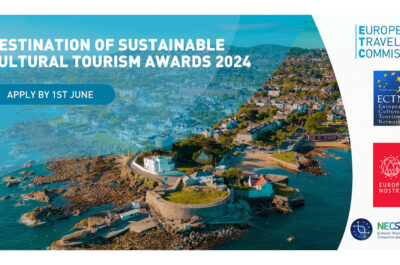
Applications now open for the destination of Sustainable Cultural Tourism Awards 2024

ETC and University of Surrey launch children’s book series to promote career in tourism
Previous post, sas expands connectivity to scandibavian winter destinations, mcdreams becomes europe’s first hotel group to roll out 100% ai-powered phone system integrated with like magic.

eSIM Go launches global travel eSIM service in partnership with SWISS

Impress your Airbnb guest on their next vacation

airBaltic and Bulgaria Air start codeshare cooperation

Sofitel Al Hamra Beach Resort opens its doors on the shores of Ras Al Khaimah

Prague Airport and Korean Air celebrate two decades of Seoul connection

Understanding Nevada’s modified comparative negligence law

Exhibitions & Conferences Alliance welcomes ICCA as its newest Alliance partner

BEONx and JUYO Analytics partner to streamline data access for hoteliers

Good Travel Management announces strategic partnership with Trinity Event Solutions

Finnair resumes flights to Tartu

Afreximbank funds $30m. for Silversands Hotel expansion in Grenada

AMG survey reveals consensus on importance of training but not on how to develop new advisor talent

“Tauck On Tour” events coming to UK travel advisors this Fall

Global Travel Marketplace expands and rebrands as Connecting Travel Marketplace

Sporting events elevated Madrid hotel performance in April

easyJet to open 10th UK base at London Southend Airport next spring signalling continued UK growth

Middle East hotel construction pipeline rises to 612 projects/144,222 rooms at Q1 2024

The Vinoy Resort and Golf Club hires Chris Major as Golf and Club Operations GM

IEG: The Board of Directors approves the consolidated interim report as of March 31, 2024 – Revenues at 88.9m. euros

U.S. Travel applauds passage of Long-term FAA Renewal Bill

Travel and tourism sector deal activity down by 13.5% YoY in January-April 2024, finds GlobalData

THE WELL appoints Zeev Sharon as Chief Development Officer to lead integrated wellness brand’s global expansion

Icelandair transported more than one million passengers this year

Qatar hotel market sees significant performance boost during Eid al-Fitr

New research highlights toll of business travel on mental health and a need for more support from employers

Avianca will only transport passengers aged 14 or younger who travel with their parents or a responsible adult

CEIR releases Q1 2024 index results, growth of U.S. B2B exhibition industry continues

Luxury digital concierge company The Prelude to hit $20m in first year sales

Celebrity Cruises’ revolutionary ship Celebrity Apex homeports in Southampton for first-ever season from the UK

Oklahoma Tourism and Recreation Department launches new “Find Yourself in Oklahoma” campaign

Transportation methods from Alicante airport to Benidorm

Oceania Cruises launches innovative and free marketing solution for trade partners

TAAG assumes exclusive operation od the Luanda – Lisbon route with its international fleet

Hotel rewards programs are going greener, extending across brands, new report finds

Pegasus launches direct route from Istanbul to Bratislava

MIA starts 2024 with record growth and an A+ bond rating

Time Out Market to open in Budapest

JW Marriott and Flamingo Estate debut a global brand partnership to guide travelers on a sensorial journey rooted in well-being

Yuppi Group leverages Turkish destination specialism to launch B2B hotel platform Pax2Night

Reputable merchant advance companies for business owners

Best April in Katowice Airport’s history

Erna Solberg named Havila Pollux

Soaring passenger traffic, longer stays: Mastercard Economics Institute on travel in 2024

Consistency in differentiation: How GCC is building the future of their travel destinations

Carnival Corporation rolls out SpaceX’s innovative Starlink across entire global fleet

Dream Yacht Sales welcomes Jeremy Tutt as Global Yacht Sales Director

Tribute Portfolio debuts in the United Arab Emirates with The First Collection at Jumeirah Village Circle, a Tribute Portfolio Hotel

Wellness real estate market reached $438bn. in 2023 and is forecast to more than double to $913bn. by 2028

Sojern expands its guest experience solutions to Europe

Waymore’s Guest House & Casual Club announces new General Manager

Forty-five percent of the hotel projects in Europe’s total pipeline are under construction at the end of Q1 2024

New Grill Room General Manager and Sommelier at The Windsor Court Team

Corazón Cabo Resort & Spa appoints new Director of Sales and Catering

Travel demand remains resilient in Q2 2024: TUI achieves record revenue of 3.6bn euros

First Club Med in the Middle East announced, $100 million development

Higher Lake Mead water levels bolster business for marina, boating operator

Elevate your travel experience with essential tech on a budget

Google rolls out enhanced AI-driven travel planning features

Game changers: Trends shaping college sports today

VisitScotland Connect 2024 hailed a success

Fraport Group continues growth in First Quarter of 2024

Travelport and WestJet confirm new long-term Content agreement

Sights of Belek you must visit

How to make the most of your trip to Napa Valley

South Western Railway hosted the rail industry’s first national safeguarding conference

Sabre Corporation reinforces partnership with ACI blueteam Spa with new contract

Trip.com Group and Rezdy join forces to offer new travel experiences around the world

The Ritz-Carlton, San Francisco appoints new General Manager

Berlin celebrates five years of Sustainable Meetings Berlin at IMEX

Over 200,000 additional seats from Shannon Airport this summer to destinations across Europe and the USA

Destination DC highlights impactful role in hosting global meetings at IMEX Frankfurt

WTTC and IC Bellagio partner for new consumer campaign

PCMA and The Strategic Alliance of the National Convention Bureaux of Europe announced Convene 4 Climate

Hotel Equities selected to manage first Hampton by Hilton-branded hotel in St. Thomas, U.S. Virgin Islands

Abra Group reaches agreement for strategic investment in Wamos Air

Chisinau International Airport will be the host of the International Aviation Conference

Mews acquires HS3 Hotelsoftware to bolster German expansion

Paradies Lagardère announces Q1 restaurant openings at Atlanta, Boston and Oklahoma City Airports

Generation Voyage monetizes content through affiliate sales powered by Stay22

Celestyal finalises agreement with Abu Dhabi and AD Ports Group

New dates for Essence of Africa, the continent’s premier buyer forum

LanzaJet announces Doreen Pryor as Chief Financial Officer

Neptune Luxury Resort announces culinary collaboration with acclaimed Italian chef Salvatore Andolina

Fontainebleau Miami Beach to unveil all-new coastal convention center in Q4 2024

Cvent announces Top Meeting Destinations and Top Meeting Hotels in Europe for 2024

Prague remains among world’s most sought-after meeting destinations

Over 260 applications from 60+ countries: Best Tourism Villages 2024 adventure kicks off

Seychelles and Mauritius Tourism met at the Arabian Travel Market (ATM) in Dubai

IRF and SITE, along with research partner Oxford Economics, launch 2024 edition of incentive travel survey

Explore Worldwide furthers expansion in North America with new team and Toronto office

Colletts Travel evolves with reservation module new technology from Dolphin Dynamics

Skyscanner launches Savvy Search – its new generative AI travel planning tool

BCD Meetings & Events launches three-year strategic plan following momentus growth

RiminiWellness 2024: Shaping the future of wellness and fitness industry

Traveloka becomes first Platinum Sponsor of GSTC to promote sustainable tourism

The Brunelleschi Hotel gets the prestigious Michelin Key

Minor Hotels appoints Lokesh Kumar as Vice President of Development for the Middle East

onefinestay unveils villas in Provence

Outdoorsy launches weather guarantees for RV rentals with “Roamly Weather by Sensible”

UK awards Alain St.Ange the “Nelson Mandela Leadership Award”

Resorts World Cruises to homeport in the Arabian Gulf

Dondra Ritzenthaler Takes the Helm as Chief Executive Officer of Azamara Cruises

Storrington Collective is appointed to handle the UK Public Relations for the entire Cotton Lifestyle Group

ATL Airport District appoints Rylee Govoreau as Sales Manager

Aeronology accepted into global luxury travel group Virtuoso

The world of travel and tourism: A journey through cultures and destinations

Grace La Margna St Moritz joins American Express Fine Hotels + Resorts

Digital Markets Act: European Commission designates Booking.com as gatekeeper

Al Ansari Exchange signs a strategic partnership with Etihad Airways

ASM Global Europe to open four new UK venues by 2027

Oman’s Travel & Tourism sector predicted to reach new heights in 2024, says WTTC report

Air Serbia launches contest for company mascot

Royal Caribbean’s Utopia of the Seas begins tests at sea

Traveazy Group unveils the future of B2B travel solutions at ATM 2024

Aena’s airports in Spain registered more than 25.6 million passengers in April

Qatar’s Travel & Tourism sector achieves record growth in 2024

Casablanca: A must-visit destination in 2024 according to TripAdvisor

Caribbean Week 2024 set to sparkle in New York City

BLS International secures visa outsourcing contract with Portuguese Embassy in Morocco

Caribbean tourism flourishes: Insights from CHTA at CHRIS 2024 Summit

OsaBus invested 1m. euros in new buses to expand services in Barcelona

Illinois Office of Tourism announces international visitor growth in 2023

Hyatt doubles down on Latin America growth with 30+ planned openings through 2027

The Emirates Group achieved record profits and revenue in 2023-24, driven by robust demand and strategic global expansion

Mondee Holdings announces record Q1 2024 financial results, highlighting AI-driven growth in the travel sector

The Vines Resort & Spa announce villa expansion

HyperPay showcased innovative hospitality service at Arabian Travel Market 2024

Ethiopian Airlines Group assumes management role for Ethiopia’s new Legacy Lodges through Ethiopian Skylight Hotel

ACI World welcomes new Vice Presidents to lead Events & Commercial Services, and Safety, Security, and Operations

Traveling with white snus: A guide to regulations and recommendations

Understanding wrongful deaths from a legal perspective: A guide

Portugal’s Travel & Tourism poised for historic year, says WTTC

TravelgateX returns to CON-X 2024 with a new concept, “Enough, redefined”: Pushing the boundaries in the travel industry and technology

Why the USA is the perfect host for the World Cup

Six tips for becoming a travel influencer on Instagram

Iberostar announces re-opening of 5* Iberostar Selection Creta Marine following 3 year renovation

Three smart tech must-haves for a bleisure trip

Bud & Marilyn’s takes home title of “2024 Merchant of the Year”

Introducing DEOS: A new vision of luxury by the Myconian Collection

Delta Air Lines operates its Prague – New York route again

Emirates return to Edinburgh Airport, Pegasus starts twice weekly flights to Istanbul

British Airways announces the launch of its new Customer Access Advisory Panel

Air India strengthens presence in Europe with additional flights to Amsterdam, Milan and Copenhagen

Ryanair extends Trinity College Dublin partnership to 2030

Redefining luxury in the Middle East: Insights from Arabian Travel Market 2024

Sheen Falls Lodge partners with Seabody for enhanced wellness experience

UN Tourism puts spotlight on investments and empowerment at AIM Congress

IAG reports strong First Quarter, forecasts positive outlook for 2024

Amsa Hospitality and Radisson Hotel Group extend partnership with the signing of Radisson Hotel Madinah set to open this year

Alaska Airlines launches new way for guests to join the journey to help make air travel more sustainable

Copthorne Hotel Aberdeen unveils major renovations

Top-performing airlines set themselves apart with friendly staff, J.D. Power finds

Hilton announces Dale MacPhee as General Manager of Conrad Washington, DC

Bardessono Hotel & Spa in Napa Valley unveils $1.8m. guestroom renovations

Mews and YouLend partner to launch “Flexible Financing” for hospitality expansion

British Airways Holidays unveils 2024 travel trends influencing UK consumers

Daniel Alexander of Tanjung Kelayang Reserve in Indonesia and President of MTPA met Seychelles Consultant Alain St.Ange at ATM in Dubai

InterLnkd crowned winner of the ATM 2024 Start-up Pitch Battle, held in association with Intelak

airBaltic lunches direct flights from Riga to Skopje, Chisinau, and Pristina

El Cortez Hotel & Casino announces plans to enhance casino

JW Marriott Chicago unveils reimagined event space

Cloud5 appoints Frank Ziller as Chief Technology Officer

Vingcard enhances hotel security with MIFARE Ultralight AES compatibility

Authenticity and Innovation at the forefront of CityDNA’s “Reality Check!” Conference

Travel entrepreneur and startup funding is growing in the Middle East but more investment is needed, say industry experts at ATM 2024

IMAGES
COMMENTS
Based on the Travel Innovation Map, the Tree Map below illustrates the impact of the Top 9 Travel Industry Trends in 2024. Startups and scaleups are enabling contactless travel using technologies like biometrics, radio-frequency identification (RFID), and near-field communication (NFC). This is due to increasing health and hygiene concerns post ...
The latest technology trends in the travel and tourism industry for 2024. The hottest tips & travel tech trends, and innovate your business.
From home swapping to astrotourism, these are the trends shaping travel in 2024, according to our editors and contributors. By Condé Nast Traveller and Sarah Allard. December 30, 2023. Milagros ...
As we look ahead to 2024, the travel industry is at a pivotal crossroads, marked by rapid technological advances, changing consumer behavior and evolving market dynamics. Key points: Digital transformation: The integration of technology into the travel experience, particularly through advanced booking systems such as Regiondo, is fundamental.
Travel technology company Amadeus has released its fourth travel trends report. Using the latest data and industry-leading insight, travel in 2024 will be dominated by five trends: music tourism ...
The corporate travel landscape is poised for a transformative ride in 2024 - from moderating hotel and air prices to the role of technology and our responsibility to the world. Our Amex GBT Consulting team created 4 Key Questions for Corporate Travel in 2024 highlighting the top trends - pricing, technology, the future of work, and ...
AI-influenced revenue in the travel industry has risen from 9% in 2018 to 21% in 2021. In 2024, this number is expected to rise to 32%. In other words, within the next year, nearly one-third of your annual revenue could come from artificial intelligence. AI isn't the only tech trend that should be on your radar for 2024.
The pandemic, technological advancements, and changing global dynamics have reshaped the business travel landscape, paving the way for new trends and practices in 2024. 2024: A New Era in Corporate Travel - As we step into 2024, it's evident that business travel has transformed. From digital innovations to a heightened focus on ...
As travel resumes and builds momentum, it's becoming clear that tourism is resilient—there is an enduring desire to travel. Against all odds, international tourism rebounded in 2022: visitor numbers to Europe and the Middle East climbed to around 80 percent of 2019 levels, and the Americas recovered about 65 percent of prepandemic visitors 1 "Tourism set to return to pre-pandemic levels ...
Hilton's global trends report found over half (56%) of people in Britain plan to spend more on travel in 2024 than in 2023. Some are going further to immerse themselves into local traditions ...
Information in these trends is also useful to travel management companies and businesses in the hospitality and tourism industry. Hotel owners or rental car companies can use these travel trends to gain insights into their customer base. These trends also present an excellent opportunity to adopt new business practices.
Trend 4: Limited Hotel Services. In September, research from American Hotels & Lodging Association (AHLA) revealed that the U.S. hotel industry is likely to finish 2021 with 500,000 fewer jobs than in 2019, and that an additional 1.3 million jobs in restaurants, supply businesses and retail stores supported by hotels are also at risk.
The landscape of corporate travel in 2024 showcases a multifaceted dynamic, where the blend of leisure and work, the pursuit of sustainability and well-being, and generational impact are redefining the traditional concept of business travel. In this FCM Travel article, we unveil the key trends in corporate travel for 2024.
A higher class of travel . While the picture has remained pretty stable for domestic travel, when it comes to international trips, Travel Management Companies (TMCs) are noting a slightly higher share of premium fares. A shift in top corporate destinations . Top domestic corporate routes remain largely the same when comparing pre-pandemic with ...
This trend, which continues to grow, was likely influenced by the difficulty and confusion that accompanied travel planning during the pandemic and directly thereafter. Road Warriors, in particular, are 15 percent more likely to utilize a travel management company—whether that's an online tool or a human advisor—this year than in 2019.
Travel trends for the travel industry for 2024. Take advantage and start impressing your guests and outpace your competitors.
The specialist business travel consultancy has produced a broad, macroscopic view of the sector in The Macroscope Report, detailing key considerations for the future of travel management strategy, policy and service need.The report builds on its previous work on the Permissible Travel Framework and the Purposeful Travel Model with insights from travel managers and road warriors to offer a ...
Tourism Trends: 20 Opportunities for The Tourism Industry in 2024. Tourism trends of 2024: the most significant upcoming tourism trends. So, start impressing your guests and outpace your competitors.
These are the trends that will help advertisers adapt to this year's evolving landscape. 1. People are surfing the travel surge. Across all major regions, bookings for air travel soared by double digits year-over-year during the first quarter of 2024, signaling a robust boost in travel for the upcoming months.
A recent report on corporate travel trends flagged artificial intelligence personal assistants (AI PAs) as one of several trends to watch. In the past year, technology experts from travel as well as other industries have called AI everything from the most profound transition in our lifetimes to the most disruptive thing since fire.. And while the travel industry is only beginning to explore ...
The travel and tourism industry is growing at an annual rate of 4.41%. By 2026, the projected market value will be just under $1 billion. Here are seven trends driving the future of the travel space. 1. Travelers go it alone. One website reports that 25% of all American millennials plan to travel by themselves each year.
TravelPulse is a trusted news source for US and international travel and tourism news. Covering destinations, cruise lines, airlines, hotels and resorts with in-depth analysis. EDITION. U.S.A ... Expedia Group Announces New Innovations, Releases Over 40 New Products and Features. Noreen Kompanik May 14, 2024. Hotels and Resorts. Wyndham Hotels ...
Travel Trends 2024: Breaking Boundaries Subscribe to the Mastercard Economics Institute Be the first to know when the Mastercard Economics Institute releases new content - from global reports & webinars, to regional blogs and infographics.
The new report, Travel Technology Investment Trends 2024, published by Amadeus, finds hoteliers expect to increase their investment in technology by an average of 16 percent over the coming 12 months, with one in five planning to invest over 20 percent more than they did last year.
The Travel Foundation also supports destinations in producing management plans. For Lake Tahoe, in California, they've been doing great work to help the area think through its new boom in ...
IMG reviewed the travel itineraries of more than 23,000 of its members with upcoming travel plans between June 1 st and August 31 st of 2024 to determine emerging travel trends this summer.; INDIANAPOLIS (May 14, 2024) - IMG (International Medical Group), an award-winning global insurance benefits and assistance services company, has conducted a review of customer travel plans from the ...
Indeed, the prices for travel are up significantly. In the U.S., the average airfare was up more than 20 percent in March 2024, compared to 2019; the average hotel room, for the same period, was ...
We look at how new AI tools can help executives develop a business strategy that uses data insights to avoid biases and make crucial decisions more quickly. ... should use all the capabilities of more traditional analysis while increasing automation in strategy that can free up management or analyst time and, gradually, introducing tools that ...
Here are the overall trends for Google Ads and Microsoft Ads in 2024 you need to know: Click-through rate improved for most industries. 70% of industries saw an increase in CTR year over year, some significantly, with an overall average increase of 5% since 2023.
BRUSSELS - According to the European Travel Commission's (ETC) latest report, "Monitoring Sentiment for Intra-European Travel" Wave 18 1, intention to travel between May and October 2024 among surveyed Europeans has reached 75%.This marks a significant 3% increase compared to the same period last year. 37% of respondents intend to embark on a single trip, and 57% are gearing up for two ...